of
Vlahović







Loucas Fourlas MEP, Chair of the European Parliament Delega�on to Serbia

of
Vlahović







Loucas Fourlas MEP, Chair of the European Parliament Delega�on to Serbia
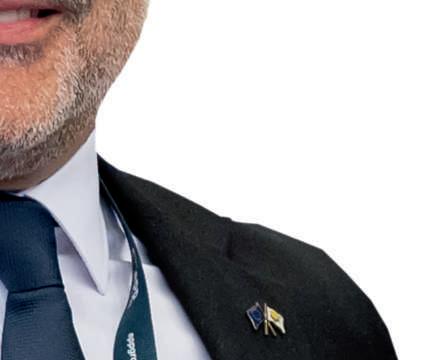

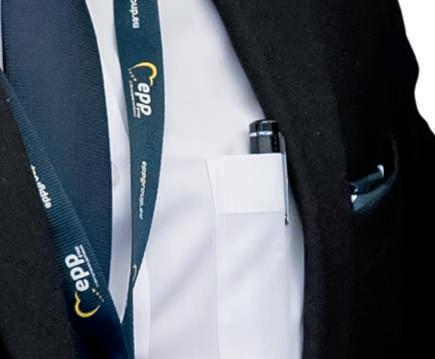


















Unlock the freedom and choice to reimagine how you work. Choose from an unparalleled range of workspace solutions and locations designed to help your business thrive.






For four decades, the Grand Hotel has never o ered the same experience twice, leaving you intrigued and eager to return. Here, luxury is a way of life, with each moment uniquely cra fted for your enjoyment.







Nestled in the hear t of the majestic Kopaonik Mountain, the Grand Kopaonik Hotel stands as a true emblem and unrivaled pinnacle of mountain tourism in Serbia .
Ever y detail is designed to enhance your experience, from the thrill of pristine ski slopes to the tranquility of a natureinspired spa , alongside world-class cuisine and limitless activities that enliven your stay.

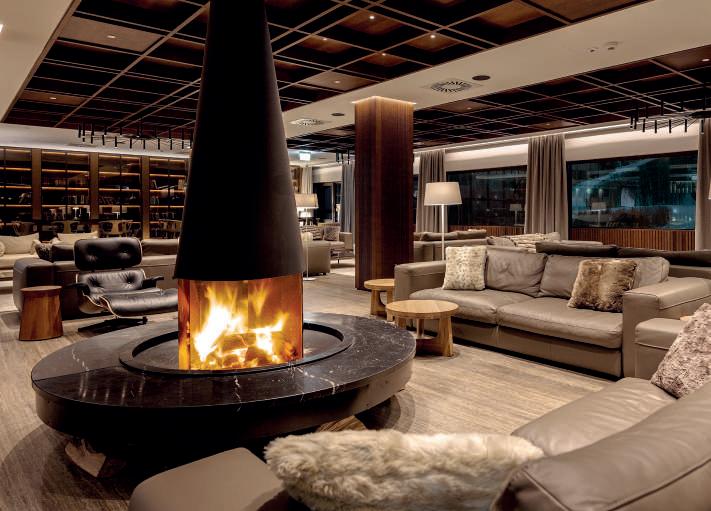

With impeccable ser vice, unmatched comfor t, and a commitment to excellence, the Grand ensures each guest not only stays but truly lives their most memorable moments.
www.grandkopaonik.com
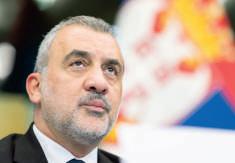








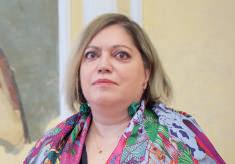

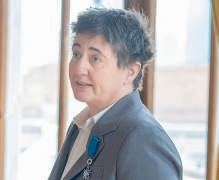

EDITOR IN CHIEF: Neda Lukić n.lukic@aim.rs
DESIGN: Slađan Radosavljević Zoran Perović design@aim.rs
COPY EDITOR: Mark Pullen
TRANSLATION & EDITING: Pullen Editorial, Halifax
CONTRIBUTORS:
Ljubica Gojgić
Zoran Panović
Radmila Stanković
Maja Vukadinović
Mirjana Jovanović
Miša Brkić, Rob Dugdale
Steve MacKenzie
Zorica Todorović Mirković Sonja Ćirić, Miloš Belčević
PHOTOS: Zoran Petrović
SALES MANAGERS: Biljana Dević b.devic@aim.rs Mihailo Čučković m.cuckovic@aim.rs Jelena Petrović j.petrovic@aim.rs
OFFICE MANAGER: Svetlana Petrović s.petrovic@aim.rs
FINANCE: Dragana Skrobonja finance@aim.rs
CEO: Ana Novčić a.novcic@cordmagazine.com
PUBLISHER: Ivan Novčić i.novcic@aim.rs




“CorD - 21 Years of Independent Thought and Inspiration”
PRINTING: Rotografika d.o.o. Segedinski put 72, Subotica
CorD is published by: alliance international media d.o.o.
Resavska 1/III, 11111 Belgrade 17, PAK 125806, Serbia Phone: +(381 11) 2450 508
E-mail: office@aim.rs office@cordmagazine.com www.cordmagazine.com www.aim.rs
ISSN no: 1451-7833 All rights reserved alliance international media 2025
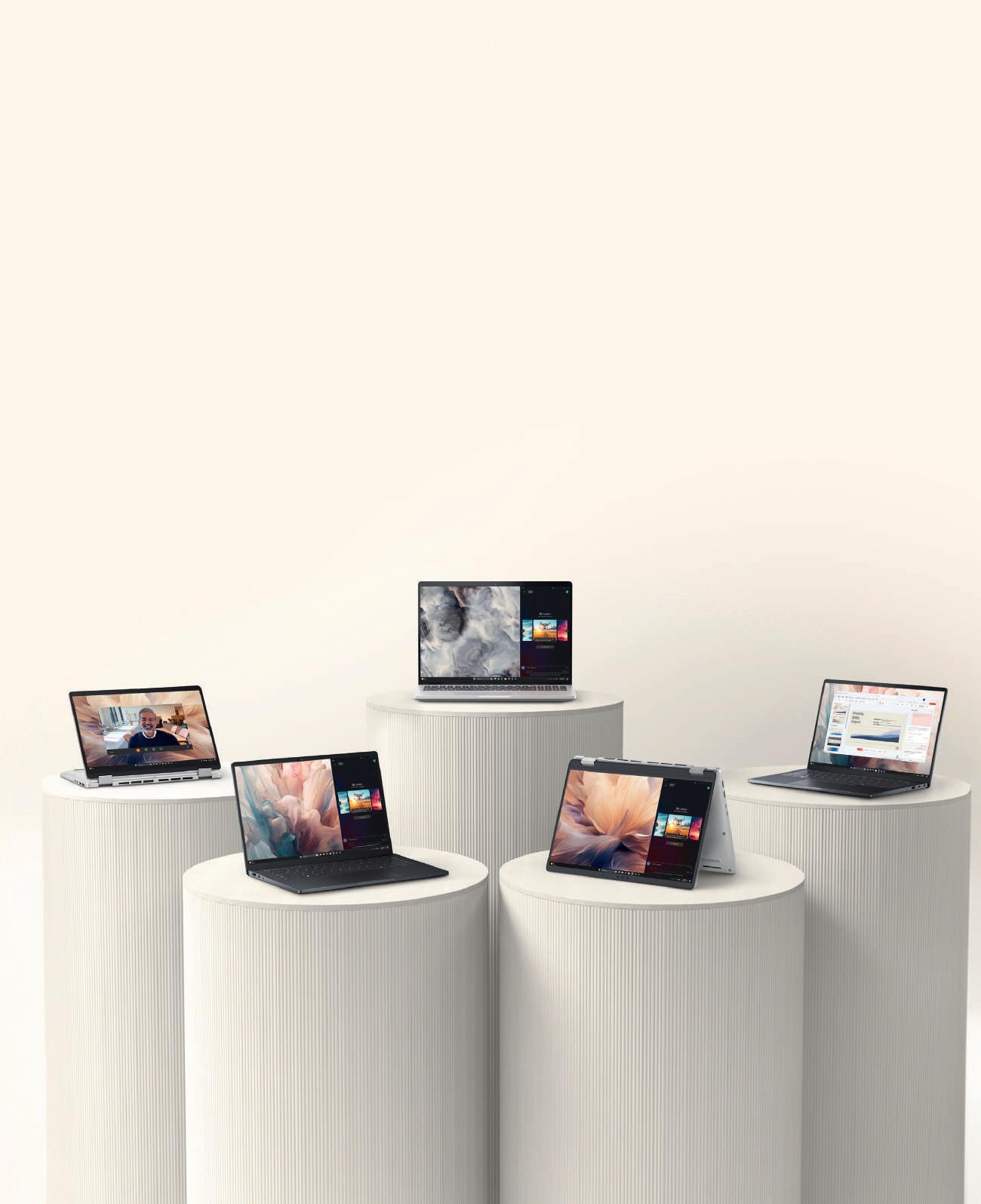
By Slobodan G. Markovich, Faculty of Political Science, Belgrade
It was back in 2019 that American actor Harrison Ford gave his famous climate change speech at the UN, in which he praised young climate activists. The Hollywood star spoke of a “new force of nature at hand”; of young people who “we’ve failed, who are angry, organised, and capable of making a difference. They are a moral army. And the most important thing that we can do for them is to get the hell out of their way.” Essentially, he described the transformative power of Generation Z, aka the Zoomers. Compared with older generations, they look like a moral army!
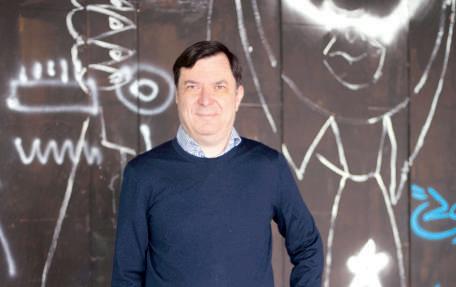
nly six months ago, many in Serbia believed that young people were very passive, disinterested in politics and determined to leave the country at the first opportunity. The first signs that Serbia’s Zoomers are similar to their western peers appeared in 2024, when they joined two widespread civic protests en masse.
OStudents of the Faculty of Dramatic Arts in Belgrade were attacked during their protest on 22nd November 2024. Revolted, they blocked the building of their faculty three days later. By the end of 2024, around 85 state faculties nationwide were under blockades. After the students organised their Belgrade rally on 22nd December 2024, with around 100,000 people participating, it became obvious that the Student and Civic Protest had emerged. By the beginning of February, more than 300 towns and cities
across Serbia had witnessed at least one protest.
The Zoomer students surprised everyone with their determination, energy and commitment, infecting many others with their qualities. Philine Bickhardt, a lecturer of Russian Literature at the University of Zurich, provided her own analysis of the Student Protest for weekly news magazine Radar. In her opinion, the Student Protest operates beyond the West-East divide; the students have no leadership cult and implement direct and radical democracy. Her conclusion is that “this is not a revolution of long hairs and joints, but of order, moderation and perseverance”. The Student Protest has so far received recognition and support from many celebrities across the region and around the world, including Madonna, Novak Đoković, Marina Abramović, Severina and Slavoj Žižek.
A survey conducted in January 2025 by the Faculty of Philosophy in Belgrade showed that 85% of the students of Serbia’s five state universities supported student blockades and their four demands, but a mere 2.5% of them have participated in any activity of any political party or political organisation.
The main question that the Student Protest has posed to various researchers is how realistic its main goal of reviving institutions and democratising Serbia actually is. While more
liberal analysts seem very enthusiastic, conservative observers doubt that the huge wave of student enthusiasm could have a significant and lasting impact unless it is politically channelled and institutionalised. Perhaps the best conclusion from this debate was offered by Andreas Ernst in Neue Zürcher Zeitung. In his article, published on 11th February, he dubs the Student Protest “the School of democracy”. He sent a message to the sceptics who, in his opinion, miss something important about a generation that was considered passive, with ambitions only to emigrate to the West. “Although this movement has not yet changed the system, those in action have: they have lost their fear, are learning to sharpen their opinions in debates and, thanks to organisation, are able to achieve concrete goals.” Finally, Ernst concludes, the Protest “turns its participants into citizens”. Will Gen X and the Baby Boomers “get the hell out of the way” of Zoomers and Millennials in Serbia, as Harrison Ford suggested in global terms? That remains to be seen. It is already clear, however, that the Baby Boomers and Gen X failed to achieve their dream of a European Serbia after coming to power in Serbia in 2000. The Millennials and Zoomers now have their own new dreams to pursue, and they are likely to be more successful than their parents.














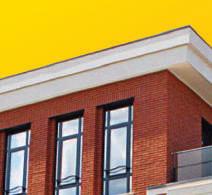
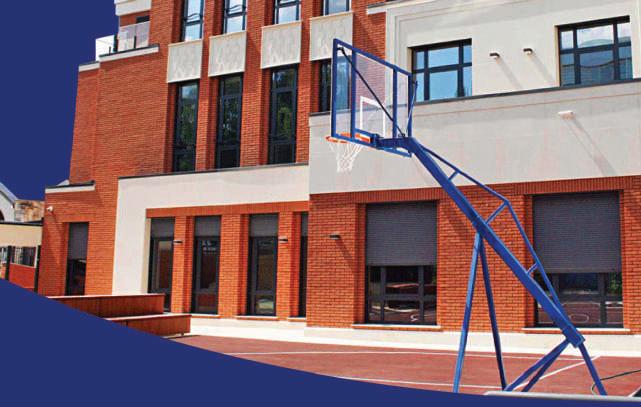



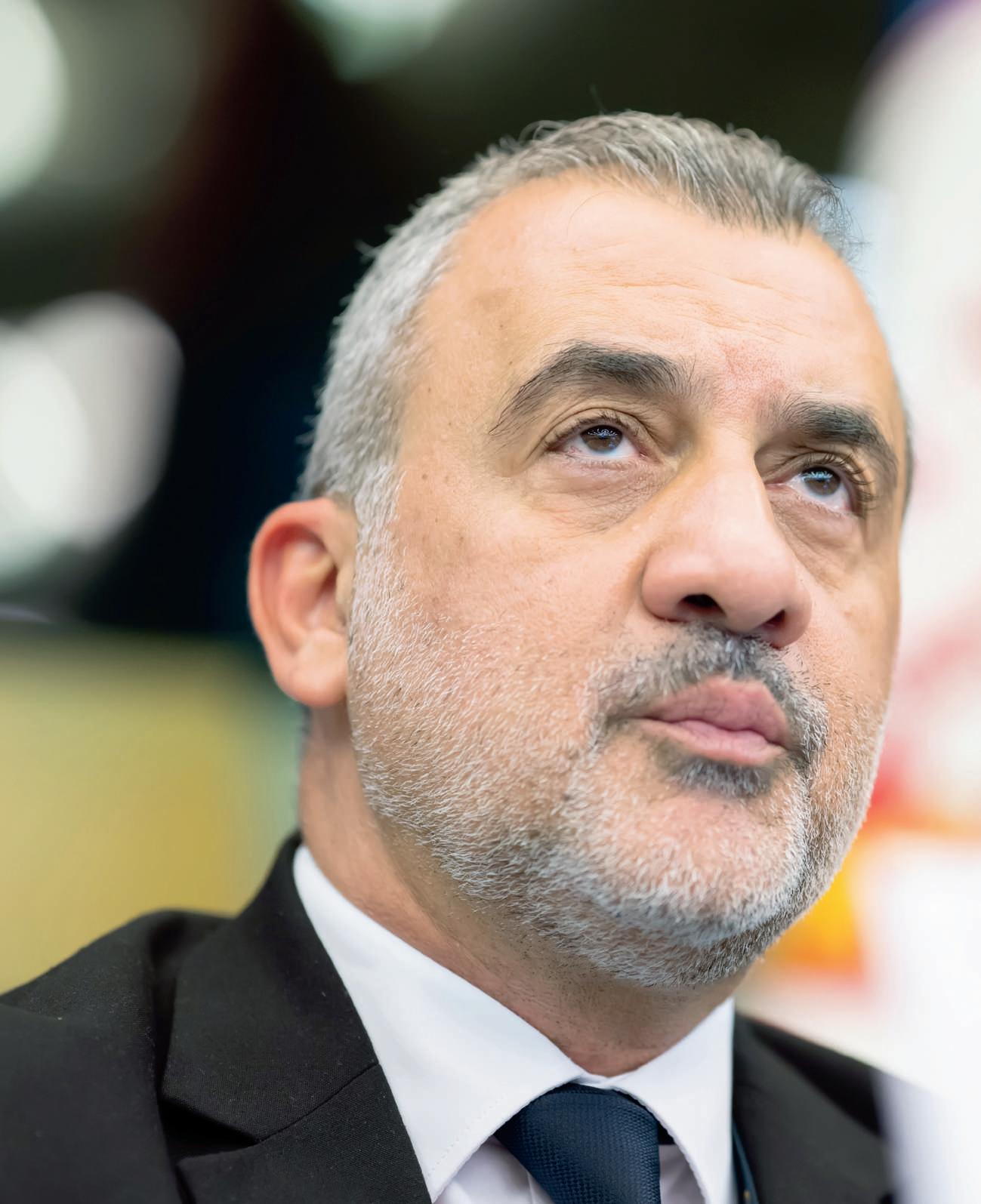
Unity and democracy are the only answers to any problems and challenges. Calmness, dialogue and respect for democracy — this is what Serbia needs, this is what the Balkans need and this is what Europe wants ~ Loucas Fourlas

Loucas Fourlas MEP Chair of the EU Delegation to the Serbia-EU Stabilisation and Association Parliamentary Committee
Speaking in this exclusive CorD interview, Cypriot MEP Loucas Fourlas analyses the challenges facing negotiations between Serbia and the EU, noting that a joint declaration wasn’t adopted following mid-February’s two-day meeting of the EU-Serbia Stabilisation and Association Parliamentary Committee (PSC) in Strasbourg, but also his determination to continue strengthening the dialogue. He discusses the significance of Serbia’s student protests as an indicator of social tension, the country’s role in ensuring the stability of the Western Balkans, and the need to strengthen regional cooperation.
Following the recent meeting of the EU-Serbia PSC, what are your key takeaways regarding the current state of EU-Serbia relations? — Serbia is at a critical crossroads, where political stability and its European path are intertwined. The recent meeting of the EU-Serbia Stabilisation and Association Parliamentary Committee reaffirmed both the challenges and opportunities of EU-Serbia relations. While the accession process is progressing, further efforts are needed in key areas like the rule of law, media freedom and democratic governance. Serbia has made significant strides, but alignment with EU foreign policy, particularly on sanctions, remains a critical issue. The EU remains committed to supporting reforms and strengthening dialogue with Serbia to ensure that its European path continues to advance smoothly. Europe and Serbia must share a common path. Unity and democracy are the only answers to any problems and challenges. Calmness, dialogue and respect for democracy – this is what Serbia needs, the Balkans need, and Europe wants. I would like to emphasise that Serbia needs Europe, and Europe needs Serbia.
What consequences could the fact that a joint declaration wasn’t adopted have when it comes to future dialogue? What could be the next
steps for your delegation in overcoming these disagreements?
— The failure to adopt a joint declaration shows that there are still significant disagreements that need to be addressed through constructive dialogue. However, this shouldn’t be seen as a failure, but rather as an indication that further cooperation and sincere exchanges of views are required. I wasn’t discouraged by the fact that the resolution didn’t pass, rather it made
While the accession process is progressing, further efforts are needed in key areas like the rule of law, media freedom and democratic governance
me even more determined, as Chair, to bring Serbia closer to Europe, and not to push it further away. My personal positions have been reflected through my vote and my amendments.
The European Parliament Delegation will continue working to bridge the differences, encouraging Serbia to focus on required reforms. The upcoming meetings should focus on clarifying key issues and strengthening the political will for compromise, always within the framework of European principles and values. Serbia is moving in the
right direction, towards ultimately being embraced by the EU. After all, Belgrade knows that the sooner it aligns fully with accession criteria, the sooner it will become a full member of the European family. The continuation of this European direction is required, with an emphasis on the rule of law and alignment with the EU’s security policy, which itself still has a long way to go to be fully integrated.
The recent student protests in Serbia have highlighted concerns over democratic governance, electoral transparency and corruption. How does the European Parliament view these protests, and could they influence the perception of Serbia as an EU membership candidate country?
— The student protests in Serbia are a clear indication of public concern regarding democratic governance, electoral transparency and the fight against corruption. The European Parliament supports the right to peaceful protest and believes that civil society voices must be heard. These developments impact the perception of Serbia’s progress as a candidate country and highlight the need to intensify reforms. Addressing these concerns with transparency and dialogue will strengthen Serbia’s democratic trajectory and its European perspective. I have on many occasions emphasised in the Europe-
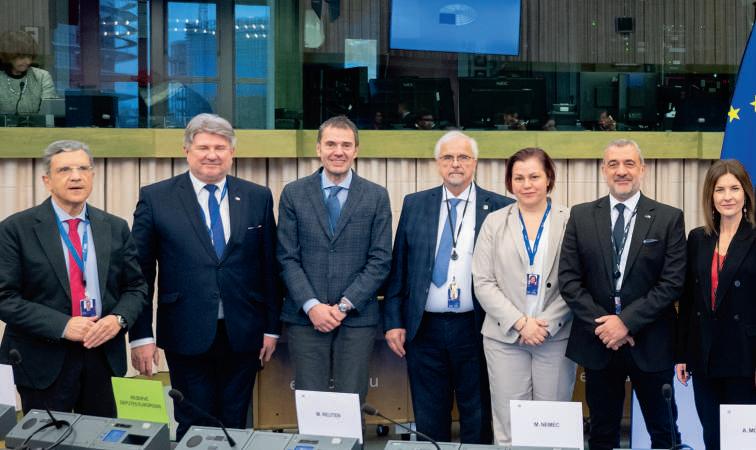
The student protests in Serbia are a clear indication of public concern regarding democratic governance, electoral transparency and the fight against corruption
Serbia is at a critical crossroads, where political stability and its European path are intertwined
Serbia has made significant strides, but alignment with EU foreign policy, particularly on sanctions, remains a critical issue
an Parliament that Serbia’s EU accession is a geopolitical necessity. There are objective difficulties, and both Belgrade and Brussels are aware of them. I believe both sides must recognise the efforts being exerted and contribute practically to the dynamics of the country’s accession process. Now is the time for decisive action. Clear and firm harmonisation steps are required from Belgrade, and these are the steps that will soon bring the country to the EU’s doorstep.
Considering the evolving political landscape in the Western Balkans, how do you view Serbia’s role in promoting regional stability? What more can be done to encourage stronger cooperation between Serbia and its neighbours within the EU integration framework? — Serbia plays a crucial role in ensuring the stability of the Western Balkans, as its stance impacts regional dynamics significantly. Strengthening cooperation with neighbouring countries
through dialogue, economic connectivity and conflict resolution is essential to regional cohesion. The EU can support this process through funding mechanisms, enhancing regional integration and encouraging compliance with European standards. Serbia’s commitment to good neighbourly relations will be critical on its path to EU membership. In a recent debate in the Plenary of the European Parliament, I mentioned that developments in Serbia also impact its neighbours directly, touching the entire Balkan region. A prime example of this is the Union of 27 itself, which has proven that syner-
I wasn’t discouraged by the fact that the resolution didn’t pass, rather it made me even more determined, as Chair, to bring Serbia closer to Europe, and not to push it further away
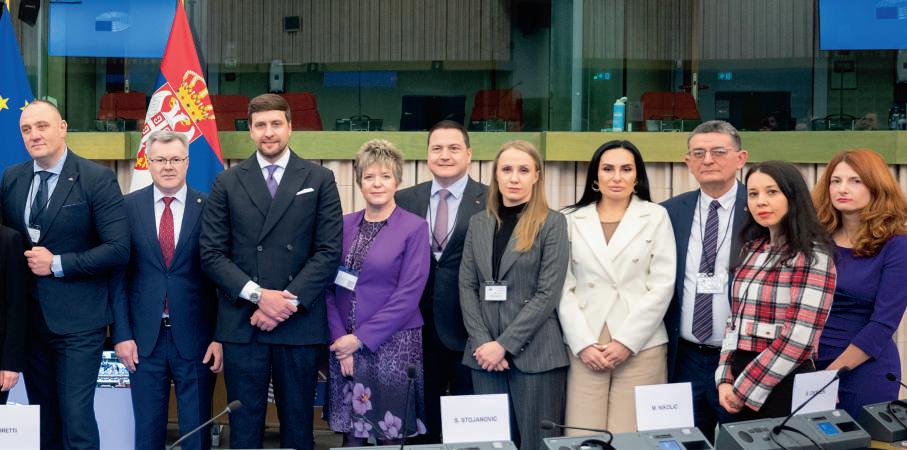
gies and partnerships can form the basis for peace, stability and prosperity. No country acting alone, and no other partnership, has achieved as much as the EU in countless areas. These partnerships have made us a global force to be reckoned with. The key for Serbia to overcome its challenges thus lies in its clear strategic orientation. Once this is in place, progress will come much faster and tackling challenges will become simpler.
In light of current geopolitical challenges and the war in Ukraine, how would you assess Serbia’s position within the broader European context? Do you believe the EU should redefine its enlargement strategy to accelerate the integration of the Western Balkans, including Serbia, into the Union?
— The geopolitical reality shaped by the war in Ukraine makes it clear that stability and alignment with European values are more important than ever. Serbia’s position within the broader European context depends on its commitment to European principles, including foreign policy alignment and sanctions. The EU must adapt its strategy to offer clearer incentives and timelines for the Western Balkans, while ensuring that enlargement continues to be driven by values and reform. The further EU enlargement that’s expected in the coming years will undoubtedly strengthen its international presence and influence. However, it is clear that there is a problem, one that we have identified and highlighted many times.
I firmly believe that a Union made up of even more members will be stronger, but it will stand on shaky ground if it lacks a common foreign policy. This is something no one wants.
The region’s longest-standing EU member state, Greece advocates expansion of the Union in the direction of the Western Balkans, as the countries of this region have been awaiting accession for a long time, says Ambassador Levanti in this CorD Magazine interview. She adds that this Greek message has been sent in two directions: towards the EU, calling on the Union not to ignore the results achieved by Serbia; and towards Serbia, calling on Belgrade to continue reforms that will bring it closer to the EU.
Your Excellency, this year began with a series of earthquakes on the popular Greek island of Santorini. What is the current situation as we conduct this interview on 21st February?
—The intense seismic activity in the region around Santorini and Amorgos began on 26th January and is continuing today, sometimes with more intensity and sometimes with less. As you will understand, neither I nor the experts can substantially answer your question, as the situation is variable and no predictions can be made. According to scientists, the geological phenomenon observed is a complex

H.E. Maria Levanti
Greek Ambassador to Serbia
By Ljubica Gojgić
The recent letter of Greek Prime Minister
Kyriakos Mitsotakis in support of Serbia’s EU path, addressed to his EU counterparts and heads of EU institutions, clearly illustrates the conviction that Europe cannot afford to ignore the largest country and economy in the Western Balkans and, most importantly, demonstrates that Serbia’s serious commitment to its EU membership goal shouldn’t be disregarded ~ Maria Levanti
one. The Greek state has taken measures to assist residents in the case of emergencies. These measures include dispatching medical and civil protection teams to manage the aftermath of the earthquakes, providing financial support to local workers and busi-

nesses, repairing damage and constructing a new, safer harbour. We are all keeping calm, composed and optimistic.
Senior offi cials from Greece and Serbia have emphasised the need
to “take a step forward in economic relations”. In which areas could such progress be achieved?
— Greek investments in Serbia are expanding again, with Greece experiencing positive growth trends. Approximately €17 million was invested in Greek-owned production facilities in Serbia last year alone. With regard to trade flows, the annual volume of bilateral trade has been increasing constantly over the past few years, and from approximately €480 million in 2020 we reached around €830 million in 2024, while the annual exchange of services is also estimated at around €500 million.
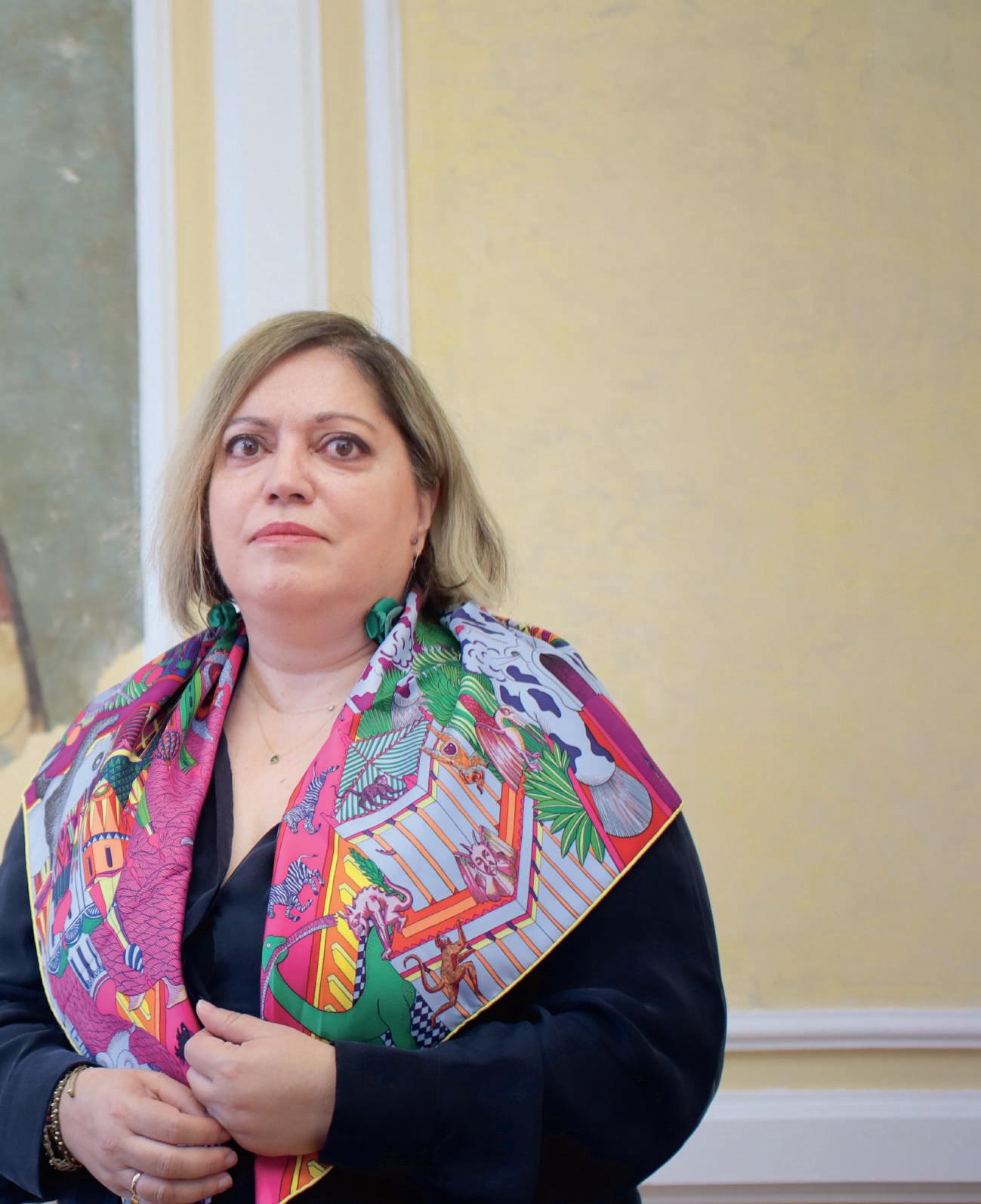
While strong bilateral economic cooperation already exists in sectors like heavy industry, infrastructure, IT and the food and beverage sector, significant potential exists for expansion in other areas of mutual interest. These include recycling and waste management, connectivity, energy and environment, information and communication technologies, the pharmaceutical industry and the agro-food industry.
Green transition is a special field of the further development of our economic cooperation, which aims not only to encourage investments, but also to share knowledge and experience. Greece is one of the top ten countries in the world when it comes to renewable energy production, producing almost 50% of its electricity from solar and wind energy installations.
Moreover, Greece supports Serbia’s energy diversification through the Serbia-Bulgaria Gas Interconnector and its connection to TAP and the Alexandroupolis LNG terminal. It also supports the future Serbia-North Macedonia Gas Interconnector.
During his visit to Serbia last year, Greek Prime Minister Kyriakos Mitsotakis stated that Greece is interested in participating in the Expo 2027 project. What aspects of this investment package are particularly interesting to Greece?
— The EXPO 2027 project presents numerous opportunities for collaboration between our two countries in construction, construction materials, property management, real estate development, tourism, waste management, green energy etc.
Greek companies have developed expertise in large-scale infrastructure projects in various sectors over the years. From the infrastructure for the 2004 Olym-
Approximately €17 million was invested in Greek-owned production facilities in Serbia last year alone
Green transition is a special field of the further development of our economic cooperation, which aims not only to encourage investments, but also to share knowledge and experience
Greece’s stance on the recognition of Kosovo remains unchanged
pic Games to the most recent Ellinikon Project, Greek companies have amassed significant knowledge and experience in developing large scale projects, including urban development, innovative construction materials, waste and energy management and transportation, and they are willing to collaborate with Serbian companies on projects like EXPO 2027. Several Greek companies that are active in the construction sector are present in Serbia, contributing their products and services to large-scale projects like Nikola Tesla Airport.
Greece supports Serbia’s EU integration, though progress on this journey has been slow despite frequent discussions about “new momentum” for EU enlargement. Given your diplomatic experience, would you say that future enlargement –provided it happens – will prioritise the accession of Ukraine and Moldova or the Western Balkans? Which scenario would better serve Greece’s interests?
— There has indeed been some progress on the European paths of a number of EU partners recently. In this regard, Greece has always stressed that the enlargement process must continue to be based, first and foremost, on each candidate country’s own merits, with a particular emphasis on the fundamentals. At the same time, the EU should engage consistently both with its Western Balkan partners and with Ukraine and Moldova. Athens prioritises the Western Balkans’ enlargement process, as our partners in this region have long awaited EU membership and have already taken several steps in that direction. This prioritisation does not, however, ignore the geostrategic considerations ad-
vocating Ukraine’s future EU membership. In this vein, Greece believes firmly that Serbia cannot be left behind. Prime Minister Mitsotakis’s recent letter of support for Serbia’s EU path, addressed to his EU counterparts and heads of EU institutions, clearly illustrates this conviction: we cannot afford to ignore the largest country and economy in the Western Balkans and, most importantly, Serbia’s serious commitment to its EU membership goal should not be disregarded. As the oldest EU member in the region and a traditional friend of Serbia, Greece encourages Serbia to continue its EU reform efforts and address any remaining challenges, standing ready to offer any additional help needed to speed up this process.
The annual volume of bilateral trade has been increasing constantly over the past few years, and from approximately €480 million in 2020 we reached around €830 million in 2024, while the annual exchange of services is also estimated at around €500 million
You are probably accustomed to being asked this same question in interviews, but it is important: has there been any change in Greece’s position that recognition of Kosovo’s unilaterally declared independence remains unacceptable? — Greece’s stance on the recognition of Kosovo remains unchanged. Let me remind you, by the way, that this has been confirmed repeatedly by the Greek political leadership, on
the occasion of bilateral visits, such as during the February 2024 visit of PM Mitsotakis.
Greece is one of the most popular destinations for Serbian tourists, but reports suggest that visiting Greece will be more expensive next summer due to the introduction of increased tourism taxes.
Could you clarify what this decision entails?
— Greece has always held a special place in the hearts of Serbian holidaymakers, and it’s wonderful to see so many of them choosing to visit. According to YUTA, over a million Serbians explored our country last year alone.
It is correct that, as of this year, a new tax called the “Climate Crisis Resilience Tax” is being applied, replacing the previous “Accommodation Tax” that had been in place since 2018. This new tax, which aims to fund state projects focused on natural disaster prevention and recovery, climate change adaptation and infrastructure improvement, will be added on a daily basis to the accommodation cost and will vary depending on the time of your trip – high or low season – and type of lodging. As this tax replaces a previous one, the actual increase in accommodation costs between April and October will be relatively modest, starting at one and a half euros per day per room. For the most luxurious hotels and villas, the increase will be more significant, reaching up to 11 euros. However, Greece offers accommodation options to suit all budgets and I’m confident that many people will choose to visit and experience the warmth and hospitality for which my country is famous.
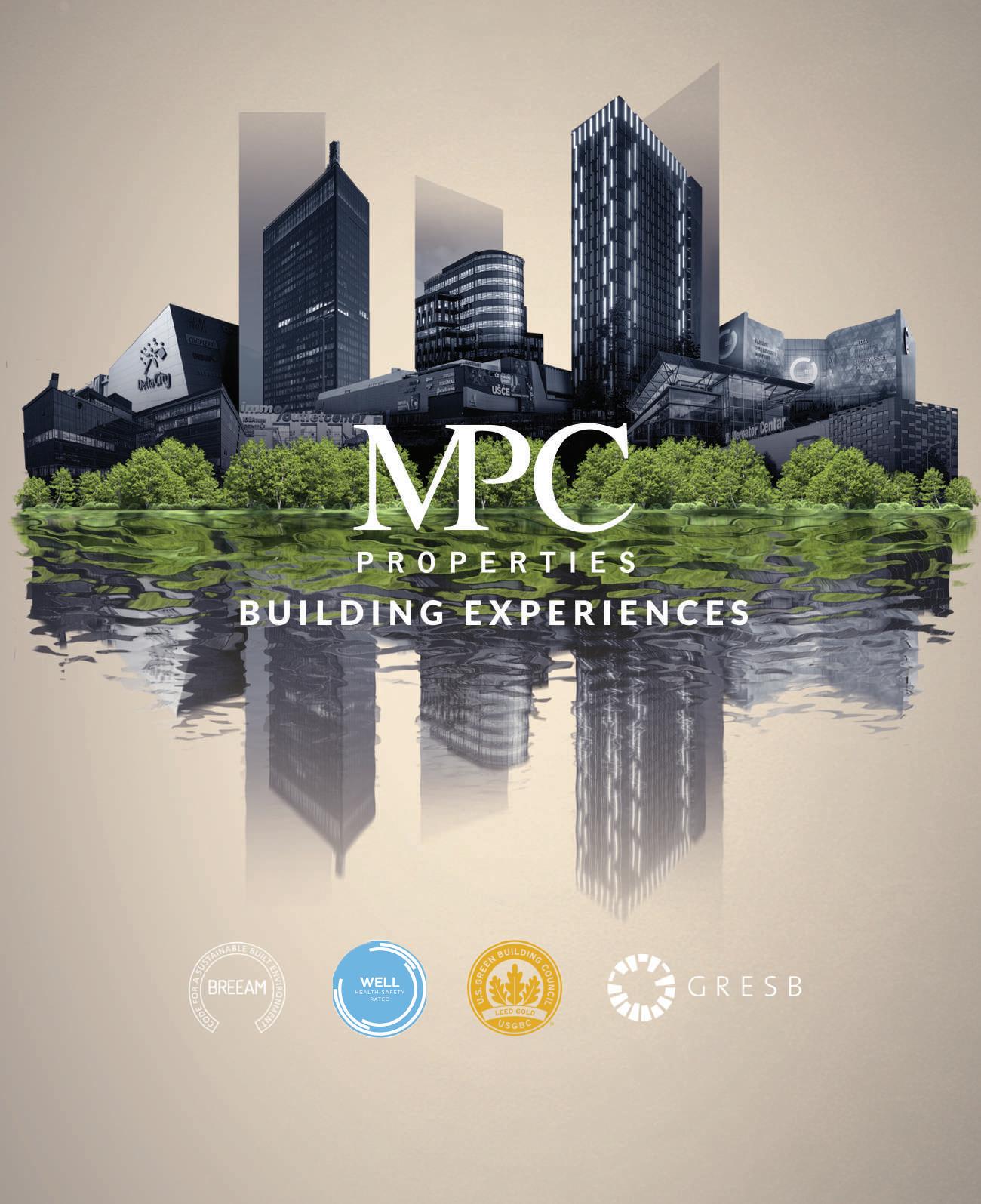
m p c p ro p e r t i e s . r s
French President Emmanuel Macron and UK Prime Minister Keir Starmer are scheduled to visit the White House to discuss defence and security matters. Greek Prime Minister Kyriakos Mitsotakis emphasised the need for Europe to enhance its defence capabilities and budget flexibility. NATO Secretary General Mark Rutte called for increased defence spending among member states in response to ongoing global security challenges.

”We must work together to ensure the equitable distribution of wealth, opportunity, and power in our society”
Nelson Mandela


Australian journalist Cheng Lei published a memoir detailing her three-year detention in China on charges of supplying state secrets to foreign organisations. In “Cheng Lei: A Memoir of Freedom,” she recounts her experiences of isolation, interrogation, and limited contact with the outside world. Her release in 2023, facilitated by Australian diplomatic efforts, has brought renewed attention to China’s treatment of foreign journalists and its legal system.
In early 2025, several prominent companies, including Southwest Airlines, Meta, and Microsoft, announced substantial layoffs as part of cost-cutting and restructuring efforts. These decisions reflect broader economic challenges and shifts in market dynamics. The layoffs have sparked discussions about job security and the evolving landscape of employment in various industries. Analysts suggest that these moves may be indicative of a cautious approach by corporations in response to economic uncertainties and changing consumer behaviours.


”A genuine leader is not a searcher for consensus but a moulder of consensus”
Martin Luther King Jr.
Israel vowed retribution against Hamas after the militant group paraded the bodies of hostages, including children, during a propaganda event. Prime Minister Benjamin Netanyahu and Defense Minister Israel Katz condemned the act and promised to hold Hamas accountable. The incident drew international condemnation and raised concerns about the stability of the ongoing ceasefire and the potential for renewed conflict.


On February 18, 2025, Egypt announced the discovery of Pharaoh Thutmose II’s tomb, marking the first unearthing of a royal tomb since that of Tutankhamun in 1922. This significant archaeological find offers new insights into Egypt’s Eighteenth Dynasty and is expected to enhance understanding of ancient Egyptian history and burial practices. The discovery has garnered international attention and is anticipated to boost tourism and scholarly interest in Egypt’s rich cultural heritage.
On 4 February 2025, a gunman opened fire at an adult education centre in Örebro, Sweden, resulting in the deaths of at least 11 people, including the perpetrator, and injuring another 15. This tragic event stands as the deadliest mass shooting in Sweden’s history. The incident has prompted national discussions on gun control, mental health support, and security measures in public institutions. Authorities are conducting a thorough investigation to understand the motives behind the attack and to prevent future occurrences.

The collapse of the Novi Sad train station’s concrete canopy completely laid bare the dismantling of the underlying postulates of the Serbian construction sector. And experts now warn that proposed legislative changes, rather than remedying the problem, would lead to the collapse of standards for major public construction projects

Many questions have been raised by the collapse of the concrete canopy at the renovated railway station in Novi Sad, which caused 15 deaths and prompted mass protests nationwide. These questions relate not only to the direct culprits who are to blame for this trag-
ic accident – which some have called the murder of citizens – but also to the deeper reasons behind it, as well as the safety of construction works in both the public and private sectors. It is in this context that we spoke with experts about the systemic postulates of safety in the construction sec-
tor. A special part of the discussion was devoted to Expo 2027, with plans for the rapid construction of a large number of facilities under the conditions of an amended legal framework that further limits the possibilities of controlling quality adequately.

Aleksandra Koneski architect
The key factor in respecting construction standards and procedures is the removal of political influence over the profession and the protection of engineers who work in accordance with regulations, and the punishing of those who don’t
The collapse of the canopy didn’t only raise questions related to respect for procedures in the construction sector, but also prompted the self-organised Group of Engineers of Serbia to submit direct requests to the Serbian Chamber of Engineers and the Ministry of Construction, Transport and Infrastructure. These requests demand the depoliticisation of the Chamber, as the umbrella organisation of engineers, but also amendments to the Law on Planning and Construction and the ‘Rulebook on the contents, scope and manner of producing prefeasibility and feasibility studies for the construction of structures’ in the following way: by introducing mandatory technical controls of projects for execution and controls of a project’s compliance with the building permit issued, and to do so prior to registering the start of works; the introduction of obligatory construction project drafting for all categories of buildings, and the introduction of an obligation to prepare a condition assessment study on existing structures as a mandatory part of project documentation for buildings that are being reconstructed, with an obligatory component being investigative works (to determine the quality of all structural elements and materials incorporated).
The requests to amend the Law on Planning and Construction and the aforementioned rulebook include tangible measures to ensure higher standards of safety and responsibility, as well as adherence to
standards, procedures and laws, to ensure there is no repeat occurrence of mistakes like the one at the Railway Station in Novi Sad. The current law doesn’t include an obligation to thoroughly inspect existing structures during the reconstruction of a building, which could certainly be among the bigger omissions.
The railway station was made operational without complying with legal procedures, or without the issuance of a usage permit that’s mandatory for using a facility. This is a direct consequence of political influence, and not the profession itself. In this sense,
The systematic breakdown of engineering controls,
poor legislation
and the loss of professional responsibility led to the collapse of the canopy
the key factor in respecting construction standards and procedures is the removal of political influence over the profession and the protection of engineers who work in accordance with regulations, and the punishing of those who don’t.
The systematic breakdown of engineering controls, poor legislation and the loss of professional responsibility led to the collapse of the canopy, and thus also to the need for engineers to take the initiative themselves and demand concrete measures and actions to prevent the repeat of such mistakes.
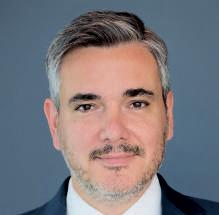
Vladimir Obradović full professor and Head of the Department for Interdisciplinary Research in Management at Belgrade University’s Faculty of Organizational Sciences
A lack of adequate regulation and public control provides fertile ground for corruption, which inevitably results in higher costs and lower quality, to the detriment of Serbia’s citizens
Imagine you’re baking a cake. You don’t follow a recipe, don’t use proven ingredients and entrust the making of the cake to someone who’s never previously baked anything. Moreover, the cake costs as much as the most expensive speciality from Vienna, Paris, New York or Tokyo. And voila, that’s the state of public projects in Serbia.
The absence of adequate regulations and public oversight of works creates fertile ground for corruption, and corruption inevitably leads to higher costs and/or lower quality, and all to the detriment of Serbia’s citizens.
Public projects in Serbia don’t respect technical, financial or management practices to a great extent. The current government has been deregulating constantly for more than a decade, reducing requirements for expertise in all areas – construction, transport, education etc. The interests of investors are prioritised, often at the expense of safety. The works at the railway station in Novi Sad were entrusted to companies that lacked adequate previous experience of working on similar projects, which directly increased project risks in terms of deadlines, costs and the quality of results delivered, and thus also safety.
The new raft of laws proposed in the National Assembly by the departing government extends to the extent of being absurd in envisaging the commissioning of facilities within the scope of the EXPO project without a usage permit, and enabling the launch of construction works without a project first being subjected to environmental and immovable cultural assets impact assessments. This all testifies to us every day moving further away from a system that we could say has been astructured in accordance with the needs of citizens.
A lack of transparency and the absence of the public in works also represent major problems of the public sector in Serbia. Under a veil of contract secrecy, citizens don’t have adequate insight into what’s being done, why it’s being done, how much it will cost, how long it will take and what benefits it will bring to society. We don’t know whether public projects have formal managers and who they are if they do, what their competencies are, how they were selected. Such information should be available to the public.
The government defends some public projects with police cordons because the public doesn’t want them, as is the case, for example, with the project to remove
For projects like EXPO, where a public justification study is lacking, we receive information exclusively from the president, which is unacceptable and unconstitutional
the Sava bridge. For some projects that will require the spending of billions of euros of public money, such as EXPO, we don’t have a justification study that’s publicly available. This is unacceptable. We can only hear about and see these projects at the press conferences of the President of the Republic of Serbia, and his jurisdiction in this area is in no way in accordance with the Constitution of Serbia.
Uncompromising application of the law, followed by the urgent improvement of regulations and strengthening the role of the profession, represent the only way to heal all spheres of society, including future infrastructure projects.
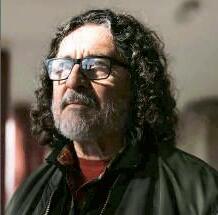
Zoran Đajić geological engineer
The way the works contractor for the reconstruction of the building of the railway station in Novi Sad was selected is a classic example of concerted corruption practices that include everyone – from the contractor, via supervision and ministry officials, all the way to the Presidency of Serbia itself
The collapse of the canopy of the building of the railway station in Novi Sad, which caused 17 casualties, including 15 deaths and two people left permanently disabled, revealed the devastating fact that priorities in Serbian construction are given to the economic effect of every position on the construction site and that no expert is responsible for the safety of buildings and the quality of works implemented. The selection of contractors and subcontractors is carried out according to the principle of agreement, despite the Law making it mandatory to conduct public tenders for all works financed from the budget of the Republic of Serbia. The way the works contractor for the reconstruction of the building of the railway station in Novi Sad was selected is a classic example of concerted corruption practices that include everyone – from the contractor, via oversight and ministry officials, all the way to the Presidency of Serbia itself. Corruption is also reflected in the fact that works on the reconstruction of the building had estimated costs of 3.5 million euros, while 16 million euros was spent. No less important is the fact that most construction workers on the building lacked appropriate professional training, which means that the quality of the work is very problematic in many positions.
The collapse of the building canopy at the railway station in Novi Sad should trigger inspection work, with more frequent and stricter controls of works and the quality of expert personnel engaged in infrastructure facilities, control of the method of selecting licensed contractors in terms of previous references, professional and technical capabilities for the execution of works that are the subject of financing, public tenders for all works financed from public revenues and the selec -
Corruption has led to the Serbian construction industry losing all trust and to no one having confidence in the safety of buildings under construction
tion of oversight that engages experts with appropriate licenses and proven integrity in the profession. But also regular financial controls of construction documentation to prevent the kind of corruption that has reduced the Serbian construction sector to a branch of the economy in which all trust has been lost when it comes to the safety of buildings being constructed.

Serbia must modernise, change its economic structure and increase its productivity and competitiveness. Existing policies don’t pay sufficient attention to these objectives
ALEKSANDAR VLAHOVIĆ President of the Serbian Association of Economists
This year’s Kopaonik Business Forum (KBF) takes place in the broader context of a geopolitical and geoeconomic situation that’s continuously complex. This time around, the protracted polycrisis identified at last year’s KBF has even more sources and encompasses an array of relevant economic and social areas, ranging from slow growth, conflict tension, inflation, supply chain disruptions, slowing and fragmented world trade, falling real wages, rising inequality and delays in the implementing of the green agenda.
According to the estimation of Aleksandar Vlahović, president of the Serbi-
an Association of Economists, the global economy is recovering slower than expected, though it is nonetheless displaying considerable resilience. “It is expected that the growth of advanced economies will improve slightly, from 1.7% in 2023 to 1.8% in 2024, and will maintain that same momentum in 2025. Estimates for 2024 reflect the stronger growth dynamics in the U.S. (2.8%) and expected weaker growth in the EU. When it comes to the forecast for 2025, the opposite is true: the U.S. economy is expected to experience slower growth (2.2%), while other advanced economies are expected to perform better compared to 2024.
“Economic developments in Europe are particularly significant for Serbia, as the continent continues to face two challenges: the first is finally overcoming inflationary pressures and restoring price stability; while the second is
ensuring strong, sustainable and green growth over the long term, while managing the impact of geoeconomic fragmentation, which could further undermine Europe’s competitiveness at the global level, coupled with slow or even stalled convergence within the EU and across Europe as a whole”.
Could the Western Balkans benefit from new nearshoring and friendshoring trends?
— Throughout 2024, the Western Balkan region relied more on domestic sources of growth supported by an expansionary fiscal policy, the rising availability of credit and inflationary pressures. Alongside increased consumption and investment on the demand side, the region experienced strong growth in construction and services on the supply side. Economic growth is expected to have reached 3.3% in 2024, compared to 2.6% in 2023. It is projected that Serbia, as the region’s largest economy, will have achieved GDP growth of 3.9% in 2024, spurred by the recovery of private consumption and investment.
Following three years of consolidation, the fiscal deficits of Western Balkan countries are expected to have grown in 2024, despite a strong income performance. This deficit growth is a consequence of great pressures on spending (social benefits, pensions and salaries) and increased investment expenditures. All in all, the region’s fiscal deficit increased by an average of one per cent of GDP.
The region had growing trade and current account deficits over the past year, due mainly to the slow growth of exports that resulted from reduced external demand. This is a consequence of negative economic trends among the region’s key foreign trade partners of the region, and here I’m referring primarily to the zero growth achieved by Germany. It can thus be expected that domestic consumption, investment and trade within the region will become more significant sources of growth in 2025 and beyond, until EU trading partners recover fully from the crisis. The programme of structural reforms re-
mains crucial to stimulating growth in the region aimed at increasing living standards sustainably and accelerating economic integration. In this regard, the EU Growth Plan for the Western Balkans offers a combination of new funding opportunities and advanced access to selected aspects of the Single Market in the Western Balkan region. Expanding the geographic scope of the Single Euro Payments Area (SEPA) to encompass some Western Balkan countries as early as 2025 is also important and will significantly help to support market integration and eliminate obstacles to financial flows. Ultimately, benefiting from potential nearshoring and friendshoring trends will depend largely on future econom-
A lack of transparency in the selecting and financing of capital projects leads to delays, exceeded budgets, poor quality works and questionable long-term effects of such investments
ic and trade relations between Europe and China, which we can conclude from experience will be influenced greatly by political and economic relations between the U.S. and China. It is nonetheless important to note that, without serious reforms, providing subsidies to foreign investors won’t be enough to make any Western Balkan country attractive for investment.
How capable is Serbia when it comes to avoiding the middle-income trap? — Serbia is still a moderately developed economy with a predominantly traditional business sector. Despite major capital and foreign investments, the economy’s structure hasn’t changed markedly. Traditional sectors still employ more than half of the workforce, while their contribution to GDP has stood at a level of 43 to 44 per cent for the last 20 years. The development model implemented to date has secured insufficient economic growth to close the gap
on the countries of Central and Eastern Europe that are today EU and Eurozone members.
The key drivers of our economic growth since 2016 and to this day are state capital investments and foreign direct investments. Public investments have been at a level of seven to 7.4% for the past several years, which is the maximum amount allocated for these purposes. At the KBF in previous years, we regularly emphasised the need for capital investments to be above six per cent of GDP, and in this regard the government has made very good progress since 2018. However, the problem is that the plan to realise capital investments isn’t preceded by a clear strategy that would serve to define the basic investment corridors over the medium term. That’s why we suggest the precise defining of project selection methodology and analysis of the socioeconomic justification of those projects, i.e. multiplier analysis of projects’ positive impact on overall economic activity – not only in the period of realising capital investments, but also during the usage period of completed infrastructure facilities. A special problem is represented by the process of making decisions on the financing method, contractor selection and supervision. Since 2018 and to this day, practically all major projects have been implemented according to special procedures, without applying the Law on Public Procurement and without the possibility of ensuring a more effective way of spending the money provided for these purposes in a procedure that’s transparent for the state and taxpayers. The consequence of this approach is that additional costs regularly appear, planned project budgets are exceeded significantly, implementation is delayed and the quality of implemented works is often questionable. The period of fiscal consolidation was followed by significant FDI growth. And those investments, together with other economic policy measures, contributed to our country’s macroeconomic stabilisation. With this FDI amounting to five per cent of GDP or more since 2019, it has been possible to significantly reduce
unemployment levels and increase the employment rate. As a consequence, the level of foreign investment has so far ensured the full coverage of the current account deficit, or the country’s foreign currency liquidity. FDI has been largely directed towards traditional sectors of the economy (more than 60%), while a proportionally smaller amount has been directed towards advanced, hightech sectors. It will be difficult to sustain the amount of FDI attracted with this structure in the future. Firstly, the availability of labour is today already problematic, while labour costs are simultaneously rising significantly. It is thus important that the state implements active industrial policies that direct FDI towards advanced branches of the economy, which would then also spread knowledge and advanced technologies to the domestic economy. This implies abandoning the policy of indiscriminately subsidising FDI. Secondly, Serbia will have a rising trade deficit in this year and the years ahead, resulting in a current account deficit. The latter deficit has to date been financed through net FDI inflows, but by last year these inflows had already fallen below the realised current account deficit. Given that outflows from dividends grow gradually, an unchanged FDI structure will inevitably result in a long-term deficit coverage problem. It is good that credit rating agency S&P Global Ratings gave Serbia an investment rating of BBB- with a stable outlook last October, for the first time ever. This will certainly impact on borrowing on the international financial market being more favourable for Serbia, and this news will also have a positive influence on foreign investors. Fitch Ratings recently confirmed its previously defined credit rating of BB+ with a stable outlook, without assigning an investment rating. This is certainly good news for our country. On the flip side, Transparency International’s recent report doesn’t favour reform processes in our country, given that Serbia ranks 105th out of 180 countries on the corruption perception index in the public sector, with a total of 35 points. Only four Eu-
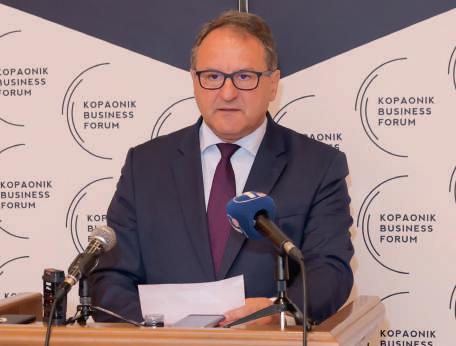
We talk constantly about the need to improve the business environment and the quality of institutions – both those that regulate the market and those that guarantee legal certainty
ropean countries rank worse than us: Ukraine, Belarus, Bosnia and Herzegovina and Russia. Moreover, Serbia has been in constant decline according to this annual report since 2016, ranking worse with each passing year, which moves our country further away from the global and European average, but also further away from the goal – set by the government in its Strategy for Combating Corruption – of reaching an index rating of 43 over the next three years. For example, reaching the goal set would rank us in 76th place, alongside Bulgaria, China and Moldova, while in Europe we would have a better rating than not only the four aforementioned countries, but also Albania, Hungary and North Macedonia.
In order for Serbia to avoid the middle-income trap over the short term, it is essential to maintain a solid monetary policy position as long as is necessary, and for the goals of deficit reduction, debt control and the restoration of fiscal buffers to be respected, in combination with fiscal consolidation. This unfortunately doesn’t seem to be a priority of the Government at present, giv-
en that larger fiscal deficits are planned and that the fiscal rules have been de facto suspended until 2029. In other words, there is no satisfactory synchronisation of monetary and fiscal policy and we thus shouldn’t expect the National Bank of Serbia to engage in further monetary easing.
Serbia must modernise, change its economic structure and increase its productivity and competitiveness. The robust growth that’s desired won’t be possible without a higher level of quality when it comes to domestic private investments. Unfortunately, domestic private investments are stagnating with each passing year.
How does the Kopaonik Business Forum innovate itself in accordance with the needs of participants?
— The Kopaonik Business Forum is the region’s most important conference. This is confirmed year after year by the broad list of participants that includes domestic and international representatives of the business and academic communities. By choosing modern and current topics, we strive to keep pace with the times, and to enable all participants to have interesting discussions that don’t relate only to classic macroeconomic topics. That’s why the coverage of our KBF topics is such that it provides a platform to analyse all important aspects of the development of society, and not just the economic aspect. Our success is the result of dedicated work on the preparation of each subsequent edition of the Forum, and preparation work begins as early as April of the current year. It’s a given that each year’s KBF concludes with an extensive survey of participants, where in the summarising of results we hear suggestions of what else we need to offer for the next year’s event. We leave nothing to chance, though some events still manage to surprise us even with such a serious approach. For example, this year we will have the second consecutive KBF with a government of Serbia that has a technical mandate, and we couldn’t have predicted that no matter how detailed our preparations.

30 ENDURING BONDS, EXPANDING HORIZONS
COMMENT

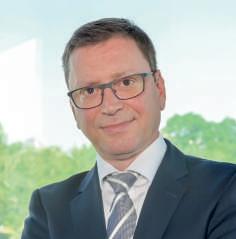
32 NIKOLAOS
SLIOUSAREGKO
President of the Management Board of the Hellenic Business Association of Serbia (HBA)
Working Well, with Room to Improve

35 MIRJANA RADIĆ Director, Inos Balkan Focused on Sustainability

36 PANAGIOTIS PITSIKOS
Ceo, Devise Engineering
Advanced Compact Wastewater Treatment in Serbia

38 STAMATELOPOULOS THEODOROS
EKO Serbia CFO
Strategic Growth and Financial Resilience
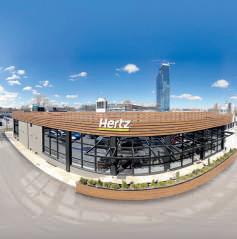



The economic and cultural partnership between Greece and Serbia is entering a new era of opportunity, strengthening bilateral ties and creating pathways for deeper cooperation
The relationship between Greece and Serbia is rooted in a long history of friendship and mutual support, reinforced by strong economic, political and cultural connections. As we look ahead, this partnership is evolving to meet the demands of a rapidly changing global landscape, with new avenues emerging for enhanced collaboration. Trade and investment are at the heart of this dynamic relationship. Greek businesses have been present in Serbia for over three decades, contributing significantly to various sectors, including

GREEK BUSINESSES HAVE BEEN PRESENT IN SERBIA FOR OVER THREE DECADES, CONTRIBUTING SIGNIFICANTLY TO VARIOUS SECTORS, INCLUDING HEAVY INDUSTRY, INFRASTRUCTURE, ENERGY, IT, AND FOOD PRODUCTION
heavy industry, infrastructure, energy, IT, and food production. At the same time, Serbian companies are making inroads into the Greek market, particularly through franchising and distribution in key industries such as cosmetics and sports equipment. With bilateral trade volumes steadily increasing and new investment opportunities on the horizon, the economic dimension of this relationship continues to expand.
A key area of focus is energy cooperation. Greece, as one of Europe’s leading producers of renewable energy, is playing a crucial role in Serbia’s ener-
gy diversification through projects like the Serbia-Bulgaria Gas Interconnector and its connection to TAP and the Alexandroupolis LNG terminal. As Serbia increases its consumption of liquefied gas and other energy resources, Greek companies are poised to provide expertise and investment in renewable energy, waste management and circular economy initiatives. Infrastructure and connectivity remain high on the agenda, with ongoing projects enhancing transport links between the two nations. The development of a high-speed railway connecting Bu-
dapest and Athens via Serbia, alongside improvements in highway infrastructure and the implementation of a unified electronic toll system, will facilitate smoother trade flows and movement of people. These advancements reinforce Serbia’s role as a key transit point for goods and services flowing between Greece and the rest of Europe.
Cultural and tourism exchanges continue to strengthen the people-to-people

connections that underpin this partnership. Greece remains one of the top travel destinations for Serbian tourists, while Serbia is keen to attract Greek visitors to Belgrade and other cities. The forthcoming EXPO 2027 event in Belgrade presents a unique opportunity to foster deeper collaboration in tourism, hospitality and real estate development, with Greek companies actively engaged in shaping this transformative project.
As Greece maintains its strong support for Serbia’s European integration, it remains a steadfast advocate for the Western Balkans’ EU accession process. The commitment of both nations to shared European values and economic cooperation underscores the strategic importance of this relationship for the wider region.
In the years ahead, the synergy between Greece and Serbia will continue to develop, offering new prospects for trade, investment and cultural exchange. With a solid foundation of trust and shared ambitions, the partnership is well-positioned to navigate future challenges and seize emerging opportunities in an increasingly interconnected world.
In many sectors that are a priority for Serbia – from agriculture and various segments of the processing, industry to services related to transport, logistics and IT – Greek companies offer advanced solutions
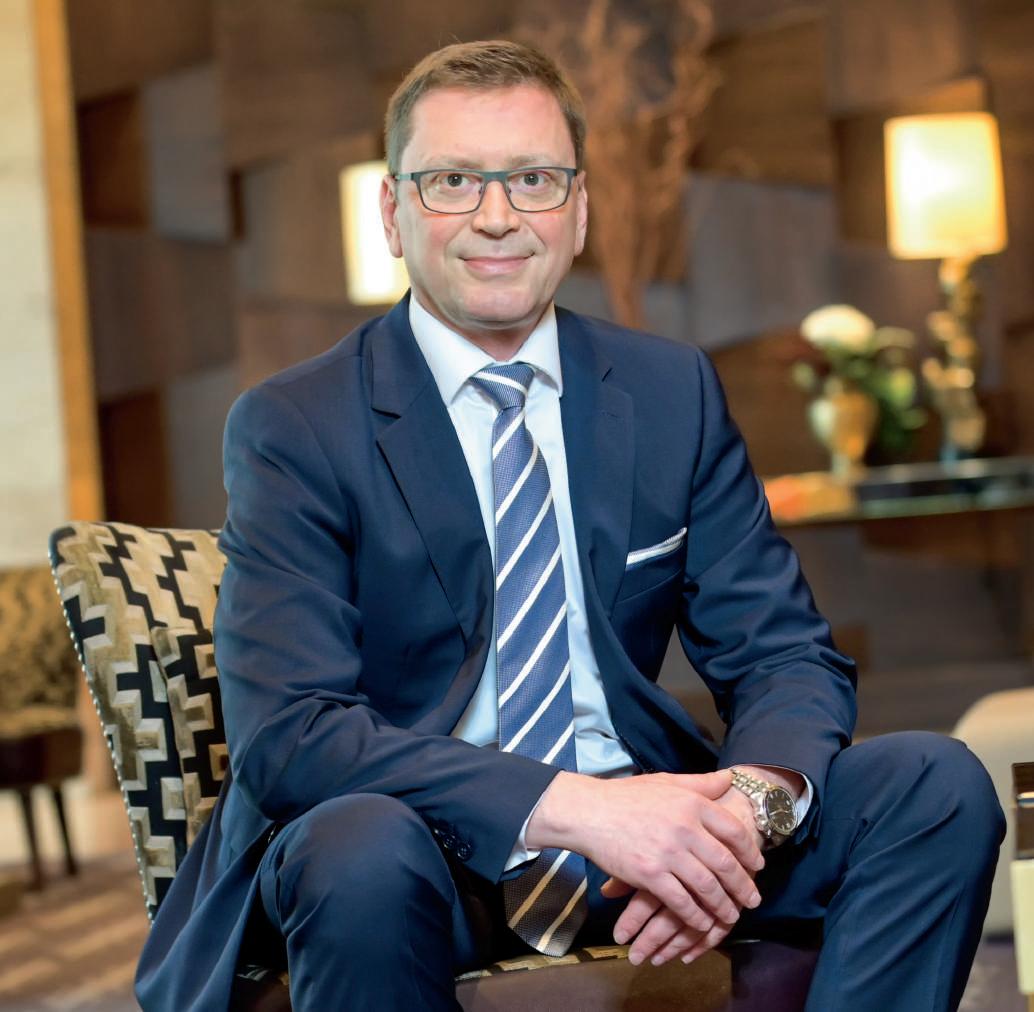
Greek companies have been among the pioneers of foreign investment around the Balkan region and have maintained a presence in Serbia for more than three decades. They operate across almost all sectors, particularly in hospitality, heavy industry, construction, recycling, petroleum trade, tourism, telecommunications and food and beverage retail, among others.
Speaking in this interview, HBA Management Board President Nikolaos Sliousaregko highlights the fact that Serbian companies have been achieving business success in Greece over recent years, through franchising and distribution in sectors like cosmetics, sportswear and equipment.
“The past year has been successful for our members, as we have seen an increase in sales and services. However, trade between Serbia and Greece has not yet achieved its full potential and there are numerous opportunities to further develop bilateral cooperation,” says Sliousaregko.
Which key sectors do you see as having the greatest potential for future investments and the deepening of business relations, in light of current global economic challenges?
—There is significant room for new Greek investments, as well as joint ventures with local companies across various sectors – from agriculture and different segments of the processing industry, to services related to transport, logistics and IT.
A key advantage for new investments in joint production is the opportunity to export to third markets, facilitated by Serbia’s free trade agreements with China, the UAE and Egypt.
The energy sector also has strong potential for further economic cooperation. The Greek energy industry is focused primarily on renewable energy sources, particularly solar and wind power. At the same time, Serbia is consuming increasing amounts of liquefied gas and other energy resources. Given that Greece has developed new terminals and expanded its gas supply capacities, it can play a significant role in diversifying Serbia’s energy sources. In this regard, an influx of new Greek investments could come from this very sector.
Greek companies’ expertise could also be applied across multiple areas of the energy industry, including circular economy initiatives, wastewater treatment, environmental protection and biodiversity conservation.
This year marks the 25 th anniversary of the Belgrade Economic Forum, which has served as a vital platform for dialogue and economic
cooperation for over two decades. Given the Hellenic Business Association’s longstanding support and engagement, how would you assess the forum’s role in strengthening bilateral economic relations?
— The Hellenic Business Association of Serbia is pleased to support the Forum, which is organised by TGI Group, one of our esteemed members, in cooperation with the Delphi Economic Forum.

EXPO 2027 presents an opportunity to strengthen Greek-Serbian collaboration in the construction and hospitality sectors through new joint projects
Enhancing transport infrastructure and introducing a unified toll collection system will further improve connectivity and movements of goods and people between Serbia and Greece
With Serbia relying increasingly on liquefied natural gas, Greece – which is equipped with new terminals – can contribute to energy diversification. This sector thus has strong potential for new Greek investments
First established in 2001, the Forum has served as a platform for dialogue, exchanges of information and the sharing of ideas that contribute to development and prosperity – not only for Serbia, but across the entire region –for 24 years.
Beyond the frequent participation of representatives of the Greek business community as speakers and panellists, the fact that the Forum is organised by a successful Greek company undoubtedly enhances the reputation of our Association, while also promoting Greek-Serbian economic relations.
Infrastructure investments, regional cooperation, digitalisation, workforce development and the application of innovations have been highlighted as key factors for advancing the region’s transport and logistics sector. Given Greece’s strategic position and its role as a key player in regional connectivity, what potential do you see for deeper cooperation between Greece and Serbia in these sectors?
— The enhancement of cooperation between our countries in these sectors is already well underway. The implementation of the agreement on a unified electronic toll collection system will undoubtedly facilitate the faster and smoother transport of goods and movements of people between our nations – especially considering the fact that 10,000 vehicles enter Greece from Serbia during the summer months.
Furthermore, Serbia has in recent years completed its motorway sections of Pan-European Corridor X towards Greece with the construction of modern highways, which is highly significant from an economic standpoint. The high-speed railway connecting Budapest and Athens via Serbia is also crucial, as it will serve as the backbone of rail transport in the Western Balkans, providing an outlet for all countries of the region towards Central and Western Europe.
During last December’s visit of Serbian Foreign Minister Marko Đurić to his Greek counterpart, Giorgos Gerapetritis, a Memorandum of Understanding was signed between the two foreign ministries. On that occasion, the two ministers
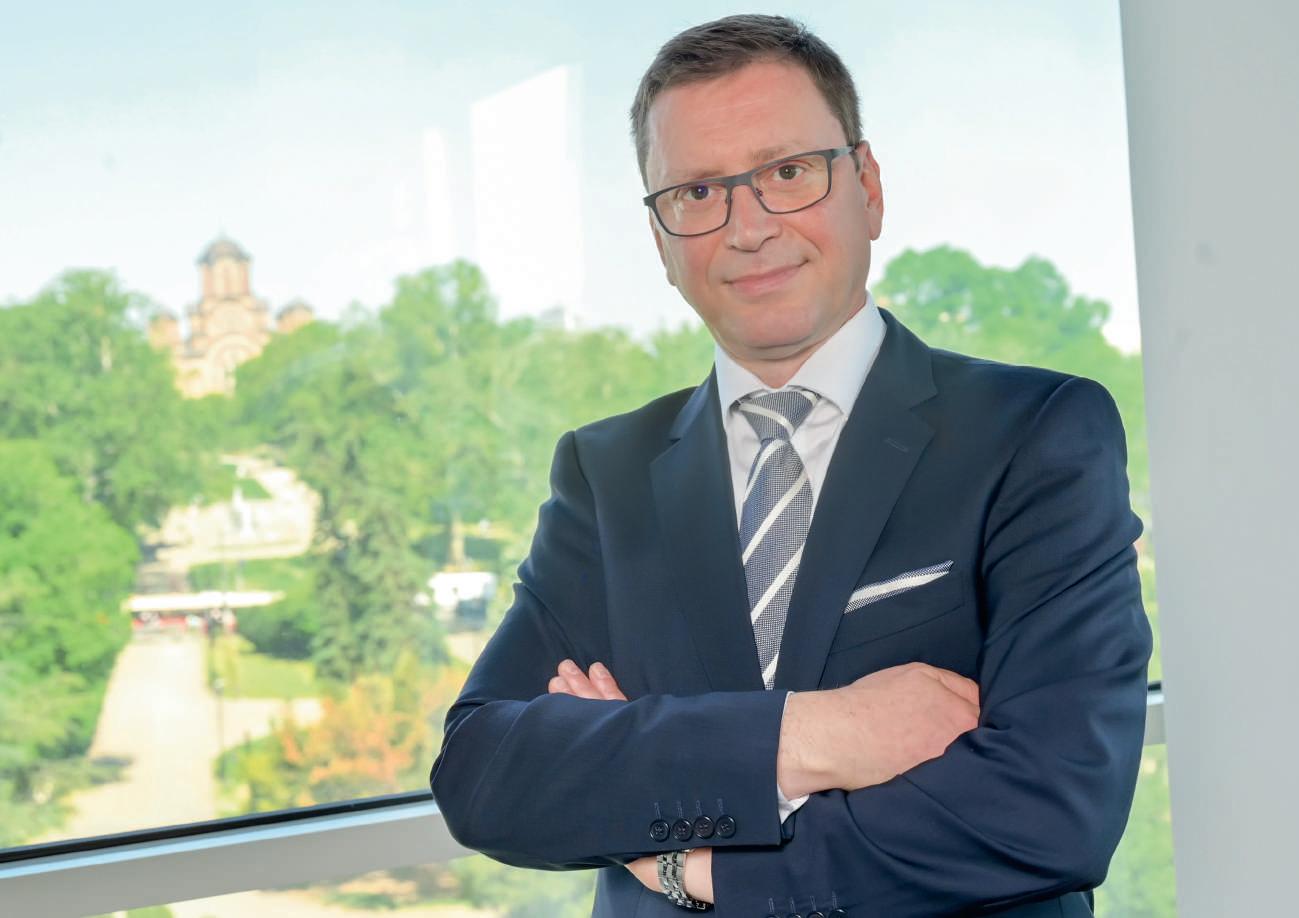
reaffirmed their mutual commitment to the development of new transport corridors that will strengthen road infrastructure links between the two countries.
Joint investments in industry, transport, IT and energy hold great potential, particularly with the opportunity to export to third markets facilitated by Serbia’s free trade agreements with China, the UAE and Egypt
What specific initiatives or joint projects could further enhance cooperation between our countries?
— A key segment of our bilateral cooperation is tourism, given that Greece welcomes a million Serbian visitors each summer. This is further reinforced by the fact that Greece was the partner
country of last year’s 45th International Tourism Fair in Belgrade.
At the same time, Serbia aims to attract a greater number of Greek tourists to Belgrade, as well as investors in the hospitality sector. EXPO 2027 presents an excellent opportunity to achieve these goals. Greek companies in Serbia are highly active in the construction sector and have been responsible for numerous projects that are of national and public interest. In this regard, Greece sees the continuation of this cooperation as a possibility within the EXPO 2027 project.
Moreover, Greek hospitality in Serbia is well established and holds prestigious status through the operations of the Laskaridis and Daskalantonakis groups, represented by Hyatt Regency Belgrade and Metropol Palace, as well as IN Hotel and Kopaonik’s Hotel Junior. Further joint projects in this sector could also be implemented through EXPO 2027, in line with expectations that a significant number of new hotels will be built ahead of the event.
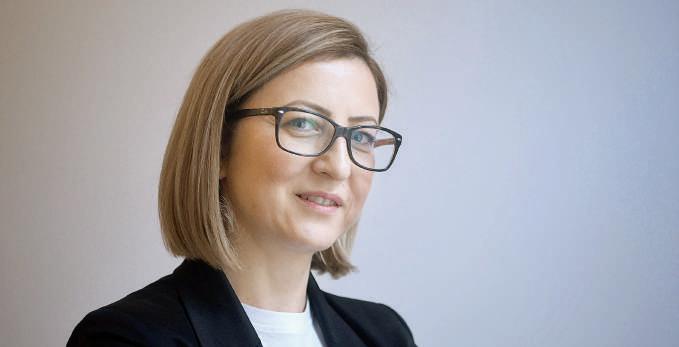
The synergy between our internal standards and the support we receive from the economic landscape allows us to set benchmarks for others in the industry ~ Mirjana Radić
Sustainability is at the core of the company's strategy. This commitment is reflected in continuous investments in advanced technologies, employee development, and responsible resource management. By adhering to the principles of the circular economy and responsible procurement, Inos Balkan sets high industry standards and actively contributes to environmental preservation.
Your commitment to ethical practices has earned you the trust of clients, suppliers and stakeholders generally. Has this been key to securing your position as a market leader?
— Our commitment to ethical practices has indeed been crucial in gaining the trust of all stakeholders. We firmly believe that transparency and adherence to high business standards form the backbone of any successful enterprise. This approach has enabled us to build longstanding relationships with our clients and suppliers, ultimately leading to our position as a leader of Serbia’s metal recycling sector.
We are currently implementing due diligence procedures for a sustainable supply
chain as one of the main objectives of our group. We have also introduced a responsible sourcing procedure, further ensuring ethical and sustainable operations across our entire procurement network.
Does the business environment work in to your advantage?
— Setting high standards in compliance, transparency and innovation is a key part of our strategy for continuous growth and development. The business environment in Serbia provides support through various initiatives and programmes aimed at fostering innovation and sustainability. The synergy between
By setting high standards in areas like compliance, transparency and innovation, Inos Balkan is enhancing its operations while also establishing benchmarks for others in the metal recycling sector
our internal standards and the support we receive from the economic landscape allows us to set benchmarks for others in the industry.
Our company has also implemented numerous codes and policies, including the Business Code of Conduct, the Business Partner’s Code of Conduct Energy, the Labour and Human Rights Policy, the Energy and Climate Change Policy, the Sustainability Policy and others. These policies further reinforce our commitment to sustainable and responsible operations, setting an example for other companies in the industry.
Do you also consider investment in knowledge, industries, technologies and personnel as the most valuable investment?
— We absolutely agree that investment in new knowledge, technologies and personnel is fundamental to lasting success. We invest continuously in the training and development of our employees to ensure that we have the most highly qualified team in the industry. To achieve this, we utilise SuccessFactors as a tool for human resource management and workforce development, enabling us to monitor and enhance the skills and competencies of our employees efficiently.
How will the five megatrends shaping the modern world impact the principles of the circular economy in the future?
— These megatrends – urbanisation, climate change, technological advancement, demographic shifts and globalisation – will have a significant impact on the principles of the circular economy. We believe that the circular economy will become even more important in the future, as a response to these trends.
Our company is committed to implementing circular economy principles and waste management through various initiatives, including resource efficiency monitoring and reporting, optimising and increasing the use of secondary raw materials to reduce dependence on primary resources, and applying circular economy principles with a focus on waste minimisation, recycling and the development of new technologies that enable minimal waste generation.
DEVISE ENGINEERING has managed to remain a leading technology provider despite strong competition, by developing innovative solutions for environmentally sustainable water and wastewater treatment
Our vision for the next 25 years is to remain at the forefront of environmental technology, making a meaningful impact on global water security and sustainability, says DEVISE ENGINEERING CEO Panagiotis Pitsikos, with whom we discussed new technologies, innovations, R&D investments, trends and regulatory requirements.
DEVISE ENGINEERING was founded over two and a half decades ago, with the mission of designing and engineering environmental projects. Would it be fair to say that your company was one of the pioneers in this field at the time?
— When the company was founded over 25 years ago, environmental sustainability and advanced water treatment solutions were still emerging as critical priorities globally. Recognising the growing need for innovative and efficient wastewater treatment, desalination and waste-to-energy systems, DEVISE ENGINEERING positioned itself at the forefront of the industry.
From the very beginning, we focused on designing and engineering compact, modular and efficient solutions able to address environmental challenges while being cost-effective and easy to deploy. Over the years, we have refined our technolo-
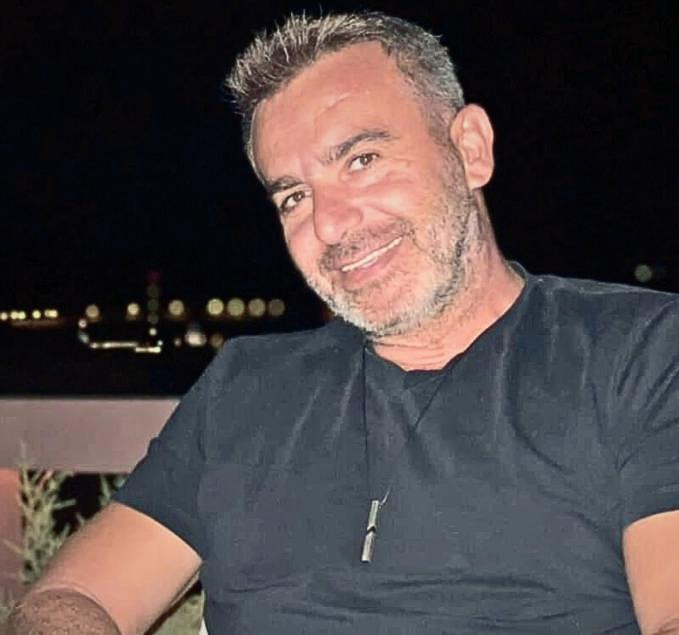
gies continuously, adapting to the evolving needs of industries, municipalities and remote locations worldwide. Our expertise and commitment to innovation have allowed us to remain a key player in this field, delivering reliable and sustainable environmental solutions.
Would you say that technology and innovation are the key driving forces behind your success?
— We recognised from the beginning that traditional treatment methods were often
inefficient, costly and difficult to implement in certain environments. That’s why we focused on developing cutting-edge, modular and energy-efficient solutions tailored to the specific needs of industries and municipalities.
Our approach is based on three main pillars:
1. Advanced Engineering & Modular Design – we specialise in packaged, plug-and-play systems that are easy to install, require a minimal footprint and can be deployed rapidly
in remote or spatially constrained locations.
2. Automation & Smart Monitoring
– we integrate IoT-based monitoring, AI-driven process optimisation and remote-control capabilities into our systems, ensuring their efficient operation and predictive maintenance, as well as cost savings for our clients.
3. Sustainability & Energy Efficiency
– our solutions emphasise low energy consumption, water reuse and waste-to-energy technologies, helping industries and municipalities achieve their environmental and economic goals.
By investing consistently in R&D, new technologies and sustainable practices, we stay ahead of industry trends and regulatory requirements, allowing us to provide reliable, high-performance solutions that address real-world challenges. This commitment to innovation has not only helped us maintain a competitive edge, but has also reinforced our reputation as a leading technology provider in the environmental sector.
DEVISE ENGINEERING has spent 25 years working to improve environmental performance and preserve natural resources. Do you believe that the next 25 years will bring even greater challenges, given increasing negative environmental impacts?
— Yes, I firmly believe that the next 25 years will bring even greater challenges due to the increasing pressure on natural resources, climate change, population growth and industrial expansion. However, these challenges also present opportunities for innovation, sustainable development and transformative solutions in water and wastewater management.
Looking ahead, the need for efficient water reuse, circular economy practices and carbon-neutral technologies will be more critical than ever. Some of the key challenges we foresee include:
• Water Scarcity & Quality – freshwater sources are under increasing stress, making desalination and water recycling essential for sustainable development.
• Stricter Environmental Regulations – governments worldwide are tight-
ening environmental standards, requiring industries to adopt more efficient and compliant wastewater treatment systems.
• Energy-Efficient Solutions – the focus on low-energy and carbon-neutral treatment technologies will increase as industries seek to minimise their environmental footprint.
• Digitalisation & Smart Water Management – the integration of AI, IoT and data-driven decision-making will play a crucial role in optimising treatment processes and resource management.
At DEVISE ENGINEERING, we are fully committed to addressing these future challenges through continuous research, development and innovation. We believe that – by leveraging technology, sustainability and smart engineering –we can create solutions that not only preserve natural resources, but also help industries and communities adapt to the evolving environmental landscape. Our
Looking ahead, the need for efficient water reuse, circular economy practices and carbonneutral technologies will be more critical than ever
vision for the next 25 years is to remain at the forefront of environmental technology, making a meaningful impact on global water security and sustainability.
Does DEVISE ENGINEERING currently have a presence and partnerships in Serbia?
— Yes, we have an office in Leskovac. However, mainly for Serbia and the broader Balkan region, and primarily for the ex-Yugoslav countries, DEVISE ENGINEERING has an established partnership with NITES, a Belgrade-based company with an outstanding project management track record.
NITES is deeply involved in environmental and infrastructure projects, bringing valuable expertise in implementation, regulatory compliance and
local market dynamics. Our collaboration ensures that advanced wastewater treatment, desalination and waste-to-energy solutions are efficiently deployed to meet the region’s growing environmental challenges.
This partnership allows us to deliver high-quality, tailored solutions to industries and municipalities across the Balkans, supporting sustainable development and compliance with European environmental standards.
DEVISE ENGINEERING took part in last year’s Serbian-Greek Business Forum. Would you say that such events provide a valuable opportunity to meet with Serbian companies and the relevant authorities in the field of environmental protection, facilitating discussions on potential synergies and partnerships?
— Absolutely. Such events serve as a platform for knowledge exchanges, collaboration and strategic partnerships, allowing companies like ours to showcase innovative solutions while also understanding the specific needs and regulatory landscape of the Serbian market. Given the increasing focus on sustainable water management, wastewater treatment and circular economy initiatives, engaging with local stakeholders, municipalities and industries is essential for identifying mutually beneficial projects.
Moreover, Serbia and the broader Western Balkan region are investing actively in environmental infrastructure, aligning with EU standards and sustainability goals. DEVISE ENGINEERING, with its expertise in modular and energy-efficient water and wastewater treatment systems, is well-positioned to support these efforts by providing turnkey solutions that address the region’s challenges in terms of water scarcity, pollution control and resource recovery.
We believe strongly that business forums and bilateral cooperation play a key role in building long-term partnerships, fostering innovation and driving progress in the environmental sector. Moving forward, we will continue to engage in such initiatives to expand our presence, contribute to sustainable projects and support Serbia’s environmental goals.
EKO
Looking ahead, our commitment to modernisation, quality and sustainability will ensure that EKO Serbia remains a trusted partner of consumers and businesses for years to come ~ Stamatelopoulos Theodoros.
What began as the vision of a developing company has now become a reality: EKO Serbia is today synonymous with reliability and quality. Would you agree that this has been achieved through continuous investment in new services, both then and now?
— Absolutely! From the very beginning, our vision has been to establish EKO Serbia as a trusted leader in the fuel industry, known for quality, reliability and innovation. This has been achieved through strategic investments in infrastructure, customer service expansion and modernisation projects, enabling us to evolve with market demands while maintaining our core values.
A key focus of our investment strategy is the rebranding and modernisation of our petrol stations, transforming them from traditional fuelling points into comprehensive service hubs. We are additionally continuing to enhance our premium fuel offerings, car wash facilities and EKO Smile loyalty programme, ensuring that every visit provides our customers with added value.
Is tracking consumer habits key to redefining the concept of filling sta -
tions? Today’s consumers expect EV chargers and new services like parcel lockers, rest areas, cafés, restaurants etc. How is EKO Serbia responding to these evolving demands?
— Understanding and adapting to consumer behaviour is essential for today’s dynamic market. Customers now expect convenience, efficiency and a more holistic service offering, which is why EKO Serbia is investing in redefining the petrol station experience.
We have introduced EV charging services at five sites, with two more set to launch soon, aligning with the global transition towards sustainable mobility. Additionally, parcel lockers allow customers to easily send and receive packages, providing an added level of convenience.
A major part of our transformation is the expansion of the gastro minimarket concept, featuring Kalypso Café, which brings a premium food and beverage experience to our stations. EKO petrol stations have become destinations where travellers can relax, refuel and refresh before continuing their journey.
Your goals include expanding your market presence, diversifying revenue sources, creating sustainable value and carefully managing risks. Is achieving a AAA credit rating also among your key objectives?
— Achieving a AAA credit rating is a significant milestone for EKO Serbia, and we are proud to have earned this recognition. It reflects our strong finan -
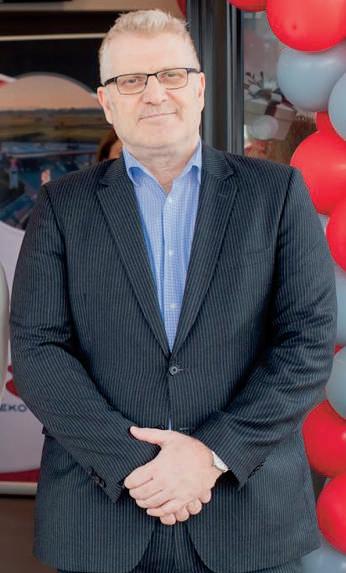
cial position, operational efficiency and commitment to long-term sustainable growth.
We focus on ensuring long-term profitability through prudent financial management, operational efficiency and strategic investments. By maintaining strong financial discipline, optimising costs and diversifying revenue streams, we enhance our resilience on an ever-changing market.
As part of our green economy vision, we are advancing the installation of PV panels across seven petrol stations and at our head office. We laid the groundwork for implementation back in 2024, and in 2025 we aim to begin installations, prioritising high-energy-consumption locations. This initiative will reduce our environmental footprint while delivering economic benefits.
Beyond our financial performance, we are investing in sustainability and community engagement. This includes environmentally friendly initiatives, energy-efficient infrastructure and CSR programmes that benefit local communities. By maintaining this strategic balance, EKO Serbia continues to build a resilient, future-ready company that thrives in a business landscape that’s evolving constantly.
“We’re here to get you there” is the slogan of renowned company Hertz, which has been operating in Serbia as part of the Autohellas Group since 2010. From the very outset, the Hertz offer has included full service operating leasing, which has become the first choice for many businesses

Globally renowned as a car rental company, Hertz provides more than just daily rentals in Serbia, with its services also including Monthly Rental, Flex Drive and full service Operating leasing allowing customers – whether businesses or individuals – to rent vehicles for several months, or even years, at a time.
As part of the Autohellas Group, which has been the undisputed leader of the Greek automotive sector since 1974, Hertz goes beyond traditional car rental services. As a franchisee of a globally leading car rental brand that has over a century of experience, we are committed to upholding the highest standards in every aspect of our operations.
In Serbia – like many other markets –businesses often seek to maintain a versatile fleet of new vehicles. However, such an investment isn’t always financially viable or desirable for everyone. Both, companies and private individuals can today benefit from long-term rental solutions that are tailored to their needs. Thanks to our experience and flexibility, we are able to meet nearly all client requirements, even those beyond standard offerings.
Daily car rental and long-term rental, full service operating leasing, remain at the core of our business. This leasing model enables customers to drive the vehicle of their choice through a long-term rental agreement tailored to their individ-
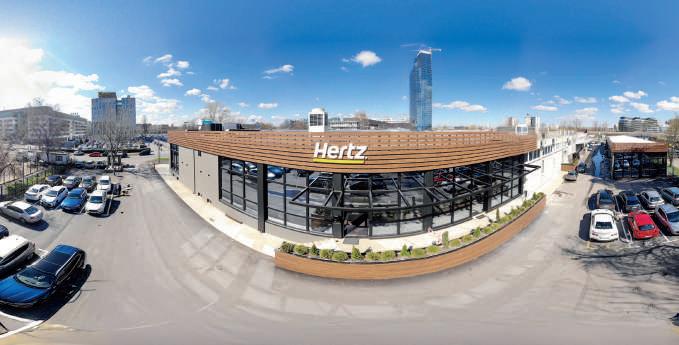
ual needs. Available to both private and corporate clients, many prefer this option over purchasing a car on credit, as the lease term can be shorter than a loan repayment period. Once the lease expires, customers can either extend the contract or choose a different vehicle, providing them with greater flexibility and ensuring they aren’t tied to a one vehicle that may no longer suit their needs.
Full service operating leasing offers significant advantages over financial leasing,
Hertz has built its unique market position by providing mobility solutions tailored to client needs, whether through brand-new vehicles or high-quality, pre-owned vehicles from its fleet
where customers pay off the vehicle’s value in instalments. With operating leasing, contracts are generally shorter and there is no requirement for an upfront payment. Hertz’s full-service operating leasing package includes servicing, repairs, insurance, roadside assistance, tyre replacement and vehicle registration – all consolidated into a single monthly invoice. This approach delivers substantial time and resource savings, making fleet management simpler and more efficient.
Hertz has built its unique market position by providing mobility solutions tailored to client needs, whether they require brand-new vehicles or high-quality, preowned vehicles from the Hertz fleet.
With the slogan “We’re here to get you there”, our focus is on personalised services, flexible flexible operating leasing leasing terms and cost efficiency – all of which set us apart from the competition.
In addition to long-term rental, Hertz also offers daily and monthly rental options, covering the full spectrum of mobility needs.

As the world’s leading travel destination, Europe continues to refine its tourism strategies, with Greece playing an active role in shaping its future
At the Destination Europe Summit 2025, held in Brussels in February, representatives from Greece’s National Tourism Organisation (GNTO) met with European tourism ministers, leading travel executives, and policymakers to discuss the next phase of sustainable tourism growth across the continent.
Organised by the European Travel Commission (ETC), the summit served as a platform for key stakeholders to as-

sess Europe’s strengths and challenges within the global travel market. Participants underscored the importance of sustainability, digital transformation, and regional tourism development—crucial factors that will influence how destinations attract and manage visitor flows in the years ahead.
The GNTO’s Secretary General, Andreas Fiorentinos, represented Greece at the summit, engaging in high-level discussions with EU Commissioner for

GREECE ASPIRES TO REMAIN AT THE FOREFRONT OF TRAVEL INNOVATION, SETTING A BENCHMARK FOR OTHER DESTINATIONS SEEKING TO BALANCE ECONOMIC SUCCESS WITH ENVIRONMENTAL RESPONSIBILITY
Sustainable Transport and Tourism, Apostolos Tzitzikostas, and other prominent tourism leaders. Their dialogue
centred on Greece’s strategic vision for tourism and how the country can collaborate more closely with European institutions to foster innovation, economic sustainability, and competitive destination branding.
With Europe maintaining its position as the world’s most-visited continent, tourism executives at the summit

stressed the need for a more cohesive approach to marketing the region.
Discussions focused on positioning Europe as a year-round travel destination, with an emphasis on mitigating seasonal tourism fluctuations. Delegates explored strategies for developing cross-border travel experiences, encouraging visitors to extend their stays and explore multiple destinations in a single trip.
European tourism leaders agreed that sustainability remains a fundamental aspect of future tourism growth. Commissioner Tzitzikostas outlined a new EUwide strategy aimed at balancing tourism development with environmental responsibility. The framework includes initiatives to tackle over-tourism, promote eco-friendly travel options, and integrate smart technology into visitor experiences.
For Greece, sustainability is already a top priority. Fiorentinos reaffirmed the country’s commitment to implementing
sustainable tourism projects, including infrastructure improvements supported by the EU Recovery and Resilience Facility. He highlighted upcoming developments, such as Greece’s first comprehensive digital travel platform, designed to streamline trip planning and enhance visitor engagement.
Greece’s active participation in the summit underscores its increasing influence in shaping European tourism strategy. Fiorentinos held side meetings with key figures, including ETC CEO Eduardo Santander, Bulgarian Tourism Minister Miroslav Borsosh, and Booking.com’s Global Head of Public Affairs, Peter Lochbihler. These discussions focused on best practices in destination marketing, investment in tourism infrastructure, and opportunities for regional cooperation.
Fiorentinos outlined Greece’s longterm vision for tourism, stressing that collaborative policies and innovative marketing strategies are essential to maintaining the country’s global ap -
peal. He noted that Greece has already begun enhancing digital tourism services, aiming to provide travellers with smarter, more convenient ways to explore the country.
AND TOURISM MARKETS
The outcomes of the Destination Europe Summit 2025 are expected to shape global travel trends, particularly in how Europe positions itself for international visitors. As the continent refines its strategies, long-haul travellers from North America, China, and the Gulf region can anticipate seamless multi-country travel experiences, more personalised digital travel services, and a
FOR GREECE, THESE DEVELOPMENTS MARK THE BEGINNING OF A NEW PHASE OF TOURISM
THAT PRIORITISES QUALITY OVER QUANTITY AND ENSURES THAT BOTH VISITORS AND LOCAL COMMUNITIES BENEFIT FROM A WELL-MANAGED TOURISM ECONOMY
stronger emphasis on sustainable tourism practices.
For Greece, these developments mark the beginning of a new phase of tourism growth—one that prioritises quality over quantity and ensures that both visitors and local communities benefit from a well-managed tourism economy. Through continued collaboration at the European level, Greece aspires to remain at the forefront of travel innovation, setting a benchmark for other destinations seeking to balance economic success with environmental responsibility.

Zoran Marinković CEO, ZWEBB Fintech
Much has changed in terms of Fintech’s positioning in Serbia and the region, but still not enough, says ZWEBB Fintech CEO Zoran Marinković
e spoke with ZWEBB CEO Zoran Marinković about the position of Fintech companies in our market – still predominatly banks – the future of the industry, the impact of artificial intelligence on the financial sector and the investment potential of the GCC region.
Many accolades confirm the quality of your products and commitment to Fintech development, the most recent being the Excellence in Finance SaaS award from the FiNext conference. What sets you apart from the competition?
— I believe the jury was guided by the fact that our products are used by a variety of financial companies and organisations across different parts of the world. In our motivation letter, we highlighted clients from Sweden, Germany, Malta, Mauritius, Mexico and Saudi Arabia. The essence of the FiNext conference is internationalisation and the exchange of Fintech experiences between countries, so I believe we fit perfectly into this concept here in Dubai.
Could it be said that your presence in the Gulf countries—Saudi Arabia, Bahrain, and the UAE—also contributed to winning the award?
— The GCC (Gulf Cooperation Council) region boasts the world’s strongest investment potential, which was certainly an additional advantage. Understanding this market, as well as ensuring smooth communication with clients from the Gulf countries, is undoubtedly valuable. However, it’s also impor-

tant to note that the final decision on award winners is made by the FiNext conference leadership in the United States, not locally in the Emirates. The investment potential of the GCC region is almost unparalleled, but it must be understood that investments and capital are allocated exclusively to exceptional conceptual solutions and projects.
How would you assess the current state of the Fintech industry and the financial sector in general?
— There is a great deal of hype around AI – too much, in fact. I addressed this at the conference and in interviews. Of course, artificial intelligence has a place in Fintech
and the financial world. We are well aware that AI will help create useful services and tools for data analysis, transaction monitoring and other financial operations. However, AI cannot drive the Fintech innovations that the financial sector truly needs.
For instance, you cannot fully rely on AI-generated risk assessments for potential investments, because the data sources required for a high-quality AI process are still very limited worldwide. This will not change significantly over the next five years, so I believe it is better to remain focused on Fintech for now, and to only discuss AI when the conditions for its effective use are in place.
As for the traditional financial sector, I see banks here still sticking to their classic approach, while Revolut and neo-banks are irreversibly attracting clients and gaining market share.
The biggest Fintech expansion is yet to come?
— To be honest, the Fintech era in Serbia has not even begun. It appears that the banking lobby still firmly controls the legal framework, preventing Fintech companies from fully entering our market. A positive example is Yettel Bank, with its innovative, e-banking system, also the existence of the national payment card “Dina”, which secures country’s financial independence. Only a handful of nations in the world have that opportunity. There is also a top-class Fintech conference every May in Belgrade – Finticipate, which I warmly recommend. The real Fintech era will begin when platforms are introduced that allow for the seamless and automated financing of small and medium-sized enterprises by local private investors. That is what truly fosters inclusivity and prosperity, not banks and casinos.
Ivan Đolić BE-terna Managing Director
In an era in which digital transformation, AI and analytics are shaping the future of business, BE-terna remains committed to developing solutions that deliver tangible value
With a strong focus on digitalisation and business process optimisation, BE-terna helps companies adopt the latest technological solutions and thus gain a competitive edge. We spoke with BE-terna MD Ivan Đolić about digital solutions, the role of AI, and the future of business technologies.
BE-terna is recognised as one of the leading companies in the implementation of business solutions. What are your key products and services, and what sets you apart?
— What truly sets us apart on the market is our comprehensive approach to providing a complete portfolio of solutions for successful business management. Rather than focusing solely on individual products, we offer integrated solutions that cover all key aspects of operations.
Our portfolio includes business process optimisation and the implementation of advanced systems like Enterprise Resource Planning (ERP), Customer Relationship Management (CRM) and Business Intelligence (BI), all enhanced by the latest advancements in AI.
Our goal is not just to implement technology, but to create long-term value for our clients.
Your company has been present and developing business solutions in Serbia for 22 years. What are your proudest achievements; and how do they shape your future development?

— I am proud that BE-terna continues to set industry standards for the markets where we operate, particularly in Serbia and the Adria region. We are currently making significant strides in artificial intelligence, which isn’t only shaping our own development, but is also transforming the way businesses operate.
Our mission is to enable clients to better utilise the data they already possess and transform it into actionable insights that impact business growth directly.
As the head of an IT company, I believe it is essential to recognise these trends and integrate them into business operations strategically – through continuous investment in knowledge, AI technology development and the adaptation of business models that place AI at the core of innovation.
BE-terna collaborates with companies across various industries. How do tech-
nologies like AI and analytics help your clients improve their operations?
— BE-terna operates across a wide range of industries, offering comprehensive solutions for digitalisation and business optimisation. Our client portfolio includes companies from sectors such as manufacturing, retail, distribution, financial services, the public sector and many others.
A key innovation I would highlight is our machine learning platform, ALISA AI (Automated Logistics & Intelligent Supply Chain Assistant), designed for sales forecasting and inventory optimisation. ALISA enables companies to make data-driven decisions, reducing risks and costs while enhancing the customer experience. I believe technologies like these are transforming businesses and setting new industry standards.
BE-terna is organising the Retail Horizons conference in late March. What key topics will you emphasise and how do you expect this event to contribute to the retail industry’s development?
— That’s right—BE-terna hosts the Retail Horizons event on 27th March, focusing on the future of retail and digital innovation. This event is of great importance to the retail industry, as it will showcase the latest trends and technologies shaping the sector’s future.
We will highlight AI in Retail, Omnichannel Experiences, Analytics & Big Data, as well as Sustainability in Retail. The event will also bring together leading figures from the retail industry, providing a platform to exchange knowledge and best practices. Participants will gain insights into the ways top companies tackle key challenges and drive innovation in their businesses.
Rajka Šinik Vulić Director of RBS Belgrade
RBS Belgrade has established itself as a key player in the development of business education around the region, offering high-quality programmes that are recognised internationally and respond to contemporary business challenges. Through the introducing of an MBA programme in Serbian, this school is further expanding its mission, enabling a broader group of professionals to earn a prestigious degree and advance their careers
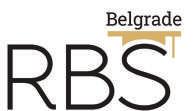
ere we speak with RBS Belgrade Director Rajka Šinik Vulić about this institution’s role in advancing business education around the region, as well as the trends shaping the future of executive education.
HRBS Belgrade is entering its fifth year of operations in Serbia and the region. How would you assess the school’s development so far and what is the vision for its future?
— RBS Belgrade has become recognised as an outstanding business school over the past few years, focused primarily on educating senior managers. It has managed to establish itself in the country and the region in a relatively short period, attracting experienced professionals and leaders from various industries. Our goal from the very outset has been to offer programmes that combine expertise with practical application, while keeping pace with the latest trends and changes to the business environment, both globally and locally. We have received strong support in this endeavour from our partners at Rome Business School in Italy, while in the coming period we plan to strengthen our existing programmes further and introduce new ones, in line with market trends.
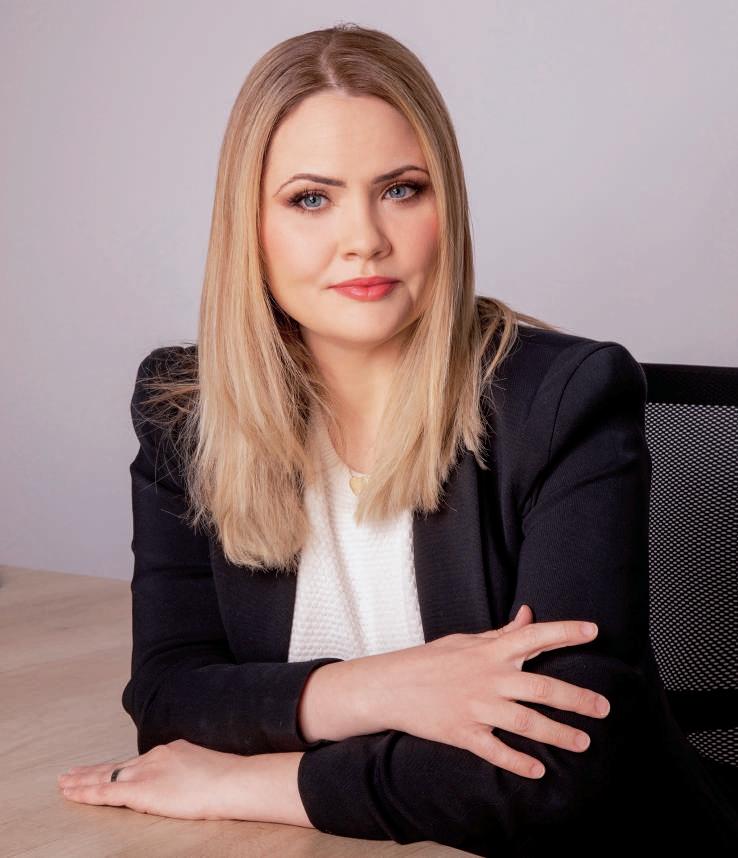
Your Executive MBA programme stands out for its quality and the expertise of lecturers. What distinguishes it from other programmes on the market?
— Our Executive MBA is designed for experienced managers who wish to enhance their skills through an interactive, practical and internationally recognised programme. Its uniqueness lies in its learning methodology, which is based on real business challenges, case study work and first-hand insights from global industry experts.
You are introducing an MBA programme in Serbian as of 10th April this year. What are the key differences compared to the Executive MBA?
— In short, the Executive MBA is for managers who are already in leadership positions and want to enhance their strategic and leadership capabilities while continuing to work, whereas the MBA is for pro-
RBS Belgrade is expanding its impact by introducing an MBA programme in Serbian, thus making high-quality business education more accessible to local professionals
fessionals looking to accelerate their career advancement and transition to managerial roles. There are also differences in terms of duration, number of modules and required experience. The Executive MBA is delivered in English, runs for 20 months, consists of 16 modules and requires a minimum of five years of managerial experience. The MBA in Serbian lasts one year, includes 10 modules and requires three years of work experience. However, both programmes share the same methodology and quality of modules, offering practical knowledge, international accreditation, dual degrees from Rome Business School and Valencia University and 60 ECTS credits.
How aligned are your programmes with market demands and modern business education trends?
— We strive continuously to ensure that our programmes are as aligned as possible with contemporary market needs, which is why we update them constantly, in response to changes to the business environment. We focus on topics like digital transformation, artificial intelligence applications in business, strategic leadership, innovation and entrepreneurship. We additionally place significant emphasis on practical application, both through case studies in modules and the Capstone Project, which allows participants to apply the knowledge they have acquired throughout the programme.
Does RBS Belgrade plan to expand and introduce new educational programmes?
— Absolutely. We monitor market needs continuously and aim to innovate existing programmes while also introducing specialised programmes that address current topics and requirements. In the future, we will continue focusing on digital transformation, artificial intelligence and the further development of soft skills. Besides our Executive MBA and MBA programmes, RBS Belgrade has long offered Executive Development and Custom-Made programmes, which allow for education on even more specific topics.
What are the most common motivational factors among participants enrolling in your MBA programmes?
— Motivation varies, but the most common reasons include the need to gain a broader understanding of business, professional advancement, career change aspirations, networking opportunities with professionals from various industries and obtaining qualifications that are recognised globally. Many of our participants come from companies that seek to enhance their managers’ capacities through lifelong learning.
How do you see the role of RBS Belgrade in advancing business education in Serbia and around the region?
— From the outset, we have been guided by the ambition to raise the standards of busi-
Aligning with market trends, RBS Belgrade integrates digital transformation, artificial intelligence and strategic leadership into its business education programmes
ness education and offer a programme that is relevant, internationally recognised and practically applicable. We believe that learning and acquiring new knowledge and skills is a lifelong process. That’s why we strive to provide up-to-date programmes with concrete skills and tools that help participants better understand the business environment and make timely and effective business decisions.
How does RBS Belgrade empower professionals not just to follow changes, but to anticipate them – from digitalisation to sustainable business practices?
— In today’s dynamic business environment, merely keeping pace with changes is no longer enough – leaders must have the ability to foresee and shape them. Our methodology combines analytical thinking, strategic planning and practical application, enabling participants to develop a proactive approach to managing change.
Through modules dedicated to innovation, artificial intelligence in business, strategic leadership and performance management in a sustainable manner, participants not only acquire knowledge of current trends, but also learn how to integrate them into their business models. We additionally place a strong focus on developing critical thinking and data-driven decision-making, which are essential in this era of digitalisation and sustainable business practices. We believe that education should not be passive, but rather stimulating, providing participants with the tools to recognise opportunities before they become obvious and to leverage them effectively in their professional environments.
Erich Cossutta President of the Danubia Group
Companies Dragon
Maritime, Log Max and Kombi Pro have now been operating for a full year under the umbrella of the Danubia Group, which represents one of the key players in the Balkans and Central Europe, explains Danubia Group President Erich Cossutta in this interview
When he decided to leave a successful family business at the end of the 1990s, Erich Cossutta knew that he needed to develop maritime, rail and road segments of the supply chain simultaneously. Thanks to his extensive experience, a team of excellent associates, clear visions and strategic thinking, he proved to be an excellent interlocutor on the topics of transport and logistics, digitalisation, AI implementation and expansion to new markets.
Danubia is a recognised market leader in maritime transport, rail transport and terminal operations. Apart from the Balkans and Central Europe, where else do you operate?
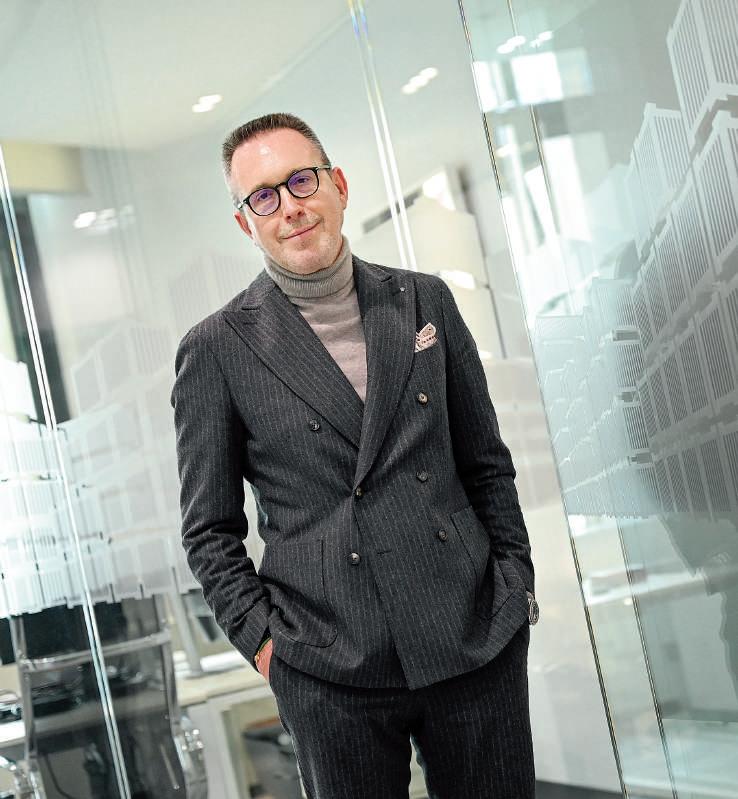
— Danubia is a holding group that owns companies that are market leaders in maritime and inland transport and terminal operations. We embarked on a major reorganisation of the group last year, so that now, under the umbrella of Danubia, we have Dragon, Log Max and Kombi Pro. We have consolidated around these three divisions everything that previously operated in a fragmented manner. Log Max now has the strongest presence in logistics and terminal operations, Kombi Pro focuses on rail trans-
port, and Dragon is our division responsible for maritime transport.
We operate in the Balkans and Central Europe, while we have traditionally had a presence in China and are now expanding into the Persian Gulf. We are looking at Saudi Arabia with great interest, due to the opportunities it presents, while we are also planning to enter the Indian market very soon.
Our goal is to control as many links in the supply chain as possible and to offer clients a service that encompasses the entire
chain. We’ve been investing more intensively in infrastructure over the past few years —both rail and terminals, as well as trucks—because we want to have everything under one roof. Intermediary services without tangible assets, which have been prevalent in our industry, will either gradually disappear or be significantly reduced over the coming years.
Your market position and business success stem from your belief in the power of unity and dedication to a singular strategy?
— I come from a family with a long history in this industry. We started in 1936 in Trieste, but in the late 1990s – with knowledge, experience and a clear vision of what I wanted – I decided to embark on my own journey. The concept of intermodality was only just emerging at the time, but I had always known that my goal was to control as many elements of the supply chain as possible, because managing just one segment provides no
For those of us in this industry, all these events have required extensive knowledge, experience, adaptability and improvisation to meet client demands. That’s why we believe that, in the near future, all companies will have to make strategic choices regarding their markets, deciding where to source their supplies and where to sell their goods. Geopolitical factors have forced us to reassess which destinations are more sustainable and more profitable for our businesses.
With proper planning, we should not face major disruptions over the next decade. The Western Balkans, Central Europe, Poland, Hungary and Serbia will likely become the preferred locations for major companies currently weighing up whether to continue investing in the Far East – where they could find themselves caught in a real physical or economic war – or to opt for closer and more stable markets.
From the perspective of, say, a German company, it is evident that its cargo is far more secure if it invests in a Balkan coun-
Germany’s new supply chain act, obliging large German companies to ensure human rights and environmental standards are respected across their supply chains, represents a great opportunity for our region
real strategic advantage. That’s why I developed the maritime, rail and road components of the supply chain simultaneously, leading to the successful integration we have today.
I strongly believe in teamwork. The individuals who once led separate systems are still with us, and they all work closely together. I take great pride in having turned many talented soloists into one outstanding orchestra.
How is increasing global turbulence shaping the transport sector’s role in global trade?
— When I reflect on recent years, I always picture a supply chain manager at a German company and everything they have had to deal with over the past seven or eight years. First came the blockage of the Suez Canal, then came the Covid-19 pandemic, followed by wars in Ukraine and the Middle East – not to mention the Houthis and various other complicating factors.
try than in opening a plant in China, from where shipments take 30 to 40 days to arrive. The logic is clear: we can transport cargo from Serbia to Stuttgart within 48 hours, the risks are minimal and the costs remain roughly the same as they were a decade ago.
Germany recently adopted a new supply chain act, which obliges companies that have over a thousand employees and headquarters in Germany to ensure human rights and environmental standards are respected across their supply chains. The objective of this law is to encourage companies to be more cautious in selecting their suppliers and to invest, where possible, in regions that have more transparent and sustainable supply chains, which is why I see in this development a great opportunity for our region.
Under your leadership, the Danubia Group has set sustainability standards for the sector?
— I believe the future of road transport will be limited to the first and last mile – most goods will be transported either by rail or by sea, while lorries will be used solely for transport between railway and maritime terminals and final destinations. For example, in the past, all cargo from the Port of Rijeka, which is Croatia’s main port, was transported to Serbia by road. It is today mostly moved by rail, while lorries are used only to deliver goods from the railway terminal to their final destination.
There is no need to elaborate on why rail transport is the better option – it runs on electricity, making it far less polluting than lorries, and a single train can transport significantly more cargo than a lorry.
What are your expectations when it comes to artificial intelligence, further digitalisation and automation?
— Digitalisation is crucial because clients want to operate in a digital environment with minimal telephone or traditional faceto-face contact. They want access to a platform that provides real-time insight into everything happening in transport and allows them to communicate with us directly. Reducing personal interactions increases efficiency and provides full visibility over the movement of their cargo.
Digitalisation will soon simplify and accelerate also customs clearance processes, which currently take one or two days, sometimes longer. Cargo currently waits, and although significant manual work is required, digitalisation will streamline and expedite these processes. Artificial intelligence will enhance analytics and help us operate more efficiently and swiftly. I don’t believe it will fundamentally change our business or reduce the number of employees, but it will ease workloads, improve forecasting and allow us to better anticipate our clients’ needs.
Customs automation has advanced significantly in China and the UK. Importers and exporters there apply directly to customs authorities for import or export declarations, and I believe we will soon see this system implemented across our region as well. Regarding digitalisation in the region, Serbia, along with Slovenia, is at the forefront of customs digitalisation, so I can say with confidence that we are on the right track.

”We
plan to invest around 20 million euros in the renewal of production lines”
Kathrine Decorzant General Manager of JTI Adriatica
Nestlé celebrates 20 years of success in Serbia, solidifying its role as a major contributor to the local economy. With an investment of around €160 million, the company has expanded its operations, employing over 900 people, with women making up half of the workforce. Its diverse product portfolio includes global favourites like NESCAFÉ and KitKat, alongside local household staples Začin C and Maggi. Nestlé’s Surčin factory stands as a benchmark for sustainability, implementing a zero-waste-tolandfill policy and recycling 65,000 litres of wastewater daily. This commitment to growth and environmental responsibility continues to shape Nestlé’s presence in Serbia.
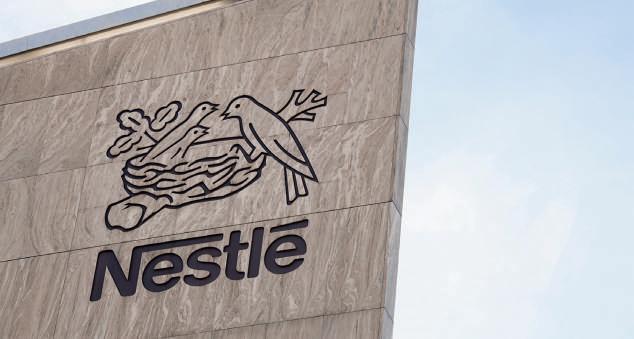
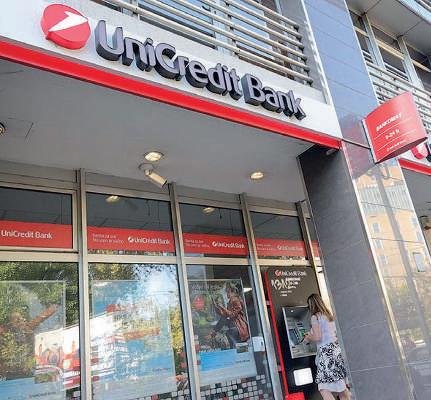
UniCredit was named the best bank for trade financing in Serbia for the eighth time in a row, according to the latest Euromoney survey. This study, which has been conducted annually for 14 years, collects the opinions of more than 13,500 companies and financial institutions, providing clear evidence of UniCredit’s trade finance expertise. With a blend of global expertise and local insight, UniCredit continues to lead the way in providing efficient and innovative trade finance services.
Coca-Cola HBC has been ranked as the most sustainable company in the beverage industry for the eighth consecutive year in 2024 by the Dow Jones classification. This ranking, formerly known as the Dow Jones Sustainability Index, is conducted by S&P Global, confirming the company’s global leadership in sustainability. Coca-Cola HBC AG, which includes Coca-Cola HBC Serbia, is dedicated to sustainable business practices, focusing on climate change and water resource protection. As a result, the company also secured a leadership position on the CDP list, earning a double A rating for climate and water in 2024. These achievements highlight Coca-Cola HBC’s ongoing commitment to environmental responsibility and sustainable growth.
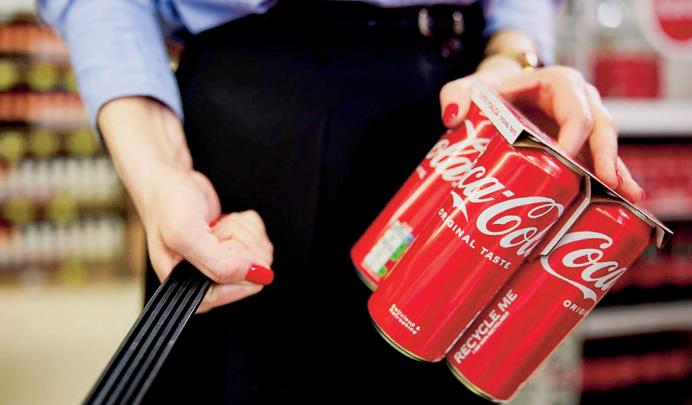

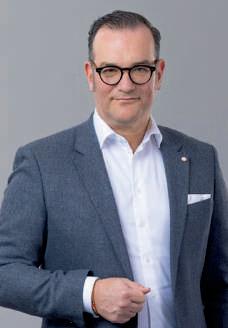
”We process approximately 220,000 tonnes of waste paper each year, making us the largest recycler in Serbia”
Nikola Pejovic General Manager of Umka Cardboard Mill
The Foreign Investors Council (FIC) of Serbia elected a new leadership team. Dr. Ronalnd Seeliger, CEO of Hemofarm, was appointed President for the next three years. Dr. Ana Govedarica, General Manager of Roche Serbia, and Goran Pekez, JTI’s Director of Corporate Affairs for the Adriatic region, were elected Vice Presidents. FIC Serbia’s mission remains clear: to foster a transparent, competitive, and sustainable business environment, supporting regulatory reforms for economic growth. As Serbia intensifies EU membership talks, aligning local regulations with European standards and reducing geopolitical investment risks are top priorities.
H.E. Hyung Tae Kim
Ambassador-Designate of the Republic of Korea

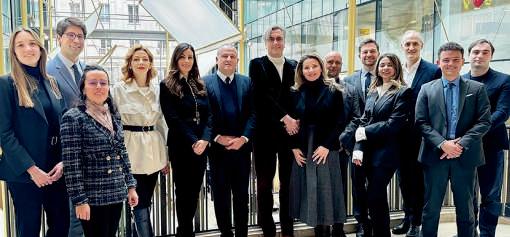
The Serbian Chamber of Commerce (PKS) and the French investment bank Banque Publique d’investissement (BPI) have signed a Memorandum of Cooperation aimed at strengthening economic ties between Serbia and France. This agreement will focus on supporting small and medium-sized enterprises, as well as the development of investments and infrastructure in Serbia. The memorandum was signed by Marko Čadež, President of the PKS, and Olivier Vincent, Executive Director of BPI, in the presence of representatives from French Tech and the Embassy of the Republic of Serbia in France.
Novi Sad is setting the stage for a new era in business and innovation with the development of Elleven, an A-class office building poised to redefine the city’s skyline and its role in the regional economy. Located just 2 kilometres from the city centre, Elleven is a striking 22,000-square-meter structure that embodies the principles of modernity and sustainability. With 10 floors of flexible office space, ranging from 350 to 2,200 square meters per floor, the building offers light-filled, expansive workspaces designed for collaboration and creativity. Its LEED Platinum certification underscores its commitment to energy efficiency and environmental sustainability, with green rooftops, electric vehicle stations, and a rainwater recycling system.
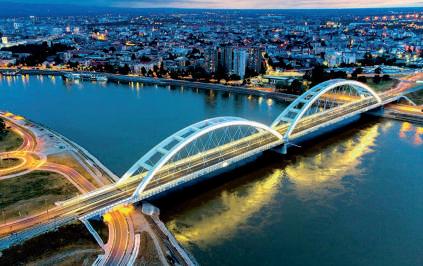
The newly arrived Ambassador-Designate of the Republic of Korea to the Republic of Serbia, H.E. Hyung Tae KIM, holds a BA in Chinese Language and Literature from Seoul’s Yonsei University. He joins the Korean Embassy in Belgrade after having served as Korean ambassador to Ukraine (2021-2024). A career diplomat, Ambassador Kim joined the Korean Foreign Ministry in 1991 and has held numerous foreign postings, including serving at the Korean embassies in China (19972000 and 2013-2016), Germany (2000-2005), Indonesia (2005-2008), Australia (20112013) and India (Consul-General, 2016-2020). Ambassador Kim has also held various positions at the foreign ministry in Seoul, including Director of the Development Cooperation Division (2008-2009), Director of the Northeast Asian Regional Cooperation Division (2009-2011) and Ambassador for International Relations at Chungcheongbuk-do Province, Korea. Ambassador Kim has earned his Order of Service Merit (Red Stripes) and is a married father of one daughter and one son.
Milen Janjić CEO, Intellya
Our eight years of work has resulted in a suite of platforms: AI CORE, the foundation of our development; Weaver, a conversational platform; and Selecta, a CRM platform, says Intellya CEO Milen Janjić


The first steps have been taken, and further AI growth is expected as its potential is virtually limitless. However, those futuristic scenarios in which AI entirely replaces humans will have to wait, says our interlocutor, with whom we discuss the role of artificial intelligence in business and society.
Intellya has been at the forefront of developing and implementing AI-driven platforms for over eight years. What are the key lessons that have shaped your journey in Serbia and the wider region?
— I’m glad you included both development and implementation from the outset, as our company is recognised precisely for delivering applied solutions. Intellya has been developing AI products for over eight years and applying them to real-world business cases. Our work has resulted in three platforms: AI CORE – the backbone of our development; Weaver – a conversational AI platform; and Selecta –a CRM platform. Experience has shown that the key to success lies in investing in people and finding the right partners who are open to adopting our solutions.
You mentioned Selecta, your CRM platform, and Weaver, your virtual assistant. What makes these platforms stand out from the competition?
— Right now, conversational AI is attracting the most interest, so let’s start with Weaver –the most advanced solution in its class. It was launched nearly eight years ago and has undergone six generations of improvements,
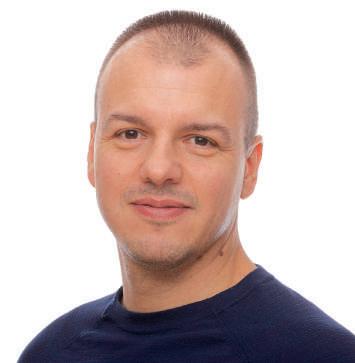
Data management culture has reached a new level, which had long hindered more serious AI adoption. IT
maturity
among companies is growing and investment confidence in AI is stronger than ever before
evolving from basic natural language processing to today’s generative AI and large language models. Our experience from over 60 projects, combined with the latest technological advancements, has resulted in a unique platform that elevates conversational AI to the highest level. It enables model integration, pulls information from multiple sources, tracks unstructured conversation flows and even guides users through complex processes such as investment advisory services.
As for Selecta, our client relationship management platform, we were the first to intro-
duce machine learning and AI to the traditional CRM approach. We’ve developed a platform that redefines CRM by automating user engagement processes. Take digital sales campaigns, for example – these used to require extensive manual work and data manipulation, with all customers receiving the same campaign. With AI, we simply set a goal, such as launching a product to 100,000 addresses. AI then determines who needs it most, personalises content according to client preferences and company standards, selects the optimal communication channel and timing based on user behaviour, continues the process towards conversion and recognises the moment when human intervention is needed.
How do you see the role of AI in business? If we’re not mistaken, this was the topic of the panel discussion “The Role of AI in Business” at Central Hall, where you participated.
— The market, society and users are more prepared than ever to adopt and implement AI. Data management culture has reached a new level, which had long hindered more serious AI adoption. IT maturity among companies is growing and investment confidence in AI is stronger than ever before. For the first time, top executives at major companies are willing to invest not only in AI solutions, but also in their own technical education and that of their staff.
That said, AI remains more of a discussion point than an everyday tool, but the indicators point to exponential growth. We have to be realistic – growth always seems rapid from a low starting point, yet only a small percentage of AI solutions actually make it to real-world use. The data shows that just 1% of AI initiatives successfully achieve fullscale production.
Jelena Tadić PPP Investment CEO
Belgrade will host the 9th UNECE International Forum on Public-Private Partnerships from 14th to 16th May 2025, bringing together experts, policymakers and investors. This event, which coincides with the 80th anniversary of the founding of the United Nations, will emphasise the role of PPPs in sustainable development. It will also be attended by high-ranking officials, including UN Under-Secretary-General Tatiana Molcean, highlighting the forum’s global significance


e spoke with Jelena Tadić, CEO of PPP Investment and an international evaluator for UNECE, about Serbia’s role in PPP projects and their connection to the UN’s Sustainable Development Goals.
WWhat does it mean for the region to be hosting the UNECE PPP Forum in Belgrade?
— It’s an honour for Belgrade to host such discussions of sustainable investments and infrastructure. This Forum serves as a platform for knowledge exchange, policy innovation and project collaboration. The presence of UN leaders and top decision-makers reinforces its importance. As our colleague Mr David Baxter said: “We don’t use PPP because we can, we use it because we must – for the good of humanity”. This philosophy drives our work in making PPPs impactful.
How do PPPs support the SDGs; and how can Serbia be a role model?
— PPPs enhance resource efficiency, infrastructure modernisation and sustainability. Serbia has successfully implemented PPP projects in renewable energy, energy efficiency and municipal infrastructure,
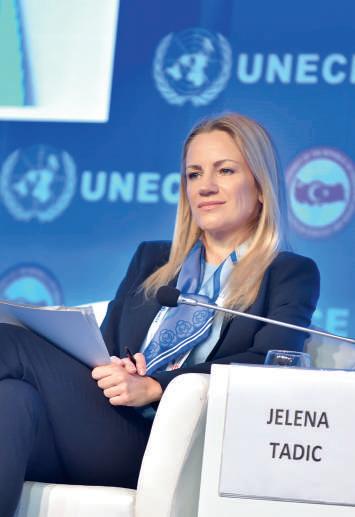
“We don’t use PPP because we can, we use it because we must – for the good of humanity”
demonstrating their role in the green transition. Initiatives like public lighting modernisation and smart infrastructure showcase how PPPs align with global sustainability
goals. This Forum will highlight Serbia’s achievements in the development of sustainable PPPs.
What makes Serbia successful in PPP projects?
— Serbia has built a strong regulatory framework with flexibility, ensuring effective risk management and the fair sharing of responsibility. It has proven that PPPs can create “value for planet”, combining financial sustainability with long-term environmental and social benefits.
How does PPP Investment contribute to sustainable projects?
— At PPP Investment, we integrate environmental, social and governance principles into PPP projects to reduce emissions, improve efficiency and support community wellbeing. Through cost-benefit analysis and strategic planning, we ensure PPPs deliver lasting sustainability.
What are your expectations for the upcoming UNECE PPP Forum?
— Following a successful presentation at the 9th PPP Week in Istanbul, we expect Belgrade to attract top global PPP experts and investors, solidifying its role as a leader in the region. The Forum will enhance regional cooperation, innovation and long-term PPP success.

“While the low level of digitalisation in public and private sectors poses a challenge, it creates opportunities for U.S. businesses“
Jelena Arsovska Executive Director of AmCham N.Macedonia

Slovenia’s Ministry of Finance is set to launch its second retail bond issuance this March, following the strong response to last year’s offering. In February 2024, nearly 10,000 citizens invested, raising €261 million. This year, the government is offering a three-year bond with a 2.75% interest rate, available exclusively to individual investors. As before, the bonds will be sold between 10 and 21 March through NLB, OTP, BKS, and the Ilirika brokerage house.
Nelt Group has invested €1.6 million to expand its regional distribution centre in Bijeljina, strengthening its presence in Bosnia and Herzegovina. This investment is part of a larger €100 million initiative focused on modernising logistics infrastructure and integrating advanced technology across Southeast Europe and Zambia. The expansion, which began in June 2024, has significantly increased the facility’s capacity, now covering 2,065 square meters with 2,196 pallet positions. By enhancing its logistics network, Nelt Group continues to support regional economic growth and improve supply chain efficiency. This latest development reinforces the company’s commitment to innovation and operational excellence.

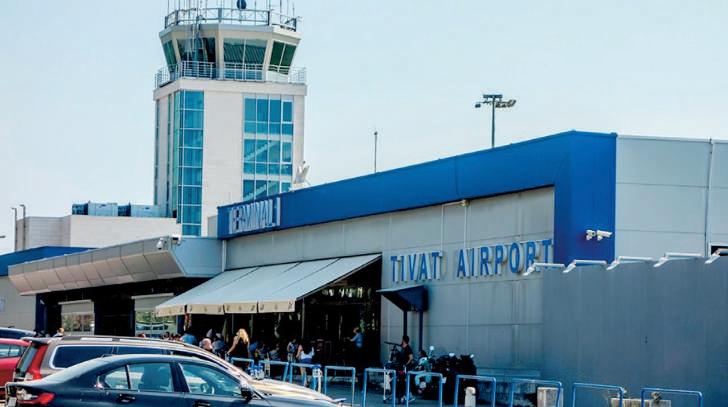
Airports of Montenegro has announced the launch of a direct flight from Tivat to Barcelona this summer, as revealed by Executive Director Roko Tolić at a press conference. Joined by future Spanish Ambassador Jorge Urbiola Lopez, Tolić emphasised the route’s importance for boosting tourism and investment between the two nations. He expressed confidence that airport traffic will reach last year’s summer levels as early as spring. Operated by Montenegro’s national carrier, the new service aims to strengthen economic and cultural ties.

“Slovenia’s central location provides a gateway to both Western and Southeastern Europe“
Ajša Vodnik CEO of AmCham Slovenia & Chair of AmCham in Europe

Croatian engineering leader Končar has unveiled a groundbreaking fully battery-powered regional train, setting a new standard in sustainable transport. As an official partner of UNESCO’s World Engineering Day 2025, the company is marking its 80 th anniversary alongside a decade of the UN’s Sustainable Development Goals. The train debuted internationally at InnoTrans in Berlin and highlights Končar’s commitment to green innovation. This milestone reinforces its position as a pioneer in eco-friendly rail technology.

In a prestigious ceremony held in Mostar on Monday evening, Osijek-Baranja County was officially named European Wine Capital for 2025, an accolade bestowed by the European Network of Wine Cities (RECEVIN). This significant recognition celebrates the county’s rich viticultural heritage and its growing reputation as a hub for wine tourism. County Prefect Mato Lukić expressed his pride, highlighting the vital role of Baranja, Erdut, Đakovo, and Feričanci, four renowned wine regions that form the foundation of Osijek-Baranja’s tourism development. He remarked that the title provides a tremendous boost to the county’s continental tourism and is a valuable promotional resource.


The Municipality of Bar has launched a redevelopment project around the Tri Kule buildings on Vladimira Rolovića Street, aiming to enhance functionality and aesthetics. Spanning 620m², the area will be transformed into a pedestrian-friendly zone with improved accessibility. Key upgrades include a new walkway and a ramp with handrails to ensure safe passage for people with disabilities. The project also features urban street furniture and a landscaped green space, adding to the district’s appeal.
For more than 200,000 years, humans have built solutions to the challenges we face and shared our knowledge with each other. AI could continue this trend, complementing human capabilities and enabling us to unleash our full potential, but the technology is developing in a different direction
I was fortunate to participate in the recent AI Action Summit in Paris, where many discussions emphasized the need to steer AI in a more socially beneficial direction. At a time of increasingly loud calls for AI acceleration from Silicon Valley –and now from the US government – the opportunity to focus on what we want from the technology was like a breath of fresh air.
Though the human journey has not always been smooth – our capabilities, machines, and knowledge sometimes cause profound harms – constant inquiry and prolific sharing of information is essential to what we are.
While economic development has created tremendous inequality between and within countries, people almost everywhere today are healthier and more prosperous than they would have been in the eighteenth century. AI could invigorate this trend by complementing human skills, talents, and knowledge, improving our decision-making, experimentation, and applications of useful knowledge.
It is relevant practical knowledge, not mere information, that makes factory workers more productive; enables electricians to handle new equipment and perform more sophisticated tasks; helps nurses play a more critical decision-making role in health care; and generally allows workers of all skills and backgrounds to fill new and more productive roles.
AI, properly developed and used, can indeed make us better – not just by providing “a bicycle for the mind,” but by truly expanding our ability to think and act with greater understanding, independent of coercion or manipulation.
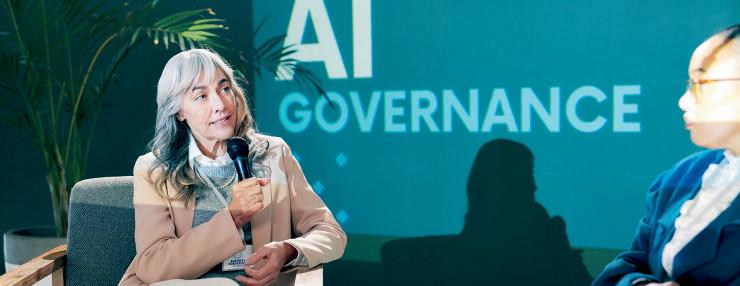
Yet owing to its profound potential, AI also represents one of the gravest threats that humanity has ever faced. The risk is not only (or even mainly) that superintelligent machines will someday rule over us; it is that AI will undermine our ability to learn, experiment, share knowledge, and derive meaning from our activities. AI will greatly diminish us if it ceaselessly eliminates tasks and jobs; overcentralizes information and discourages human inquiry and experiential learning; empowers a few companies to rule over our lives; and creates a twotier society with vast inequalities and status differences. It may even destroy democracy and human civilization as we know it.
I fear this is the direction we are heading in. But nothing is preordained. We can devise better ways to govern our societies, and choose a direction for technology that boosts knowledge acquisition and maximizes human flourishing.
But first, the public must recognize that this socially desirable path is technically feasible. AI will move in a pro-human di-
rection only if technologists, engineers, and executives work together with democratic institutions, and if developers in the United States, Europe, and China listen to the five billion people who live in other parts of the world. We desperately need more thoughtful advice from experts and inspiring leadership from politicians, whose focus should be on incentivizing pro-human AI through policy and regulatory frameworks.
But we also need more than regulation. European society must encourage the more socially beneficial direction of AI and European leaders will need to invest in the necessary digital infrastructure, design regulations that do not discourage investment or drive away talented AI researchers, and create the kind of financing mechanisms that successful startups need to scale up. Without a robust AI industry of its own, Europe will have little to no influence on the direction of AI globally.
* By Daron Acemoglu, a 2024 Nobel laureate in economics and Institute Professor of Economics at MIT
Dr Milinko Radosavljević Director of the Mining Institute Ltd.
Since its very founding as the first institution of its kind in this region, the mission of the Mining Institute has been to drive the accelerated development of the mining sector –a mission that remains unchanged to this day, explains its director in this CorD interview


t isn’t easy to remain competitive and persist on the market, as every era brings its own specific demands, to which we have adapted successfully, –says Dr Milinko Radosavljević. He emphasises that, in the coming years, special attention will be paid to workplace and environmental protection, monitoring scientific advancements and implementing the latest technologies.
IHow would you describe the development path of Mining Institute Belgrade over the past 65 years?
— The Mining Institute was established in 1960 with the aim of providing comprehensive research, development, design and consultancy support to mines across all areas of mining and related sciences.
Over the past 65 years, the Institute has fulfilled this mission successfully, leaving a legacy of remarkable results both domestically and internationally: the design and development of 50 mines with complete infrastructure, over 20 quarries, more than 20 tailings and ash disposal sites, and over 40 mineral processing and coal cleaning plants, including coal beneficiation facilities. Additionally, the Institute has also developed numerous technical solutions for various mining operations, covering excavation methods, underground chamber construction, transportation systems, waste disposal and environmental and workplace protection. The Institute has implemented a wide range of technologies as a result of research and innovation pro-
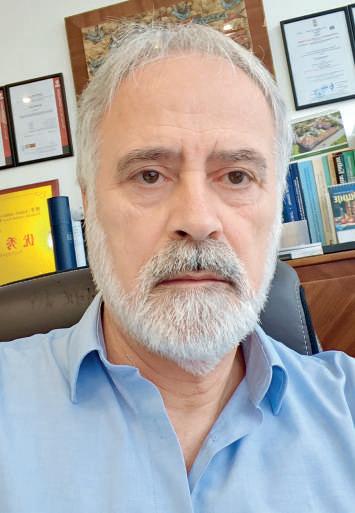
jects, with over 50 projects funded by the relevant ministry.
How does the institute contribute to advancing mining technologies and sustainable mining?
— The approach to solving most challenges in mining technologies is multidisciplinary. Each problem is tackled professionally and with the application of the latest scientific achievements, always striving to enhance mining technologies and promote sustainable mining.
Our experts have extensive experience across various fields, whether in preparing investment and technical documentation in line with the Law on Mining and Geological Research or designing facilities and technologies in accordance with the Law on Planning and Construction.
When it comes to researching new technologies or validating existing ones, our three accredited laboratories, certified under the SRPS ISO 17025 standard, play a crucial role.
We place great emphasis on environmental and workplace protection and on integrating the latest scientific findings in this field into mining design. Particular attention is paid to addressing the negative environmental impacts of mining – as our contribution to sustainable mining.
What values have been key to the Institute’s success; and what would be your message to future generations of experts?
— The key to success has been adaptability to market demands, and I believe we have successfully kept pace with these changes. At the same time, the quality of our services has always been our strongest recommendation – earning the status of a reliable partner requires both knowledge and hard work.
Elektroprivreda Srbije has been our trusted partner for many years, providing us with great security in market operations. Additionally, Chinese companies Zijin Mining and Zijin Copper have become significant partners.
We must also highlight our past and future involvement in geotechnical research for the Belgrade Metro project.
To future generations, I would say that working in this profession will increasingly require dedication to new technologies, including artificial intelligence and the automation of production processes. This will bring new challenges, but will also make the profession more attractive. Their great responsibility will be to restore trust in the mining sector and highlight its significance to every advanced society..
Sanja Sibinčić Ph.D Pronatal Group Regional Manager
Pronatal is a leading group that has over 400 experts, ensuring that each of the approximately 7,000 couples it supports each year receives the same high standard of care, service, and success in assisted reproduction, says Dr Sanja Sibinčić Ph.D.

As the head of four regional Pronatal clinics, our interviewee isn’t merely an outstanding doctor and scientist, but also an excellent manager, esteemed lecturer, educator and visionary. With her we discussed trends in IVF, regenerative medicine, medical tourism and the profound beauty of making someone’s dreams come true by creating new life.
What are the key advantages and privileges of being part of a major European IVF group?
— The advantages are truly significant, particularly in terms of international collaboration and the exchange of knowledge accumulated over decades, which greatly supports our long-term strategic planning. We’ve focused on training young doctors and embryologists over the past two years, and being part of a group has been instrumental in this effort. A large team of experts enables education across various fields, while the high number of patients provides invaluable hands-on experience. The diverse expertise of our specialists creates an outstanding assemblage of the latest techniques used at renowned clinics worldwide. Our personnel have the opportunity to interact with colleagues from 11 centres, share experiences, strengthen their team spirit and enhance their sense of belonging to the group.
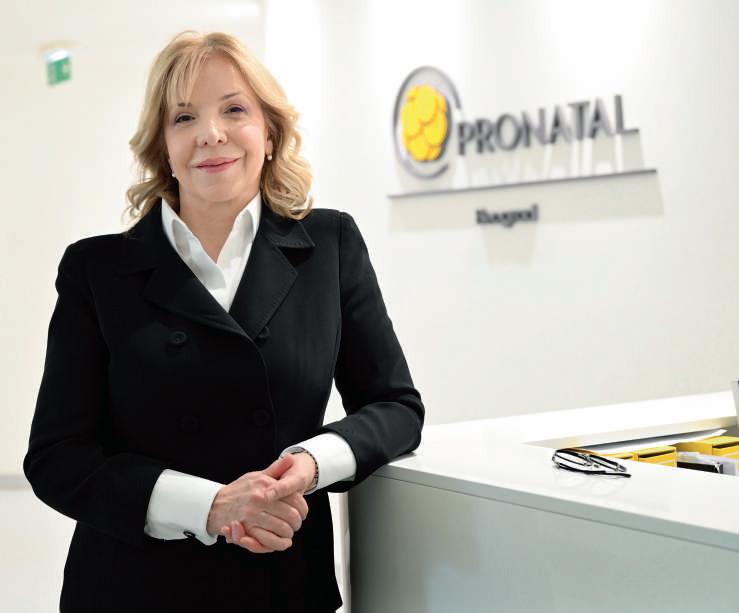
Four IVF clinics in the region are today part of the Pronatal Group. What is the group’s vision for the future?
— Given that Pronatal has worked with a large number of patients from the area of the former Yugoslavia, our aim was to bring our services closer to them. In Zagreb and Banja Luka, we acquired clinics with a 20-year tradition that had the best success rates and the highest patient numbers. We built new clinics in Belgrade and Rijeka that are on their way to becoming leading institutions in their re-
spective countries. Just as we have expanded around this region, Pronatal now aims to establish operations in Germany, where we are finalising a major acquisition. We will determine our next steps after that.
Are patients in our region now able to receive the same quality of service, care and success rates in assisted reproduction as patients of leading European centres?
— As I oversee all four clinics in the region, I can state with confidence that we provide
top-tier services at each location, under the mentorship of our colleagues in Prague. During joint meetings, we compare results, ensure the highest standards of equipment and plan new procedures. Serbia has also made significant progress by introducing a donor programme for couples and individuals, meaning that we now offer an even broader range of IVF services than most European countries.
You were the first in Serbia to introduce a holistic approach to preparing patients for pregnancy and IVF. What led to this initiative?
— I’ve worked with more than 30,000 couples over the past 30 years, and I’ve always understood the importance of preparation and bringing the body to an optimal condition. Acknowledging that IVF is a psychologically demanding process, particularly after multiple unsuccessful attempts, we established a holistic team to empower patients and equip them with the knowledge required to navigate challenging situations, as well as to help them achieve harmony between mind, body and emotions.
Patients at our Belgrade clinic are supported by a nutritionist specialising in diet and supplementation for IVF preparation, as well as a psychologist, psychotherapist, quantum medicine specialists and a therapist who leads specially designed breathing exercises. This approach has yielded outstanding results and our satisfied patients are our driving force, inspiring us to persevere and seek new solutions. We have many more innovations planned, in line with the latest research and trends.
IVF in Serbia, particularly at your clinic, is performed by top experts who achieve excellent results, yet the costs are lower than in Europe. Could this attract international patients?
— We already receive a significant number of international patients, as our clinic is the only one offering several advanced regenerative medicine treatments. Our goal is to introduce as many patients as possible to our work, and we are confident that these unique methods will attract even more people from abroad. While regenerative medicine is still a developing field and is thus very expensive, we provide these treatments at
our centre in Belgrade. These methods are available at only a few world-renowned clinics, mostly in the U.S., but our prices are far more accessible. Thanks to regenerative medicine, we are already part of the growing medical tourism sector.
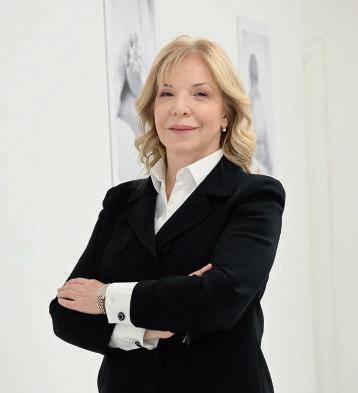
Our goal is to introduce as many patients as possible to our work, and we are confident that these unique methods will attract even more international patients
The story of Pronatal wouldn’t be complete without your personal journey. How is it possible to simultaneously be an exceptional doctor, scientist, manager, lecturer and educator? We must have missed something!
— Today, almost three decades after I first felt the profound calling to be part of this remarkable journey – the journey of creating new life – I can state confidently that I didn’t choose this profession; rather it chose me. I was fortunate to discover my purpose early on, to understand what I could contribute to the world and how I could help others. Out of immense gratitude and love, I live this story every day. However, it requires immense discipline, deep dedication, a strong drive for knowledge and a constant commitment to remain at the forefront of advancements.
Believing in myself, my team and my mission to help others, as well as continuous learning and sacrifice, have paved the way to my success. Through my practice, I have met thousands of patients facing some of life’s toughest challenges – people fighting for the chance to have a child. These encounters shape you profoundly; they teach you how to be a better person and how to view the world through the lens of love and understanding. Without them, I wouldn’t be who I am today.
I have been fortunate to experience every stage of this profession, and that has been invaluable in giving me a broader perspective and enabling me to easily lead teams across four clinics. Managing people at IVF clinics isn’t just about administration – it is primarily about understanding emotions, fears and hopes. It is about inspiring confidence, instilling faith in success and demonstrating unwavering support. It is about fostering an atmosphere of trust and belonging, where every team member feels valued and respected. Because it is only in such an environment that we can achieve our ultimate goal: fulfilling the dreams of those who come to us with hope in their hearts.
What advice would you give to young professionals who are just starting their careers in your field?
— Being part of the process of creating life is the greatest blessing and privilege, making this profession truly special. In order to succeed, you must be dedicated, empathetic, responsible and passionate about learning. When you approach it in this way, the job itself will carry you forward, revealing its most beautiful aspects. There is no greater joy than seeing the smiling faces of parents holding their newborn in their arms. Everything changes at that moment, filling you with the immense energy of happiness, knowing you have been part of a team that brings joy to others.
The Pronatal Academy is always open to those who recognise these values, enabling them to acquire new knowledge and, in time, receive the opportunity to become part of our international team, which embraces diversity. This is a profession that brings “a happiness greater than all others”, which is the reason it is the most beautiful job in the world.










As the 56th International Motor Show approaches in Belgrade this March, Serbia’s automotive industry stands at a pivotal juncture. The event not only showcases the latest automotive innovations but also reflects the nation’s strategic position in the global automotive landscape






In recent years, Serbia has emerged as a significant player in the automotive supply chain. While traditional automotive hubs in Western Europe, such as Germany, face challenges leading to workforce reductions, Serbia has experienced a contrasting trend. Major automotive suppliers are increasingly investing in Serbian operations, attracted by competitive advantages and a skilled workforce. This shift underscores Serbia’s growing importance as a hub for automotive manufacturing and innovation.







With a strong foundation in component manufacturing and assembly, Serbia’s automotive sector is evolving towards higher value-added production. Investments in research, development, and electric vehicle (EV) technology signal the industry’s ambition to move beyond traditional manufacturing and integrate into the future of mobility. The government’s incentives for foreign direct investment, coupled with a network of free trade agreements, have positioned Serbia as a competitive location for new automotive projects.


gines is reshaping supply chains, and Serbia must ensure that its automotive sector remains relevant in this new landscape. The capacity to attract high-tech manufacturing and innovation-driven projects will determine the industry’s longterm success.




The capacity to attract high-tech manufacturing and innovationdriven projects will determine the industry’s long-term success

However, challenges remain. The shift towards electrification and digitalisation demands continuous investment in infrastructure and workforce development. The global transition away from internal combustion en-

The Belgrade Motor Show serves as a timely reflection of these developments. As the global automotive industry undergoes one of its most transformative periods, Serbia has an opportunity to further strengthen its position as a key link between European and global markets. The future will depend on its ability to balance investment, innovation, and sustainability in an increasingly competitive environment.



“Chase the vision, not the money; the money will end up following you”
Tony Hsieh former CEO of Zappos

Alibaba reported an 8% increase in revenues for the last quarter, driven by strong performance in its e-commerce and cloud computing sectors. The company plans to bolster investments in cloud and artificial intelligence infrastructure to maintain its competitive edge. This strategic focus aims to capitalise on the growing demand for digital services and enterprise solutions. Alibaba’s commitment to technological advancement underscores its efforts to diversify revenue streams and reduce reliance on traditional retail operations.
Investors are urging the European Union to overhaul its debt securitisation rules to rejuvenate the market and enhance financing options for businesses and households. This initiative aims to stimulate economic growth and provide more robust financial support within the EU. The proposed changes could make securitised debt instruments more attractive to investors, thereby increasing liquidity in the financial system. However, discussions are ongoing, and any regulatory adjustments will require careful consideration to balance market stimulation with financial stability.


In February 2025, U.S. business activity nearly stalled, reaching a 17-month low, as reported by S&P Global. The slowdown is attributed to concerns over new tariffs on imports and significant federal government spending cuts. These factors have led to increased uncertainty among businesses and consumers, affecting sales and investment decisions. The manufacturing sector saw a modest rise, possibly due to preemptive actions against potential cost increases or supply shortages linked to tariffs. Overall, the economic outlook remains cautious amid these policy-induced challenges.

“Your reputation is more important than your paycheck, and your integrity is worth more than your careerll”
Ryan Freitas co-founder of About.me

Coinbase announced that the U.S. Securities and Exchange Commission (SEC) plans to withdraw its lawsuit against the cryptocurrency exchange, ending a prolonged legal battle. This decision reflects the SEC’s shift in approach toward crypto regulation under the current administration. The agency has established a dedicated task force and rescinded previous crypto-related accounting guidance. The dismissal of the lawsuit is seen as a significant victory for Coinbase and the broader cryptocurrency industry, potentially setting a precedent for future regulatory interactions.
Recruitment firm Hays reported that the global job market is experiencing its most prolonged downturn since 2000, with no immediate signs of recovery. The demand for contract workers remains low, and permanent hiring has not rebounded since a decline observed before December 2024. Economic uncertainties are deterring both companies and candidates from pursuing new employment opportunities. Regions such as Europe, particularly France, the UK, Ireland, and Germany, continue to face challenging labour market conditions. Hays’ financial performance reflects this trend, with a significant drop in net fees and operating profit compared to the previous year.


Airbus announced plans to deliver 820 commercial jets in 2025, a 7% increase from the previous year, despite delaying the A350 freighter model to 2027. The company reported lower annual operating earnings, citing supply chain issues and challenges in its Space business. Airbus also faces potential risks related to the A400M aircraft due to order uncertainties. The company remains focused on navigating these challenges while meeting delivery targets and addressing market demands.
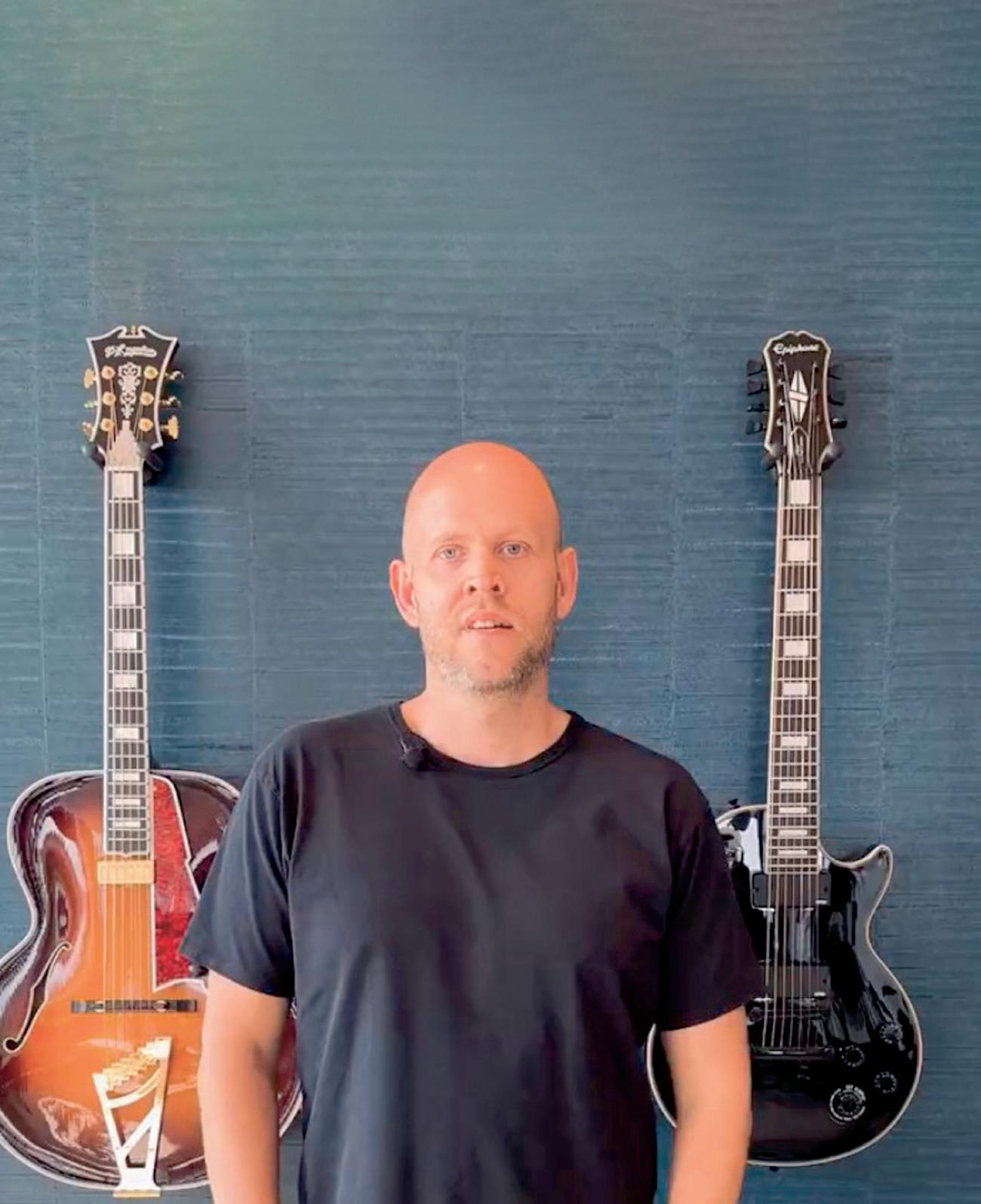
Daniel Ek co-founder and CEO of Spotify
Few entrepreneurs have transformed an industry as profoundly as Daniel Georg Ek, the Swedish visionary behind Spotify. As the co-founder and CEO of the world’s leading music streaming platform, Ek has reshaped how people access and consume music, challenging traditional business models and leading the industry into the digital era. His journey from a self-taught coder to a billionaire tech mogul is a story of relentless innovation, strategic risk-taking, and an unshakable belief in the power of technology.
Born in 1983 in Stockholm, Sweden, Daniel Ek displayed an early passion for computers and technology. By the age of 13, he was already coding and building websites, charging local businesses a modest fee for his services. His skills quickly outgrew his age, and by 16, he was managing a team of developers. Unlike many tech entrepreneurs who drop out of college to pursue their ventures, Ek briefly attended the Royal Institute of Technology before deciding that entrepreneurship offered a better education than university ever could.
His early career was a mix of startups and high-profile exits. In 2006, he founded Advertigo, an online advertising company, which he later sold to TradeDoubler. This sale gave him both the financial resources and the confidence to embark on his next, much bigger project—solving the music industry’s piracy problem.
The mid-2000s were a nightmare for the music industry. Illegal file-sharing platforms like Napster, LimeWire, and The Pirate Bay had upended the traditional music business, leading to declining revenues and widespread copyright infringement. Instead of viewing piracy as an enemy to be eradicated, Ek saw it as a consumer behaviour that needed a legal, user-friendly alternative.

In 2006, Ek and Martin Lorentzon, co-founders of TradeDoubler, started Spotify in Stockholm. Their vision was simple: create a platform that offered instant access to a massive music library legally and seamlessly without the need for downloads. But while the idea was compelling, convincing major record labels to support the venture was a daunting challenge.
For two years, Ek negotiated tirelessly with record labels, persuading them that a streaming model—one that allowed users to listen to music for free with ads or pay for an ad-free experience—could generate revenue while combating piracy. This freemium model became Spotify’s greatest innovation, setting it apart from competitors and laying the foundation for the global shift to streaming.
and the UK, quickly gaining traction due to its sleek interface and massive song library. As demand grew, Spotify expanded into more European markets, followed by the U.S. in 2011, overcoming numerous regulatory and licensing hurdles.
Under Ek’s leadership, Spotify introduced algorithm-driven personal-
Spotify launched in 2008 in Sweden, Finland, Norway, France, Spain, By 2018, Spotify went public on the New York
ised playlists, such as Discover Weekly and Release Radar, which significantly improved user engagement. These innovations redefined how people discover music, giving smaller artists a platform and disrupting traditional radio stations and music charts.
By 2018, Spotify went public on the New York Stock Exchange, a ma-

jor milestone that solidified its dominance in the streaming space. Today, Spotify boasts over 600 million users globally, with more than 230 million paying subscribers, making it the largest music streaming service in the world.
Despite his staggering success—his net worth exceeds $3 billion—Ek remains remarkably private and downto-earth. Unlike the flamboyant Silicon Valley moguls, he has rejected a flashy lifestyle, preferring a minimalist, family-oriented existence.
However, his ambitions extend beyond Spotify. In 2020, he announced a €1 billion investment fund to support European tech startups, aiming to foster innovation in AI, healthcare, and deep technology. Ek has also expressed interest in sports, making an unsuccessful bid to buy Arsenal Football Club in 2021.
Mission has always been clear: to make all the world’s music accessible to everyone
ensuring that Spotify stays ahead by investing in AI-driven recommendations, audiobook streaming, and new artist promotion tools.
Spotify’s exclusive podcast deals, particularly its $100 million deal with Joe Rogan, have also sparked controversy
While Spotify has been a runaway success, it has not been without controversy. The company has faced ongoing criticism from artists who claim that streaming royalties are too low, with high-profile musicians like Taylor Swift, Neil Young, and Thom Yorke challenging the platform’s payout model.
Spotify’s exclusive podcast deals, particularly its $100 million deal with Joe Rogan, have also sparked controversy. The backlash over content moderation, misinformation, and Spotify’s perceived prioritisation of podcasts over music has put Ek in the hot seat multiple times.
Additionally, Spotify continues to face intense competition from Apple Music, Amazon Music, and YouTube Music, all of which have the advantage of being part of larger tech ecosystems. However, Ek remains laser-focused on long-term innovation,
Despite the challenges, Spotify’s future looks bright. The company continues to expand into emerging markets, diversify into new content formats, and develop cutting-edge AI-driven music curation.
For Daniel Ek, the mission has always been clear: to make all the world’s music accessible to everyone, anywhere, at any time. His ability to combine technological expertise with business acumen has not only transformed the music industry but also set a blueprint for future entrepreneurs looking to disrupt traditional markets.
As Spotify evolves into a full-scale audio powerhouse, Ek’s visionary leadership ensures that it remains at the forefront of the industry. Whether navigating controversies, facing competition, or exploring new frontiers in AI-driven music experiences, Daniel Ek has cemented his place as one of the most influential entrepreneurs of the 21st century.

Serbia’s international schools bridge the gap between local and global education, offering academic excellence, multicultural diversity and internationally recognised curricula that prepare students to succeed in a connected world

International schools in Serbia play a vital role in shaping the country’s educational landscape, catering to expatriate families, diplomats, international professionals and Serbian students seeking globally recognised education. As Belgrade continues to emerge as a hub for foreign investment, diplomatic activity and multinational enterprises, these educational institutions provide a seamless transition for expatriate children, ensuring continuity in education and internationally recognised qualifications that support their academic and professional mobility.
Among the leading institutions, the International School of Belgrade (ISB)
offers a comprehensive Pre-K and Kindergarten and K-12 curriculum based on the International Baccalaureate (IB), preparing students from early childhood to university admission. Chartwell International School follows the British National Curriculum, guiding pupils from nursery and preschool through secondary education with IGCSE and A-Level qualifications. Similarly, the British International School (BIS) provides both British and American diploma pathways, ensuring a flexible academic foundation from early years to pre-university education.
Together, these institutions offer high-quality education from early child-
hood to advanced professional studies, fostering globally competent students and future leaders. Accredited by prestigious international bodies, they uphold rigorous teaching standards, cutting-edge facilities and globally aligned learning approaches, making them competitive among top schools worldwide.
International schools in Serbia emphasise multilingual education, cultural awareness and global integration, preparing students to thrive in diverse academic and professional environments. In bringing together children of various nationalities, they foster an inclusive, culturally rich atmosphere that pro -

motes tolerance, global citizenship and international-mindedness. While celebrating global traditions, these schools also incorporate Serbian cultural elements, ensuring a well-rounded, holistic education.
With a strong commitment to innovation, these schools prioritise pupil-centred learning, interactive methodologies and small class sizes for a personalised educational experience. State-of-the-art facilities, advanced technology integration and creative arts programmes further enhance children’s development, blending practical skills with theoretical knowledge to ensure strong academic outcomes.
Being like a second home to over 1200 children of more than 60 nationalities, Chartwell truly is a unique community. All encompassing, diverse, and multi-cultural, on the one hand, at the same time a school nurtures equality and tolerance, and promotes mutual support and respect
- INTERNATIONAL SCHOOL -
hartwell International School prides itself on being one of the longest-standing private schools in Serbia, continuously striving towards distinction and excellence for more than two decades. Situated in the heart of Belgrade, Chartwell comprises six separate campuses divided according to the student’s age and level, each surrounded by greenery and tranquility of one of the nicest uptown areas. Tailored to suit the needs and demands of a particular age group, each of its premises boasts vast indoor and outdoor space, with carefully furnished and decorated classrooms, accompanied by spacious playgrounds and sports fields. Our main goal
is to provide our students with a safe and uplifting learning environment, paving the way for their growth and success.
We inspire students to become their best, both academically and socially, while our mission is to make every effort to maintain the highest level of teaching and service provision, worthy of the ac-

creditation awarded to us by the University of Cambridge, the Serbian Ministry of Education, as well as COBIS, which we are a proud member of.
The curriculum that lies at Chartwell’s core is based on the British National curriculum accommodated to the global context and taught through an international perspective. It is founded on
Chartwell offers exam preparation for a full range of subjects, thus enabling our students to successfully complete their secondary education, opening the door to enrolling into the most renowned universities worldwide.
As much as they are the pillars of their own academic achievements, our students are supported and their learning is scaffolded each step of the way by the school’s most dedicated and experienced teachers. Their goal is never only to teach a lesson or pass on the knowledge, but to show empathy, and ability to adapt their methods and incorporate the most innovative, hands-on strategies that truly make a difference in the classroom. Having small-sized classes further adds to their almost individual approach to teaching, discovering students’ aptitudes and developing their potential.
a cross-curricular approach where students can take an active role in their own learning, doing research and exploring their interests and talents. Year after year, we observe them flourishing, becoming more independent and devoted to their studies, slowly preparing themselves for the first great milestones – taking IGCSE and AS/A level exams.
Realising that teaching goes far beyond the classroom and academic programme, Chartwell never shies away from organising extra-curricular activities for its students and teachers, from daily outings, theatre or museum visits, to celebrating World Book or UN Day, all aiming at fortifying the school spirit, friendship and great family-like atmosphere. Poetry Night, End of Year Performance or Charity Bazaar are always eagerly anticipated annual events that bring joy to the whole community.
Therefore, whether it is through showing their wits or talents, working hard or having fun, Chartwell International School is a place where students thrive, a place where they base their life-long friendships, and a stepping-stone to their future success in career and life.
• British curriculum based international school
The only international school with its own catering Involved in community
• Accredited by Cambridge Assessment
International Education
• Accredited by the Ministry of Education, Science and Technological Development of Serbia
• Accredited by Council of British International Schools
• Students representing over 60 nationalities
• 25 years of experience
• Wide range of daily after school activities
• 7 languages taught
• 2 residential trips per year
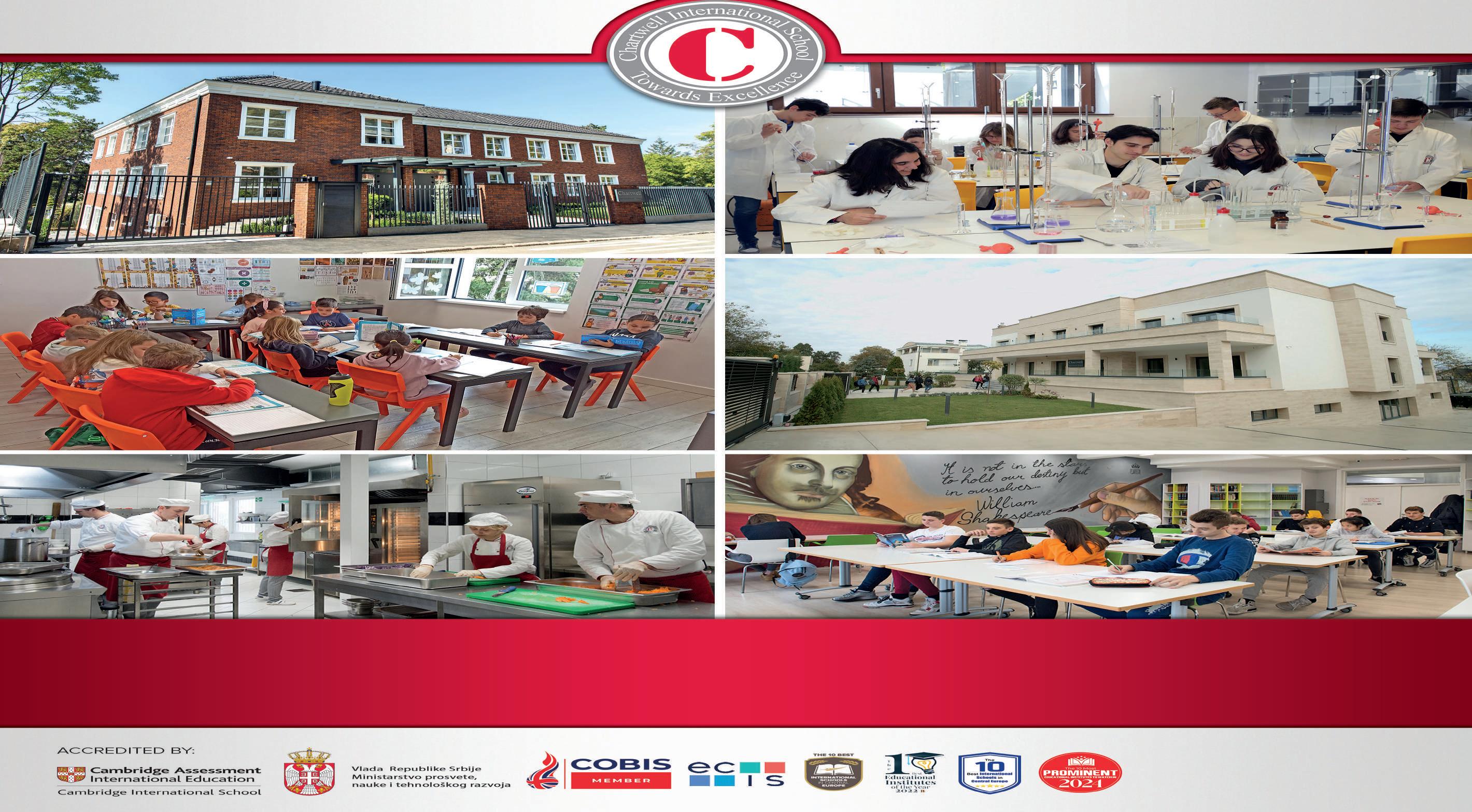



• Monthly outings to the theater/museums
• The only international school with its own catering
• Involved in community service projects




At the International School of Belgrade (ISB), excellence isn’t just an aspiration – it’s a commitment reflected in everything we do. It drives us to challenge ourselves, support one another and uphold high standards in all aspects of teaching and learning. More than that, excellence at ISB means staying engaged with the wider educational landscape, learning from world-class experts, and sharing our own expertise to contribute to global best practices
One of the ways we bring this commitment to life is through collaborations with internationally recognised educators and consultants who help us refine our teaching and learning. ISB has welcomed some of the most respected voices in education to work directly with our faculty, students and parents, ensuring that our approaches remain dynamic and research-driven. At the same time, our faculty engage in learning exchanges with top international schools across the region, thus fostering collaboration and the continuous exchange of ideas.
ISB has so far this year welcomed several globally recognised educators and experts who have enriched our school with innovative, high-impact practices. Beth Stark, a specialist in Universal Design for Learning, has guided teachers in creating more inclusive and accessible classrooms, while Dino Ambrossi, a technology wellness advocate, has worked with students and parents to promote digital balance and responsible tech use. Dr. Ban Har Yeap, a leading authority in mathematics education, collaborated with our community to enhance math instruction, reinforcing ISB’s commitment to evidence-based teaching strategies. Later this spring, we will welcome Kath Murdoch for a return visit to share her expertise in inquiry-based learning, working with educators to foster curiosity-driven, student-led experiences. These engagements ensure that transforma -
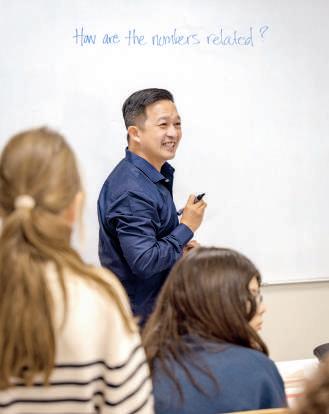
tive teaching and learning remain at the heart of ISB.
Beyond our own community, ISB plays an active role in strengthening education across the region. We host professional development workshops that bring together educators from different countries, creating opportunities for collaboration and shared learning. These initiatives not only benefit ISB’s teachers and students, but also contribute to raising the standard of education at international schools across the region.
Our commitment to professional growth is deeply embedded in our school culture. Through our Professional Learning Activities, teachers engage in yearlong research projects that culminate in
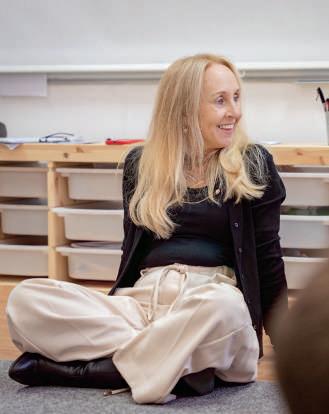
an annual Professional Learning Symposium, where teachers present their findings and share new insights with colleagues. This ongoing cycle of learning and reflection ensures that ISB remains at the forefront of educational excellence.
At ISB, professional growth is a shared experience. Whether through collaborations with visiting experts, exchanges with international colleagues or the work of our Professional Learning Teams, our teachers refine their practice continually. These opportunities not only deepen expertise, but also foster a culture of reflection, curiosity and shared learning. By embracing continuous learning, we ensure that ISB remains a place where educators and students grow together.












































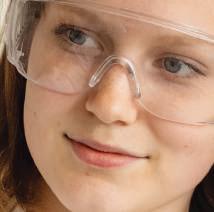











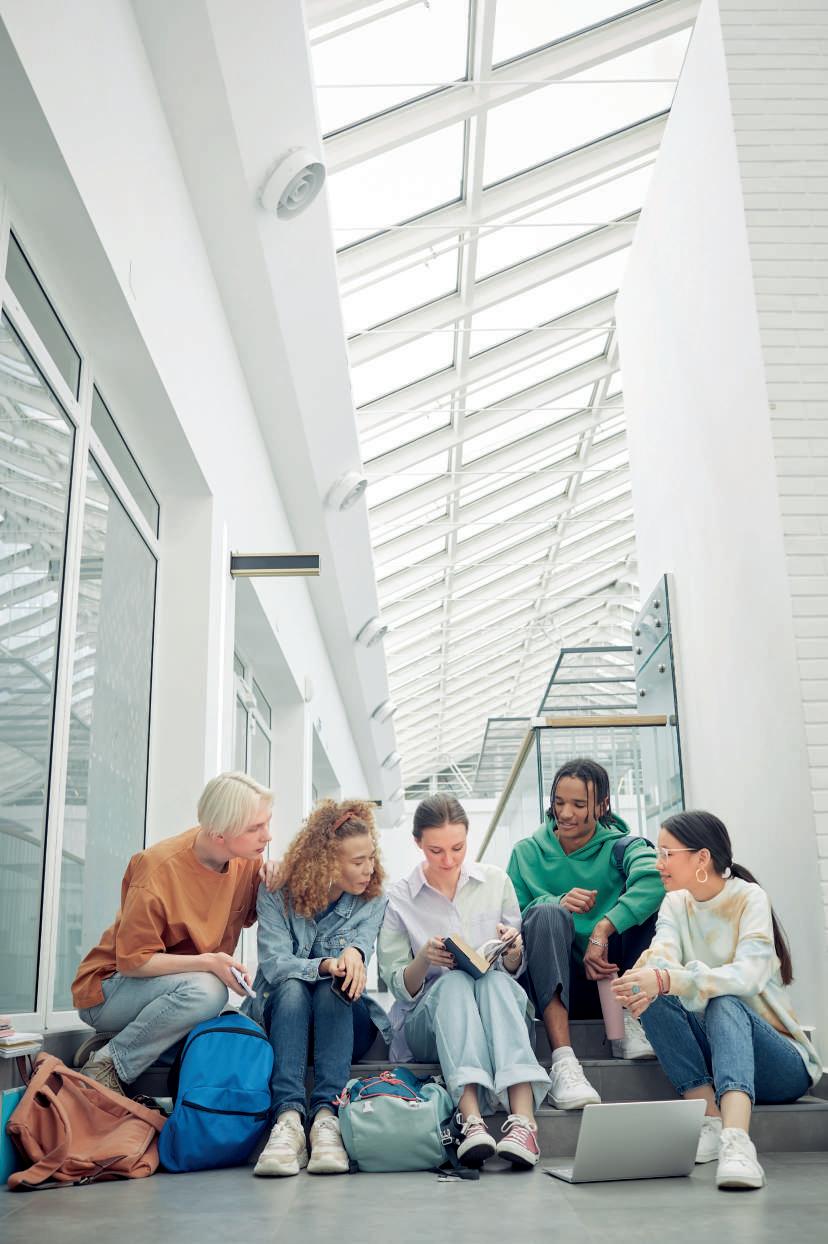
Multiculturalism stands as a pillar of modern education, uniting a rich spectrum of perspectives, traditions, and values
In today’s increasingly interconnected world, embracing cultural diversity within schools is not just a choice but a necessity for fostering inclusive, dynamic learning environments. Multiculturalism enriches the educational experience, offering students the opportunity to learn from each other’s backgrounds and perspectives, and nurturing respect, empathy, and cooperation.
Through the exchange of ideas and experiences, students develop a broader understanding of the world around them. Schools that promote multiculturalism offer more than just academic education; they provide a space for students to grow emotionally and socially. By embracing differences and encouraging dialogue, these institutions help cultivate an atmosphere where collaboration thrives. Students learn to appreciate and navigate the complexities of a diverse world, gaining invaluable skills for both personal and professional success.



In this global age, multiculturalism plays a critical role in shaping well-rounded individuals who can adapt to the challenges and opportunities of an interconnected society. By integrating cultural awareness into education, schools empower students to become leaders who can contribute to progress, innovation, and peace. As future citizens of the world, they will be equipped with the tools needed to work across cultures, fostering harmony and collaboration in every facet of life.
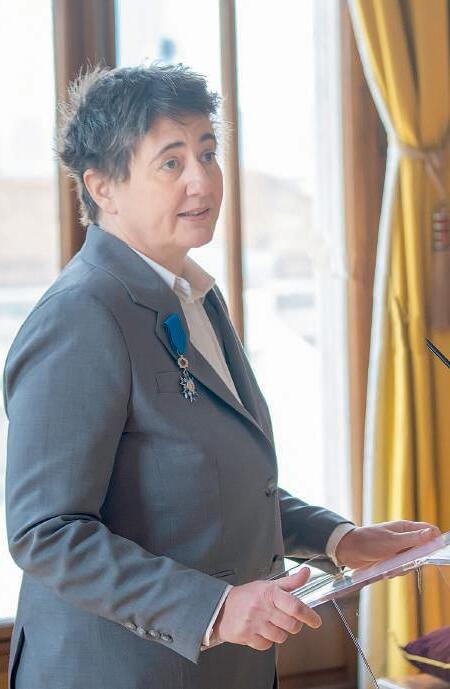
Today, with the French National Order of Merit pinned to my chest, I still see recognition not as an endpoint, but as a call to action
Marijana Savić founder and director of association
ATINA
tanding at crossroads of great change is never comfortable and always requires persistence, resilience, and a refusal to accept the status quo. When ATINA was founded more than 22 years ago, I didn’t seek recognition, but rather transformation – the kind that allows women, especially those who’ve survived human trafficking and violence, to reclaim their rights, dignity and power.
SToday, with the French National Order of Merit pinned to my chest, I still see recognition not as an endpoint, but as a call to action. It reminds me that the work we do is far from over; that the fight for justice is not one we observe, but one we actively shape. ATINA has always been more than an organisation; it is a movement, a force that defies silence and a home for every woman and girl who needs to feel safe, be heard, and find support.
To understand ATINA is to understand the power of persistence. We’ve worked over the years to create real opportunities for women – beyond temporary relief, beyond shelter, beyond survival. More than a thousand women and girls who’ve survived trafficking and gender-based violence have been part of this journey, each having shaped the organisation as much as it has shaped them. ATINA’s strength comes from this collective fight: from the women who refuse to be defined by their past; from the team that never stops learning and adapting; from every partner who chooses to stand with us.
Economic independence is at the heart of this change. This belief led us to establish Bagel Bejgl, a social enterprise that’s more than just a bakery. It is a statement. An act of defiance against a system that too often leaves women without options. When someone asks, “What can a bagel do?” we answer, “It can change a life.”
Every bagel sold represents a step towards economic empowerment, breaking cycles of violence and dependency. The women in ATINA’s pro-
grammes aren’t merely survivors – they are architects of their own futures. And our role is to stand beside them, to ensure that their voices shape the laws, policies and spaces that determine their rights.
This honour doesn’t belong to me alone. It belongs to ATINA, to every woman and girl who has walked through our doors and reclaimed her power, to every activist who refuses to accept injustice, to every person who believes in action over silence. This is a fight that we take on together.
The world is watching, but watching isn’t enough. Now is the time to act. Whether by supporting organisations like ATINA, standing up for policies that protect women and girls
The women in ATINA’s programmes aren’t merely survivors – they are architects of their own futures. And our role is to stand beside them, to ensure that their voices shape the laws, policies and spaces that determine their rights
against violence, or choosing to support social businesses like Bagel Bejgl, every action counts.
Change doesn’t come easily, but it does come. It happens when we refuse to accept injustice as being inevitable; when we push back against structures that deny women their rights; when we create spaces where women aren’t statistics, but decision-makers, leaders and changemakers.
ATINA’s journey has always been one of persistence. And today, as we step into the next phase of our work, we invite others to walk with us. Not just to witness change, but to be part of it.

Exploring the rich cultural legacy of Serbia’s exquisite needlework
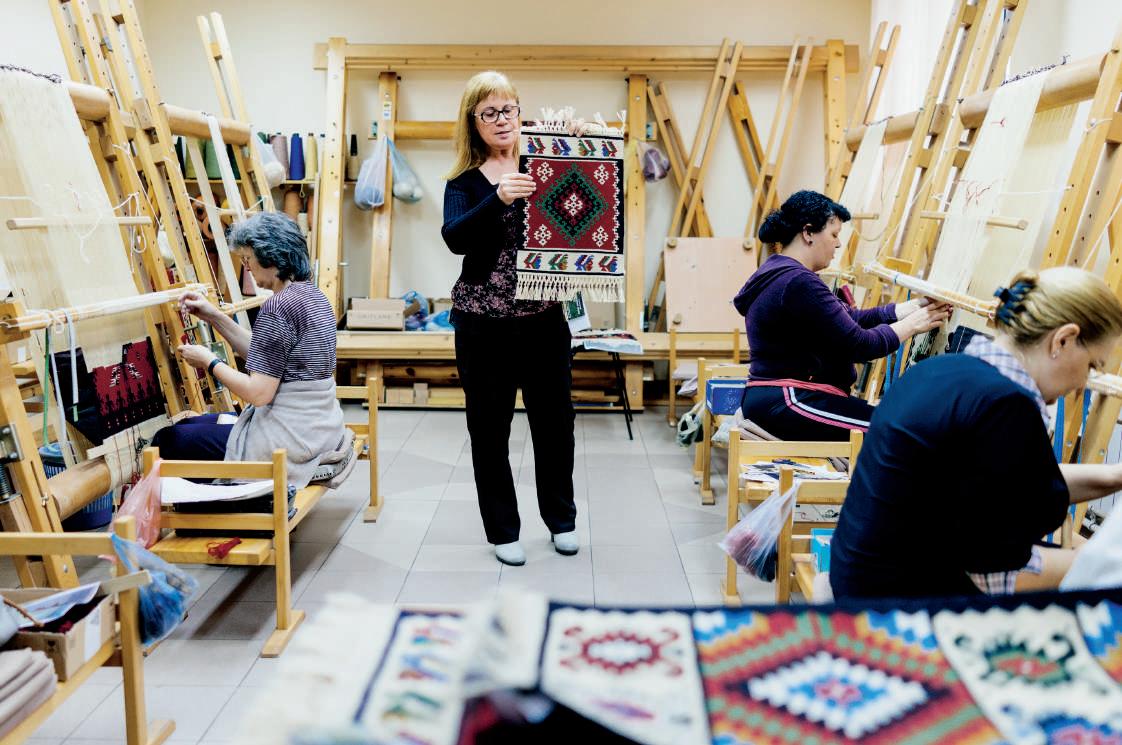
Serbian embroidery is a centuries-old craft that represents far more than just decorative needlework. It is a cultural symbol, a testament to Serbia’s artistic heritage, and a form of storytelling woven into fabric. For generations, Serbian women have passed down this intricate art, using needle and thread to preserve tradition, express identity, and create pieces of lasting beauty. Each region of Serbia has developed its own embroidery styles, influenced by history, geography, and cultural interactions. Whether used in folk costumes, religious textiles, or household decorations, Serbian embroidery remains a cherished and deeply symbolic craft that continues to thrive in both traditional and modern contexts. The origins of Serbian embroidery date back to ancient times when textile decoration played an important
role in everyday life. Early embroidery techniques were influenced by a blend of Byzantine, Ottoman, and Central European styles, reflecting Serbia’s complex historical journey. The country’s geographical position between East and West exposed it to various artistic and cultural currents, all of which contributed to the diversity and uniqueness of its embroidery traditions.
During the Middle Ages, embroidery flourished in Serbia’s royal courts, monasteries, and noble households. It was often used to adorn religious vestments, ceremonial robes, and decorative cloths for churches and monasteries. Some of the most extraordinary examples of medieval Serbian embroidery include epitaphios, elaborately embroidered cloths used in Orthodox Christian ceremonies, often created with gold and silver threads. These luxurious
pieces not only served a religious function but also demonstrated the artistic and technical sophistication of Serbian needlework.
By the 19th and early 20th centuries, Serbian embroidery became an integral part of everyday rural life. Women in villages embroidered clothing, pillowcases, tablecloths, and decora-
Christian symbolism is also deeply embedded in Serbian embroidery
tive wall hangings. This type of embroidery was often done in a social setting, where young women gathered to sew and exchange patterns, ensuring that the craft was continuously passed down through generations. Each embroidered piece carried personal and cultural significance, often
representing key moments in a woman’s life, from childhood to marriage and motherhood.
Serbian embroidery is not only a form of artistic expression but also a language of symbols. Every motif and pattern has a meaning rooted in tradition and folklore. Embroidered designs often incorporate elements inspired by nature, mythology, and spirituality, with each region developing its own characteristic themes.
Geometric patterns are particularly common in Serbian embroidery, with motifs such as diamonds, crosses, and zigzags symbolising protection, harmony, and balance. Floral designs, including roses, vines, and lilies, are associated with beauty, youth, and renewal. Some patterns feature stylised representations of animals, such as birds, deer, and fish, each carrying its own signifi -
cance. Birds are often used to represent freedom and divine messages, while deer symbolise strength and resilience.
Christian symbolism is also deeply embedded in Serbian embroidery, with crosses, doves, and depictions of saints frequently appearing in traditional designs. Many embroidered
One of the most striking applications of embroidery in Serbia is in traditional folk costumes, known as narodna nošnja
garments, particularly those used for religious ceremonies, feature intricate crosses and other Christian motifs as a form of spiritual protection. This reflects Serbia’s strong Orthodox Chris-
tian heritage, where faith and tradition have always been closely intertwined. Due to the country’s diverse landscape and historical influences, different regions in Serbia have developed distinct embroidery techniques and styles. The Pirot region, known for its famous woven kilims, has embroidery that shares similar bold geometric patterns, often in a striking colour palette of red, black, and white. In contrast, embroidery from Šumadija, the heart of central Serbia, features delicate floral motifs, often stitched onto bridal garments and festive attire.
In the northern province of Vojvodina, embroidery bears the influence of Hungarian and Central European styles, characterized by symmetrical floral arrangements and soft pastel colors. The embroidery from Kosovo and Metohija is deeply linked to Serbian Orthodox iconography, often


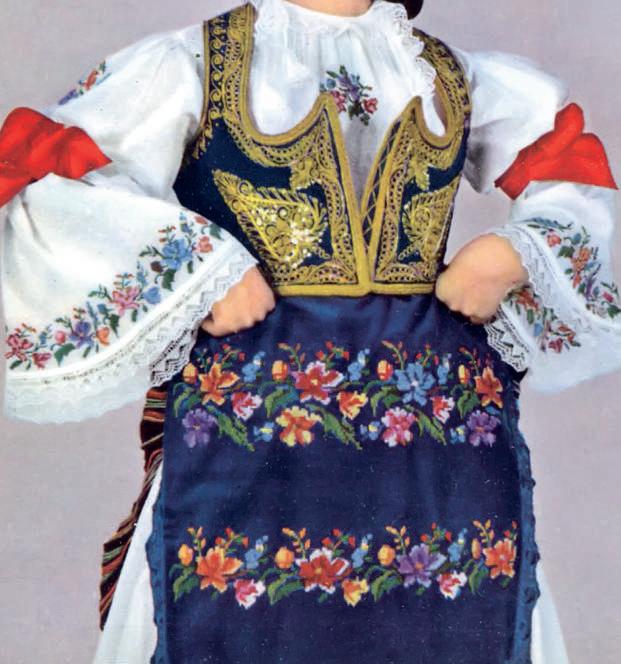

incorporating religious symbols and intricate gold-thread designs. Each region’s embroidery style tells a unique story, reflecting local history, customs, and artistic sensibilities.
One of the most striking applications of embroidery in Serbia is in traditional folk costumes, known as narodna nošnja. Embroidered clothing has long been an essential part of Serbian cultural identity, worn dur-
Serbian embroidery is not only a form of artistic expression but also a language of symbols
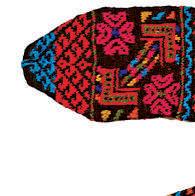





ing festive occasions, religious ceremonies, and significant life events such as weddings. Each region of Serbia has its own distinct version of folk dress, with embroidery serving as a key decorative and symbolic element.
Women’s traditional blouses, or košulja, are often adorned with elaborate embroidery around the neckline, cuffs, and sleeves. The embroidery is usually done in red, black, or dark blue thread on white fabric, creating a striking contrast. Embroidered aprons (pregače) are also a key component of Serbian folk attire, richly decorated with colourful patterns that vary from one village to another.
Men’s traditional clothing also features embroidery, though often in more subdued designs. Shirts and vests worn by men are typically embroidered along the collars and cuffs, incorporating geometric or floral patterns. Special embroidered garments were also worn during important life events, such as weddings, where brides’ dresses were meticulously embroidered with symbols of fertility, happiness, and protection.
Although industrialisation and mass production led to a decline in


hand-embroidered textiles during the 20th century, Serbian embroidery has experienced a remarkable revival in recent years. Today, many Serbian designers and artisans are incorporating traditional embroidery into contemporary fashion, blending heritage with modern aesthetics. Embroidered motifs now appear on dresses, blouses, scarves, handbags, and even footwear, making traditional craftsmanship relevant in the world of high fashion.
Several Serbian fashion designers have gained international recognition for their work in reviving embroidery. Some have reinterpreted traditional patterns in haute couture, while others have adapted them for everyday wear. Additionally, the rise of the slow fashion movement has contributed to renewed interest in handcrafted, sustainable textiles, further encouraging the preservation of Serbian embroidery.
Due to the country’s diverse landscape and historical influences, different regions in Serbia have developed distinct embroidery techniques and styles
In recent years, efforts to preserve and promote Serbian embroidery as an intangible cultural heritage have increased. Museums, cultural institutions, and folk associations have been actively documenting embroidery techniques, patterns, and their historical significance. The Ethnographic Museum in Belgrade and regional heritage centres have been instrumental in showcasing traditional embroidery through exhibitions and workshops.

Embroidery workshops and festivals across Serbia allow new generations to learn the craft, ensuring its survival for the future. Many Serbian women in rural communities continue to practice embroidery as a means of artistic expression and economic empowerment, selling their handmade textiles in local and international markets.
Serbian embroidery is more than just an art form—it is a cultural legacy that continues to evolve while staying true to its roots. For centuries, it has been a symbol of Serbian identity, reflecting the values, beliefs, and traditions of its people. While modernisation has changed the way embroidery is practised, it remains a cherished and respected craft. Today, Serbian embroidery bridges the past and present, connecting generations through needle and thread. Whether found in a carefully preserved folk costume, a museum display, or a contemporary fashion collection, this intricate art form continues to captivate with its beauty, craftsmanship, and deep cultural meaning. As long as there are artisans willing to keep the tradition alive, Serbian embroidery will remain an enduring expression of Serbia’s rich and diverse heritage.

One of Serbia’s foremost contemporary artists, renowned across Europe, his works can be found in prestigious private and museum collections around the world – in Vienna, Paris, Chicago, Prague, Belgrade, Sofia... One of his works of monumental proportions and six smaller ones form part of the permanent collection of Vienna’s Albertina Museum, which is among the world’s largest museums. Beyond the borders of Serbia (and the territory of the former Yugoslavia), he has been largely acknowledged by the Populist Project, which he favours strongly as an opportunity for experimentation. He has become an apostle of populism
Shaped by his own experiences of the Belgrade underground, rock and punk scene, he mastered conceptualism in the art of the ‘70s and is today an urban character in the public eye, a lover of films and comics, a designer, radio host, guitarist, drummer of the punk band Urbana Gerila [Urban Guerrilla], actor, football fan, analyst and much more. Uroš Đurić (1964) is famous according to the Warhol model, but is actually an au-

thentic local phenomenon, an expression of the spirit and talent of Serbia’s best face.
He has been awarded for his works of art at the October Salon, the Nadežda Petrović Memorial and the Youth Biennial, while he is also a winner of the Sava Šumanović Award, the Great Award of the Association of Independent Artists... Together with Zoran Panjković, he broadcast the last ever match of the legendary Diego Maradona on TV B92!
He is a descendant of the Đurić tribe, Kotar’s ‘Uskoks’, who joined the Venetians in May 1692 and settled on the territory of Plavno. They can also be found in Slavonia, Bosnia, the Sava and Morava river basins and in Bela Palanka. They have included numerous representatives of culture and science, members and vice-presidents of the Serbian Academy of Sciences and Arts, national representatives of Dalmatia in the organising of church affairs under Napoleon, while one of them even made it to play centre-forward for the Bosnian national team. His father was a painter, while his mother was an architect.
Starting school also implied his first formal encounter with the imposing of authority, which for him has been a serious problem ever since. History was his favourite subject. He was eight when he went to Studenica Monastery for the first time with his parents. When asked what kind of value system he grew up in and was raised under, he explains:
“I grew up as a mix of the polarities of Serbian ethnic territories. I was formed in a combination of two milieus: one based on the folk tradition, on an awareness of belonging to the community; the other in a milieu that was urban and modern in orientation. My father’s family moved from Dalmatia to Slavonia in the 19th century and established themselves there. He has been in Belgrade since 1941. My mother’s ancestors came originally from southern Serbia and were classical merchants in the best sense of the mercantile spirit, who settled in Dorćol in the early 20th century. And it was there in Belgrade that these two factions of ethnic Serbs met and were connected by strong aspirations for progress. My parents were people of a distinctly modern orientation. I was raised in accordance with Dr Spock’s book and grew up in a house that was constantly visited by a team that today represents the history of contemporary culture.”
He says that he became conscious in the late 1960s and ‘70s, and that he
couldn’t have wished for a better time to do so. This was a time marked by radical practices in the arts, the neoavant-garde, films of the new Hollywood, pop culture, the blossoming and peak of the social welfare society that had been conceived in the immediate aftermath of World War II.
“Those first 18 years of my life were spent in paradise. I went to the cinema when I was 12 to watch Rollerball and I listened to rock’n’roll, which meant that I was surrounded by art that questioned the relationship between repression and freedom in society. I grew up with the films of Bob Fosse and was 15 years old when I watched Altman’s 3 Women, Bertolucci’s La Luna, Polanski’s Tess, Wajda’s Maids of Wilko etc.”
He graduated from secondary design school, served in the army as a border guard – posted to the border between Yugoslavia and Italy, enrolled in art history studies and studied for a year, only to enrol in the Faculty of Fine Arts after returning from a short trip abroad. It is ordinary to fear entrance exams, particularly those for art colleges, but it didn’t bother him.
“The entrance exam that they had at the Faculty of Dramatic Arts was much more meaningful. Candidates there would be asked to explain their motivations, but that wasn’t the case here, so all sorts would pass. You had two days of sketching nudes, two days of drawing portraits and a day of painting still life, so what you did well would pass. That was nonsense that I opposed openly during my studies, but they immediately shut me down and I no longer spoke out.”
And then in 2024, on the occasion of the Day of the Faculty of Fine Arts, Uroš unveiled his exhibition as the premiere exhibition in the Alumni cycle of the renovated FFA Gallery, under the title Autonomism Here and Now. It marks the 13th anniversary of

Non-objective Autonomism: Murder or Two Greatest Serbian Painters Subdued by Their Own Eminence | 1997 collection Albertina Modern Wien
when he and Stevan Markuš jointly authored the Autonomism Manifesto. This was a touching moment of the return of a former student, who led the audience throughout the duration of the exhibition, but also through the space of legendary former nightclub Akademija, located in the basement of the FFA building, where he worked as a DJ during 1992/93.
A ball was the love of his childhood. His paternal grandfather had played for professional Hungarian football club Ferencvárosi prior to World War
The government doesn’t like nationally conscious people. It likes people who operate deftly within the scope of national stereotypes, and I’m not that type of guy

I, when the Hungarians were a football powerhouse. He can accurately list all the successes of the Hungary football team during the last century, not failing to mention the fact that Ferenc Puskás was one of the greatest strikers of all time. He sees football as being the greatest mirror of society, like no other sport.
“There were only Red Star fans around me in Mutapova Street and on Čubura. Rudinski’s son lived around the corner in Tamnavska Street, while Red Star and Partizan veterans would gather once a week at the Trandafilović Tavern. Seeing them there was phenomenal. They were all impeccably dressed, like gentlemen from the films of Italian neorealism. Cool, dig-
nified and self-realised people, they were impressive in their appearance. That was also how they’d played.”
It was at 2022’s 59th October Salon that he exhibited his work Pižon at Highbury 1983.
“I went to serve in the army that year, and for my generation Pižon represented a personality who accumulated within him all our wishes and projections. He was the essence of what we considered not only success in football, but also achievement in life. I found the photo that I used to paint the picture on the Arsenal fans website, where they would discuss the present and the past, but also Pižon, as one of the most misunderstood players ever, and many among them regret his early departure to this day. He is considered to have brought with him a completely new approach to football in the UK, which the sport there didn’t know how to recognise and that Arsenal only managed to apply with the arrivals of Dennis Bergkamp and Arsène Wenger, meaning that Pižon was a trailblazer who was ahead of his time.”
He received an award at his first ever exhibition: the 32nd October Salon. It was a decision that freed him of the need to make a breakthrough and enabled him to navigate the artworld
When Berlinguer died, the left in the West seemed to lose its foundational pillar
without a care and the end of the certainty of society, which I never again felt in the same way.”
As a rule, great artists know, feel and recognise the moment when they admit to themselves that they’ve finally succeeded. Uroš is convinced that his best works are yet to come, but he still looks back fondly.
“I found myself in Paris in the year 2000, for the first time after 14 years, in the city that shaped me to a great extent. I attended a school where French was the primary foreign language, and I also read comics and books in French. Then came the collapse of the country, wars, and I was gone for a long time. Thanks to the Bulgarians, who all but nurtured me as part of their own scene in the late ‘90s, I received an invitation to participate in a representative exhibition of Eastern European art. And so it was that I went to a place that I’d last been to as a student of art history, entering with a student card, and now I was exhibiting there: Jeu de Paume! I had an 18-month-old child back in the Milošević run homeland, while I have to spend the next five weeks in Paris with a group of the best Eastern European artists, because such was the programme. And I was among them. Everything seemed utterly surreal.”
with certainty and attracting greater attention from within the profession.
“There is a paradox in the fact that that October Salon was held in the autumn of 1991. Three weeks later, at dusk on 9th November, I shot the first scene for the film We Are Not Angels and my mother passed away that night. It was the end of an idyllic family life, the end of Yugoslavia, the end of strolling through the world
He didn’t represent Serbia there, but he is a representative of Serbian society, and the side of Serbia with the most modern and exclusive reach. He found himself in Warsaw for the first time in the summer of 1988 and went to the Zachęta Gallery for the Poster Biennale. It was 12 years later that he returned space for the opening of his own exhibition. When he was selected for an exhibition at Vienna’s Kunsthalle, together with Jeff Wall, David Hockney and Sonic Youth, his invasion of Austria began. And that conquest continues to this day, but that’s never really resonated with the Serbian public.
“Those kinds of things unfold best in silence. It was important to me that I can deal with something I care about, and to do so in a highly
referential way. The support I had here came from only a narrow circle of people who had at one point ploughed the field of ultra-modernity and been promptly removed. Here I’m referring to Dejan Sretenović, Lidija Merenik and the married couple the Dimitrijevićs, who worked at the Centre for Contemporary Art, and to Cultural Centre REX, which was established by Darka Radosavljević, B92, the Soros Foundation. If it weren’t for them, I’m not sure we’d even have the standards of contemporary art that we have today. None of them placed any conditions on me, particularly the eternally stigmatised Soros Foundation, with which I’ve had the best experiences.”
He says that he’s a leftist, and that the left in our country has disappeared as a political factor, which also means that it can’t be used and abused.
“I’m a nationally conscious leftist, and the government doesn’t like nationally conscious people. It likes people who operate deftly within the scope of national stereotypes, and I’m not that type of guy. I don’t have a problem either with the fact that I’m a Serb or with the fact that I viewed the world from the position of a leftist. And that doesn’t suit anyone’s model.”
He is sure that the range of Serbian culture is the only thing the Serbian state could root itself in well, but it doesn’t do so.
“It’s important today that we understand the extent to which us and our tendencies are rooted in the phenomenon of the development of the Serbian cultural identity from three or four centuries ago, when we didn’t even have a state. It was at that time that a high level of community awareness was developed and maintained, precisely through cultural and spiritual identity. This is something that’s lacking to a great extent today. We have a state, but it’s too often the case that the ruling regimes treat culture contemptuously, despite the fact that it could really repair the poor image the state has in today’s world, by pre-

senting itself through the context and range of artists.”
Speaking in an interview for the UK’s Channel 4 back in 1994, he coined the term ‘techno-feudalism’ to describe the state of global civilisation. There decades later, in 2023, famous economist and former Greek finance minister Yanis Varoufakis would author the book Technofeudalism: What Killed Capitalism.
“That was a moment when technology was advancing inexorably, while social relations were regressing. When the people’s sovereignty begins slipping away like sand in through fingers. The disappearance of the civilisational gains of socialism linked to social justice and healthcare, edu-
Yugoslavia was destroyed deliberately, and it is a lie to suggest that anyone wanted it to remain intact
cation, the right to work etc. Yugoslavia was destroyed deliberately, and it is a lie to suggest that anyone wanted it to remain intact. Despite all its shortcomings, it was a successful project; a positive role model for the majority of countries that had only liberated themselves from the shackles of the colonial powers a decade or two earlier. When [Italian Communist Party leader Enrico] Berlinguer died, the left in the West seemed to lose its foundational pillar. Many of the ideas of Eurocommunism were taken on by the right and incorporated into their concept of the European community, albeit cleansed of the impurities of leftist ideology. Instead of protecting the population, they created a trading company of enclosed protected interests.”
Uroš was recently invited to create an exhibition in the Republika Srpska city of Prijedor, in the city gallery that’s named after sculptor Sreten Stojanović, a member of the Young Bosnia movement and the brother of People’s Hero Mladen Stojanović. Uroš taught the General Art History of the Medieval Period to Sreten’s daughter Jovanka (today Maksimović) at the Faculty of Philosophy.

That offer delighted him:
“I like to work with local determining factors that are social, cultural, phenomenological, because to me it’s important that my work makes reference to the community. I thus connected this entire exhibition to Sreten Stojanović. That’s particularly important to me in these revisionist times. Sreten and his brother Mladen spent three years in prison as high school pupils, as members of Young Bosnia, and afterwards Sreten received a scholarship from Dr Đurica Đorđević and his wife Krista to study abroad, initially in Vienna and then in Paris. His life served me as motivation for my creative manoeuvres.”
He says that his paintings are today sold literally as archaeological works, with buyers requesting works from 20 years ago that are no longer included in the offer.
“I offer them new ones, which they are never interested in, and it’s been like that for 35 years already.”
Responding to the question of whether there’s any painting that he would really love to buy, he answers: “Maybe some of my own pictures. I don’t know if I’d be able to paint them again, so I’d like to have them as an echo of the era in which they were created.

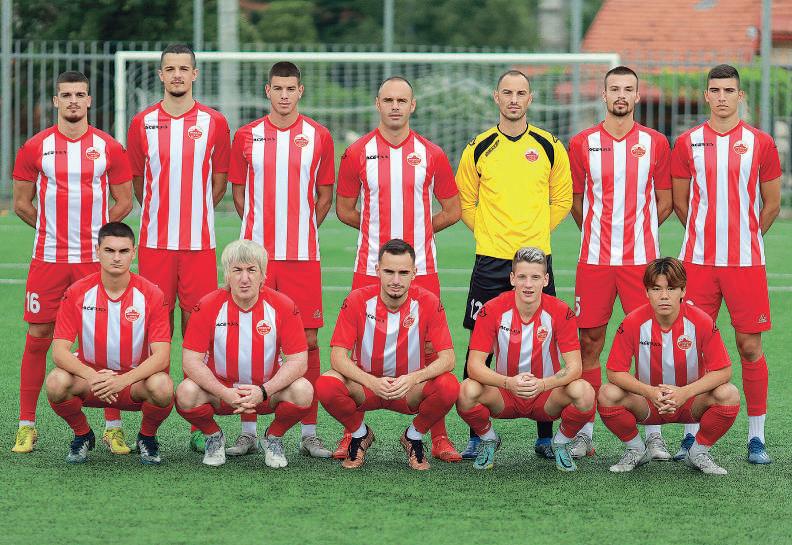
I would like a Basquiat or Dobrović sketch, one of those pieces from his post-cubist period while he was still in Hungary.”
He is reluctant to talk about his own place in contemporary European art, but he’s able to describe surreal moments like when great world curator and collector Harald Szeemann (19332005) came to his house, or when he met René Block (1942) in Belgrade.
“I gained experience dealing with authority figures as a child. I observed that those who were a greater authority tended to be simpler as people. That’s also how Harald Szeemann rang my doorbell at 13 Mutapova Street, where I was then living, entered the flat and processed to chat with me for two and a half hours. He selected the works that are today at the Albertina. That’s the same Szeemann who’d previously worked on two consecutive Venice Biennales at the turn of the millennium... A few months later, I was sitting in Pevac [restaurant] with René Block, who made Beuys what it is today, dis-
God
The ruling regimes too often treat culture contemptuously
cussing which work I would do for an exhibition at the Kunsthalle Fridericianum in Kassel, which hosts the Documenta exhibition that he directs. Those are situations when you really think the sky’s the only limit! And then the wind changed, and in that very same year they assassinated Đinđić and reestablished neoconservatism and false traditionalism, like some thread from the mid-‘80s snapped accidentally and sent you back to where you were all along, where everything you do is more or less your own private matter.”
He nonetheless can’t do without what we have here, whatever it might be like. He considers everything he does as an author as being a kind of drama. And that drama can only be resolved at its source. He mentions Wassily Kandinsky who, like him, was born on 4th December, and who lived in Germany prior to World War I and was relatively well-off, and yet still chose to return to Russia. Why?
“That’s not patriotism in the vulgar sense; it’s a cry from within that tells you that you should go where you were shaped as a personality, where you want to contribute to the creation of a better society.”
Australia closely monitors a fleet of Chinese military vessels navigating its coastal waters. The task group, comprising the frigate Hengyang, cruiser Zunyi, and replenishment vessel Weishanhu, has been operating near Australia’s maritime boundaries. While these ships adhere to international law, their presence is considered atypical. The Australian and New Zealand navies are jointly tracking the fleet’s movements. Additionally, a recent incident involved a Chinese fighter jet releasing flares near an Australian patrol aircraft, raising safety concerns.

On Christmas Eve, an exceptionally rare split-colored lobster, dubbed Arnold Clawmer, was discovered at a grocery store in Milbridge, Maine. Displaying a unique half-red, half-mottled brown shell, this anomaly occurs in just 1 in 50 million lobsters due to genetic fusion. Initially placed in a touch tank at Bar Harbor’s Oceanarium, Arnold was moved to the Shaw Institute Environmental Education Center. Interestingly, Arnold uses his left crusher claw to feed, a trait uncommon among lobsters.

A seldom-seen marine animal baffled locals when it washed ashore on a Queensland beach in Canada. Gold Coast resident Celina discovered the peculiar fish during a morning walk and sought identification assistance online. Experts identified it as a Hairtail Blenny, characterised by its large eye and elongated body. Though not rare, this nocturnal species often goes unnoticed due to its elusive nature. The fish likely ended up on the beach due to illness or injury.

A rare mini-earthquake measuring 1.6 on the Richter scale shook the Bandon area in County Cork, Ireland. Residents reported homes trembling and a booming noise reminiscent of thunder. The earthquake’s epicentre was located between Bandon and Crossbarry at a depth of 1 km. Such seismic events are uncommon in Cork, with the last notable occurrence in 2013. Typically, Ireland experiences minor earthquakes annually, predominantly in Donegal and Wexford.

A rare rabbit-like creature at a rescue centre has amazed staff and visitors with its distinctive vocalisations. Unlike typical silent counterparts, this animal emits unique sounds, adding to its charm and highlighting the diversity within its species. Such rare traits underscore the importance of wildlife conservation and the wonders of nature. The rescue centre continues to study and care for this extraordinary animal, drawing attention to its unusual characteristics.

Customers at a Bunnings store in Albany, Western Australia, were taken aback when a kangaroo bounded through the outdoor furniture section. The marsupial entered via the drive-through area shortly after opening and was gently guided out by staff. The incident, capturing over 45,000 online views, sparked discussions about habitat loss for native wildlife. Wildlife organisations highlight that such encounters are increasing due to urban development encroaching on natural habitats.

From the ultimate restaurant connoisseur to the masterful dinner party host or the proud collector of fine wines, our curated selection of gourmet gifts and indulgent hampers is designed to delight every discerning palate
Marcato
Square Ravioli Stamp
The first step to being your best self in the kitchen is investing in the necessary tools, one of which is this square ravioli stamp













P2 Plénitude Brut Rosé 2000 (75cl) - Champagne, France
Dom Pérignon Rosé in its P2 version is particularly rare, with the 2000 vintage marked as unparalleled, intense and flavourful without ever feeling heavy

x Matthew Williamson Loose Leaf Tea Gift Set (225g)
It comprises three caddies of loose-leaf tea: Jasmine Rose Garden, Exotic Earl Grey and Maharaja’s Breakfast, each of which pours with an exquisite quality that’ll leave you wanting more

























The True Honey Co
500+ MGO Manuka Honey (250g)
This deep golden honey produced in New Zealand has a dense caramel texture and bittersweet flavour


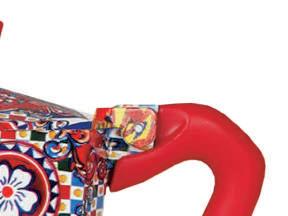
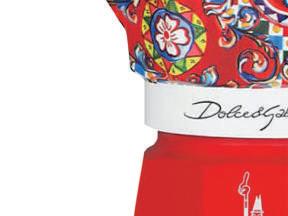

This vibrant iteration of the legendary stovetop design showcases a statement tile print that’s exemplary of the ready-to-wear label’s maximalist style

24 Karat Gold Instant Coffee (100G)
The edible gold increases its antioxidant effect, rejuvenating the body while the delicate velvet taste with fruity notes and a lasting aftertaste makes for a truly luxurious experience








Harrods Global Explorer Fudge Selection (195g)







Presented in an elegant box, each piece is beautifully decorated to ensure it’s just as pleasing to the eyes as it is on the palate


Hibiki Japanese Harmony Whisky (70cl)



Whether enjoyed neat, on the rocks, blended with water or mixed as a cocktail, the harmony of this blend remains complete











Luxury Chocolate Covered Nut Selection (960g)
From sun-ripened Californian almonds lavished with thick milk chocolate and a light dusting of cinnamon to roasted pistachio kernels enrobed in velvety dark Belgian chocolate, there’s something for everyone

x NBA X.O Limited Edition Cognac (70cl)





Bold, complex blend the label is renowned for, first created in 1870 by third-generation Master Blender, Emile Filioux
12 March – St Sava Sqare, Užice

Amira Medunjanin, a world-renowned interpreter of Sevdalinka and traditional music from our region, will hold seven concerts in Serbia, organised by the production company Long Play, to promote the current album “Homeland.”
22 March - Kolarac Endowment
Kolarčeva zadužbina, in collaboration with RTS Music Production and the Embassy of Hungary, announces a Gala Concert featuring the RTS Symphony Orchestra, world-renowned opera singer Katarina Bradić, and Budapest-based conductor Balázs Kocsár. The program will include Bartók’s Two Pictures for Orchestra and Concerto for Orchestra, along with Elgar’s Sea Pictures.
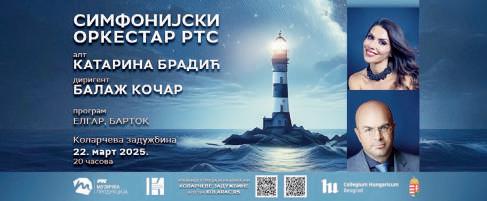
13 March – Dom Omoadine
Mary Coughlan, one of Ireland’s most celebrated jazz and blues singers, will perform in Belgrade for the first time at Dom omladine on March 13th as part of the 13th Belgrade Irish Festival. With a career spanning over four decades and 16 albums, she is known for her deeply emotional interpretations and a style influenced by Billie Holiday, Bessie Smith, and Edith Piaf. Her latest album, Repeat Rewind (2023), revisits some of her most powerful songs while introducing fresh interpretations. The Belgrade audience can expect a captivating mix of timeless classics, new material, and a few surprises. Beyond music, Coughlan’s life story of resilience and reinvention adds unmatched authenticity to her performances.

23 March – Sava Centar, Belgrade

The legendary Gipsy Kings are coming for an unforgettable night of music and passion! Get ready to experience their iconic fusion of flamenco, salsa, and pop as they bring their world-famous hits to the stage. Don’t miss this electrifying performance—secure your tickets now.

Holly Golightly is a glittering socialite mover and shaker: generally upwards, sometimes sideways and, every now and then, down. She’s up all night drinking cocktails and breaking hearts. She’s a shoplifter, a delight, a drifter, a tease. In short, an icon.


David J. Schwartz
The Magic of Thinking Big gives you useful methods, not empty promises. Dr. Schwartz presents a carefully designed program for getting the most out of your job, your marriage and family life, and your community. He proves that you don’t need to be an intellectual or have innate talent to attain great success and satisfaction, but you do need to learn and understand the habit of thinking and behaving in ways that will get you there.
Isabel Berwick
This modern guide to the world of work can be used by everyone—both employed and self-employed, anyone working in new hybrid working practices, or the many individuals who set up on their own after the pandemic and are navigating a new way of working. The book is split into two sections: Staff and Managers.

Taking us to the heart of the latest thinking about AI, Max Tegmark, the MIT professor whose work has helped mainstream research on how to keep AI beneficial separates myths from reality and utopias from dystopias to explore the next phase of our existence.


Rachel Parton George, Dolly Parton
In Good Lookin’ Cookin’, Dolly and Rachel share tips for hosting events all year, including twelve multi-course menus of cherished recipes for New Year’s Day, Easter, Mother’s Day, Thanksgiving, Christmas, and more. You’ll learn how much butter or whipped cream goes into a “Dolly Dollop,” what condiment is almost always on the table at Parton family meals, and what special dish Rachel makes at Dolly’s request every year for her birthday.

Billie Holiday
Her memoir tells the story of her life spent in jazz, smoky Harlem clubs and packedout concert halls, her love affairs, her wildly creative friends, her struggles with addiction and her adventures in love. Billie Holiday is a wise and aphoristic guide to her unforgettable life story.

The Serbia-Italy Business Forum in Belgrade brought together more than 500 companies and their representatives from nearly all sectors, highlighting the strong economic ties between the two countries. The event, attended by Serbian President Aleksandar Vučić and Italian Deputy Prime Minister and Foreign Minister Antonio Tajani, featured over 500 bilateral business meetings. Sectoral panels focused on key topics such as circular economy, energy transition, sustainable agriculture, Industry 5.0, and physical and digital infrastructure. The forum reaffirmed the commitment of both nations to furthering economic cooperation and innovation.
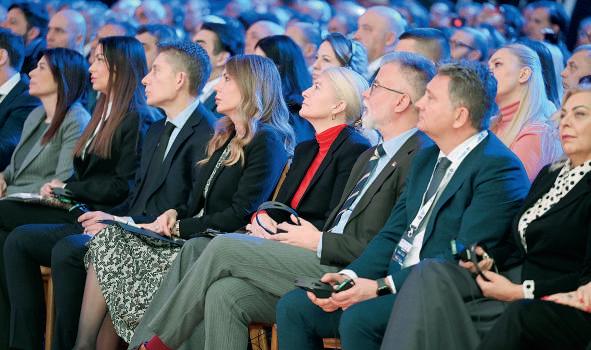
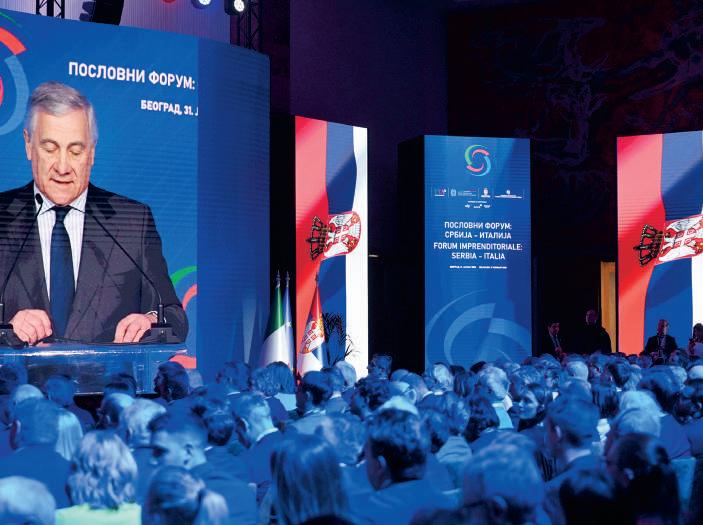

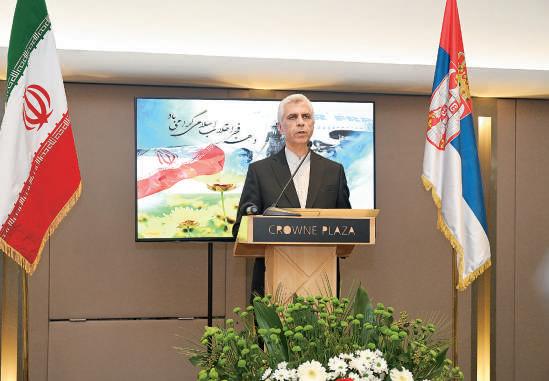
6/2/2025
The Embassy of Iran in Belgrade hosted a reception to mark Iran’s National Day, bringing together diplomats, officials, and distinguished guests. The event was led by Mr Mohammad Mahdi Abadi, Counsellor and Chargé d’Affaires a.i., who welcomed attendees and highlighted the significance of the occasion. In his speech, he emphasised Iran’s rich cultural heritage and the strong diplomatic ties between Iran and Serbia.


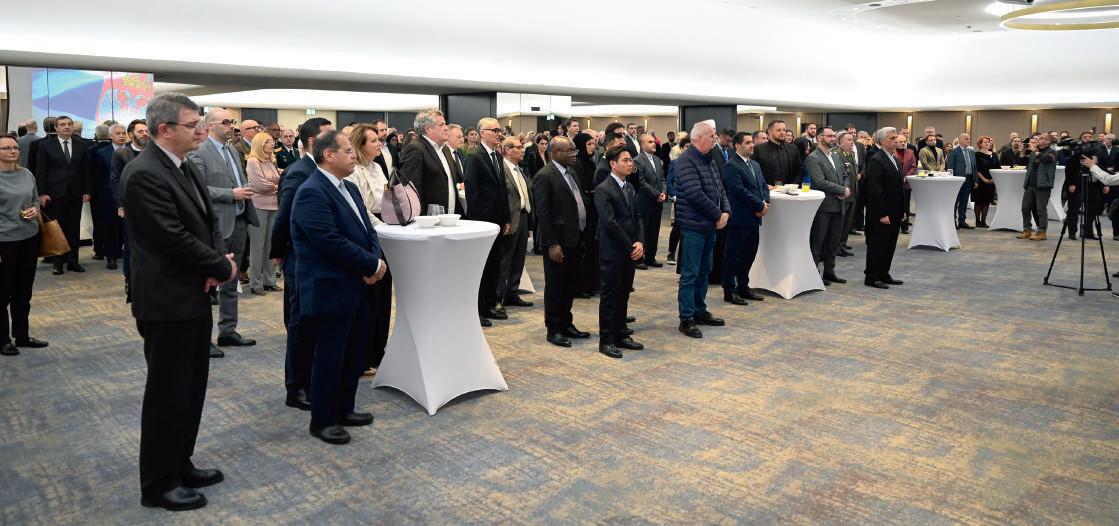
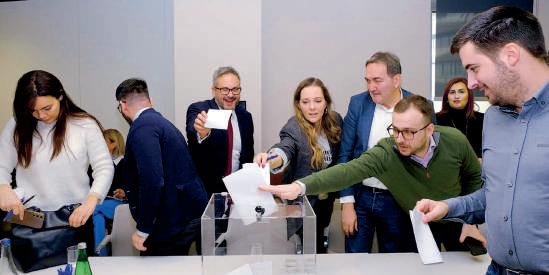
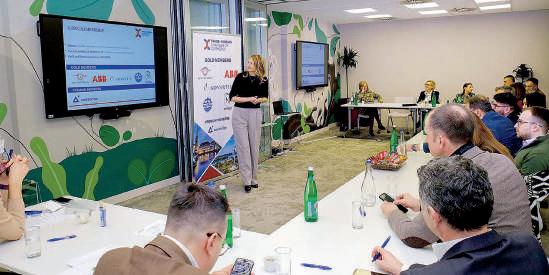
6/2/2025
The General Assembly of the Swiss-Serbian Chamber of Commerce was held at the premises of the member company Nestlé. Following the welcoming speech by Marjana Davidović, CEO of Nestlé Adriatic, the Assembly members voted and elected the following Board members: Ivan Kovačević, CEO of Codetribe, Edin Dacić, President of the Assembly of Standard Furniture Serbia d.o.o., Bojan Pavlović, Director of Phytonet d.o.o., and Jelena Drakulić Petrović from Ringier Srbija. The Assembly, which was attended by H.E. Anne Lugon-Moulin, Ambassador of Switzerland in Belgrade, adopted the action plan and financial reports of the Swiss-Serbian Chamber of Commerce.
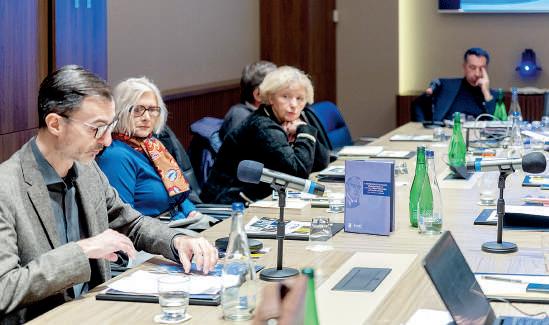
18/2/2025
Researchers presented the findings of the three-year project “Cultural Transfer Europe-Serbia from the 19th to the 21st Century” at Belgrade’s Hotel Savoy. Funded by the Science Fund of Serbia, the project explored European cultural influences on Serbian society. Led by Prof. Slobodan G. Markovich, it resulted in three published collections of papers, with a final volume, “Serbia and the Balkans: Three Centuries of Embrace with Europe,” set for release. All publications are open access.
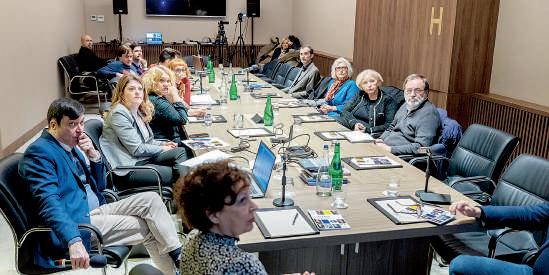
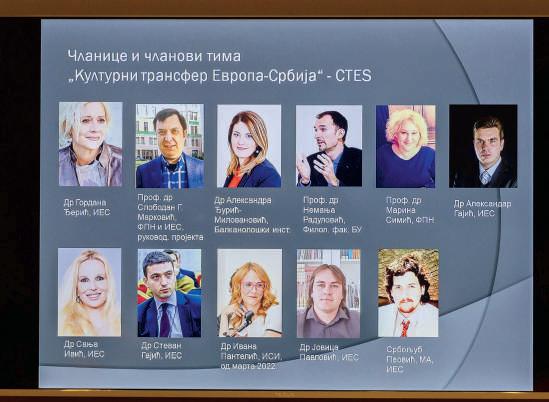
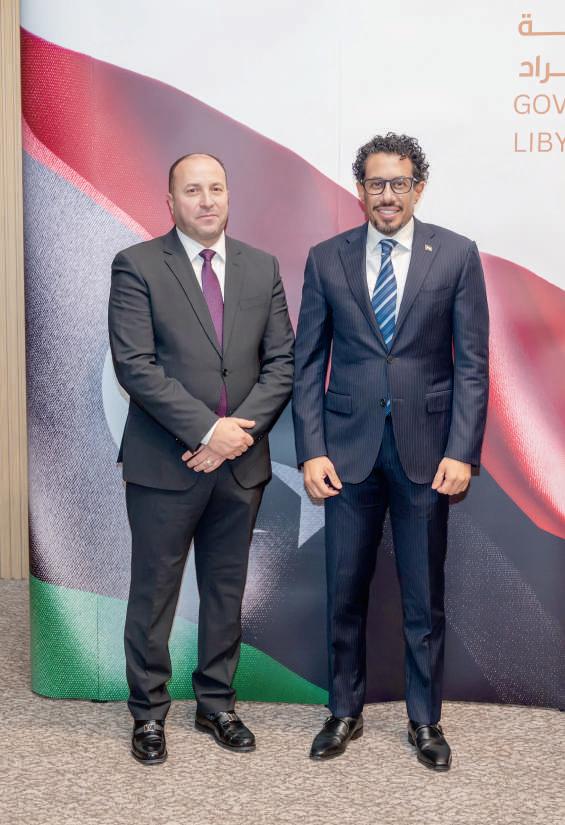
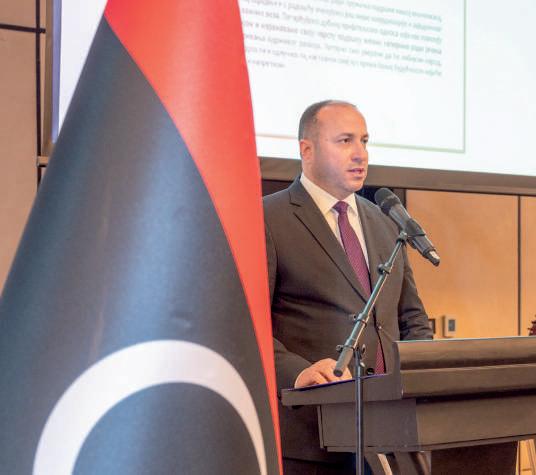
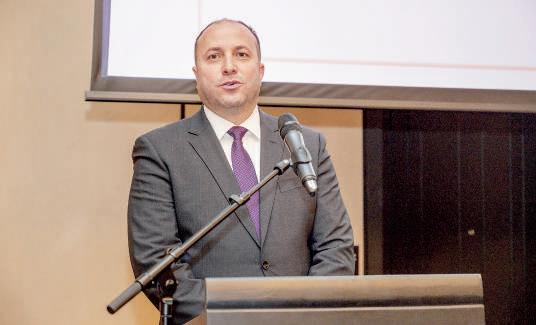
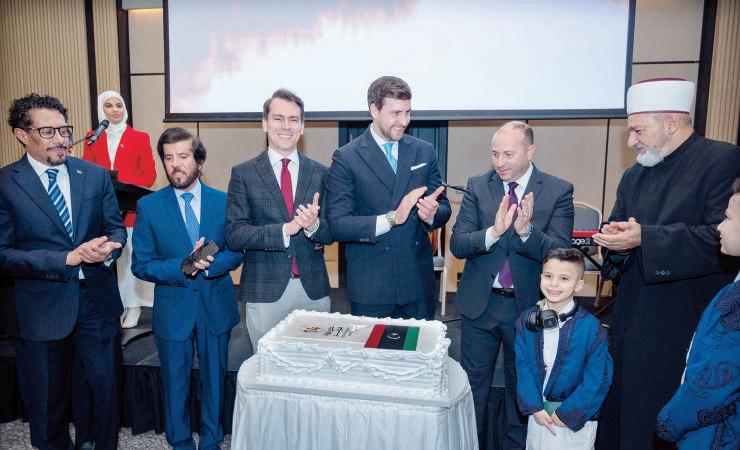
19/2/2025
The Embassy of Libya in Serbia hosted a reception to celebrate Libya’s National Day at the Hilton Hotel in Belgrade. The event brought together diplomats, government officials, and members of the business and cultural communities, reflecting the strong ties between Libya and Serbia. Ambassador Mohammed Galbun welcomed guests with a speech highlighting Libya’s progress, its bilateral relations with Serbia, and opportunities for future cooperation.
23/2/2025
A farewell reception was held in Belgrade to honour H.E. Mochammad Chandra Widya Yudha, Ambassador of Indonesia, as he concluded his diplomatic mission in Serbia. The event gathered diplomats, government officials, and friends who expressed appreciation for his efforts in strengthening Indonesia-Serbia relations. In his farewell speech, Ambassador Yudha reflected on the strong bilateral ties and shared gratitude for the warm hospitality he received. The evening was filled with heartfelt moments, marking the end of his tenure and celebrating the enduring friendship between the two nations.

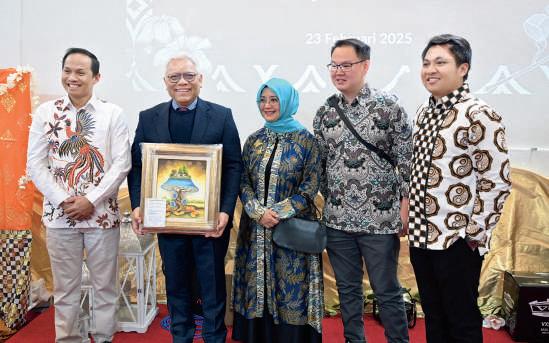
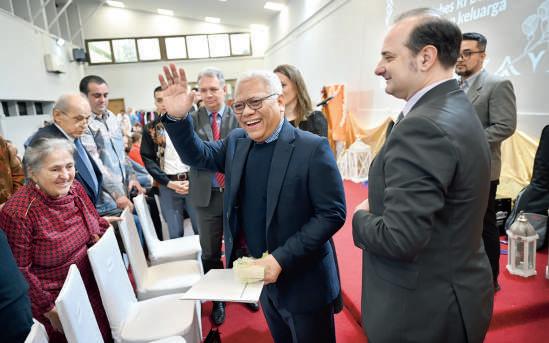
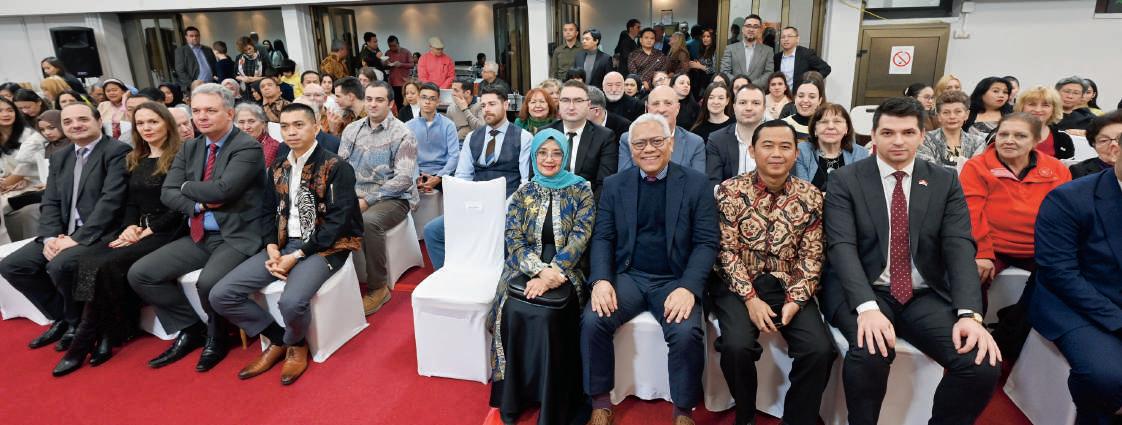














Discover the all-new Volvo XC90, now available with a petrol engine or plug-in hybrid powertrain. Designed to impress with cutting-edge technology, 7-seat comfort, top-tier safety and unmatched refinement— Swedish luxury at its finest Drive away in the new, even better Volvo XC90 starting from 65.990 €.
Check out our outstanding Volvo XC series models available from only 299 € per month* and stock vehicles, ready for immediate delivery.
Uncompromising quality. Irresistible offers. Don’t miss out—secure yours today!